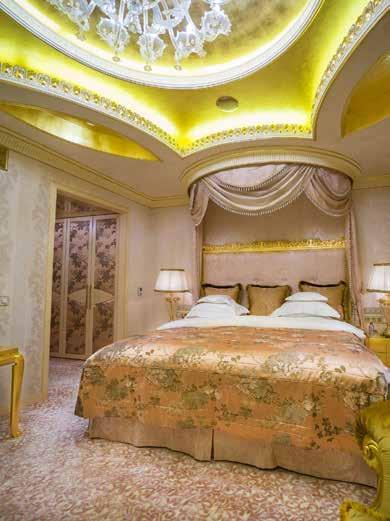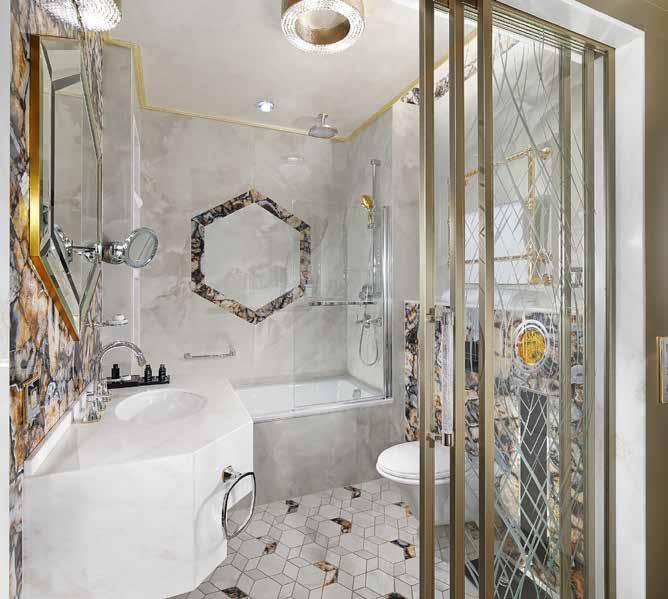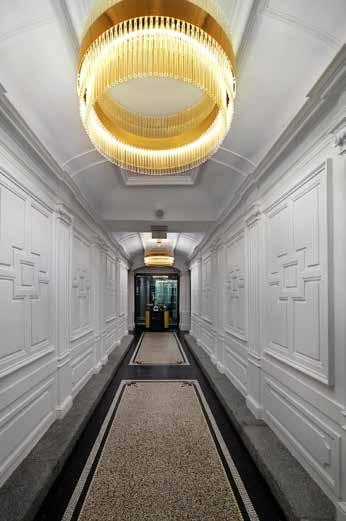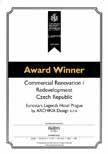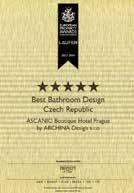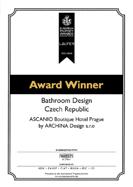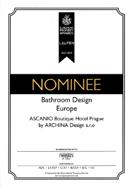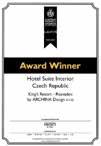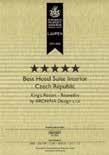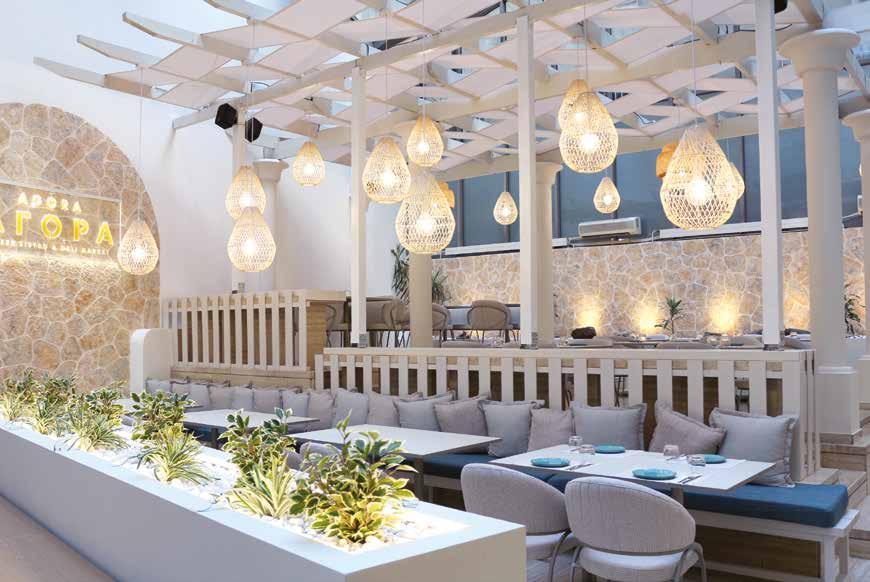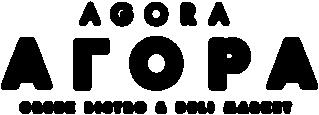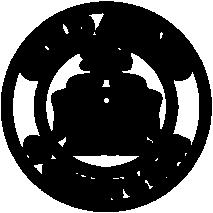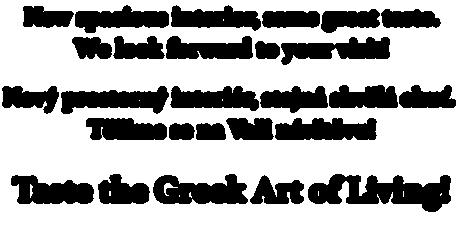The colours of Asia shone in Prague





4 Interview with H.E. Mr. Bijan Sabet, Ambassador of the United States of America
Czech tech entrepreneurs remind me of Silicon Valley
14 Interview with H.E. Mr. Alexis Dutertre, Ambassador of France
Our nations need a stronger and less naive Europe
20 Interview with H.E. Mr. Gansukh Khashkhan
Damdin, Ambassador of Mongolia
Welcome to Mongolia – a country of eternal blue sky
26 Interview with H.E. Ms. Suzilah Binti Mohd Sidek, Ambassador of Malaysia Malaysia is truly Asia
32 Interview with H.E. Mr. Mahmoud Mostafa Afifi, Ambassador of Egypt
Our civilization is ancient, and modern too
36 Interview with JUDr. Vitalii Usatyi, Chargé d’Affaires a.i. of Ukraine
They will never break our spirit
45 Interview with Michal Broža, Head of the United Nations Information Centre Prague
Some problems do not respect national borders
56 Interview with Jindřich Fryč, Chief State Secretary for the Civil Service
A well-functioning state needs high-quality civil servants
64 Interview with Michal Krejsta, CEO of Lexum When I see a real, happy patient, I find it immensely satisfying 68 Interview with Jakub Stárek, Mayor of Prague 6 My father was my inspiration
72 Interview with Pavla Niklová, new director of the Jewish Museum in Prague Our mission is a never-ending process 75 Interview with Jan Herget, CEO of CzechTourism We got back to the 2019 record
92 Interview with David Pátek, Founder and CEO of Neeco Group
We develop our own vacation properties
30 Alexa Wandersee: Becoming an Ambassador for a Day at the Canadian Embassy in Prague
42 GR1T: Uncharted territory awaits – new pioneers are emerging
50 Karen Hendriks: How I managed to put the pieces of a puzzle together
78 Alexa Wandersee: The other side is just the other side
82 Shahzad Aryobee, Ambassador of Afghanistan in Prague: Culture, Language, and Diplomacy (Position of Afghanistan)
8 247th Anniversary of the Independence of the United States of America
16 National Day of France at the gardens of Prague Embassy
54 Republic of Iraq special folklore music event
60 Connected for a better future: Southeast Asian Nations jointly celebrated in Prague
84 78th Anniversary of the National Day of Vietnam
88 Leading Minds Forum 2023
96 Thailand and the Czech Republic: a partnership for development in the making
13 Expelled from paradise
H.E. Mr. Gregoire Cuvelier, Ambassador of Belgium
19 Irish and Czech people are a great fit
H.E. Ms. Cliona Manahan, Ambassador of Ireland
25 A bitter moment – the departure
H.E. Mrs. Leonora Rueda, Ambassador of Mexico
35 Thank you for the positive memories
H.E. Mrs. Phasporn Sangasubana, Ambassador of Thailand
Benke Aikell – Founder | Eva Anderová & Meshulam Zisso – Owners & Executive Editors | Petra Kubernátová – Webmaster | Martina Hošková – Edit & Translation | Šárka Čičková – Graphic Design | Publisher PRIME (1998) s.r.o, Olgy Havlové 2914\52, 130 00 Žižkov - Prague 3, IČ: 25682784, DIČ: CZ25682784, e-mail: info@czechleaders.com, www.czechleaders.com | Czech & Slovak Leaders, Olgy Havlové 2914\52, 130 00 Žižkov - Prague 3, email: info@czechleaders. com, www.czechleaders.com | Licence: MK ČR E 13147 | No reproduction is permitted in whole or part without the express consent of Czech & Slovak Leaders | The advertiser is responsible for the advertising contents | Opinions expressed in this publication are those of the authors or persons interviewed and do not necessarily reflect the views of the editors or Czech & Slovak Leaders | All editorial material and photos in Czech & Slovak Leaders Magazine is digitally stored and may be republished by Czech & Slovak Leaders either in printed form or in various digital media | All correspondence to Czech & Slovak Leaders Magazine may be published.
Ambassador of the United States of America, H.E. Mr. Bijan Sabet, the son of immigrant parents who moved to the United States in pursuit of the American dream, presented his credentials to President Pavel in February of this year. “I see huge opportunities for Czech startups. In many ways, it reminds me of Silicon Valley with regard to the level of ambition and the diversity of different projects,” asserts the Ambassador on the topic of successful entrepreneurship. Why should we regard this opinion with utmost seriousness? What did four of Ambassador Sabet’s predecessors share with him? And which of Václav Havel’s words did he share with us?
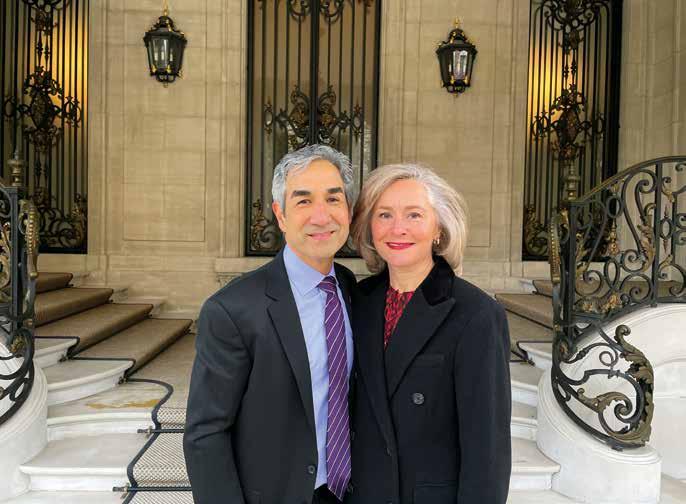
I was born in New York, the son of immigrant parents who moved to the United States in pursuit of the American dream. My father was born in Iran, where he completed medical school before moving to the United States for his residency in the late 1960s. There he met my mother, another young doctor who had recently immigrated from South Korea. Both became U.S. citizens as soon as they could and taught me the values
of freedom, democracy, and love of country. I studied in Boston, and have spent most of my professional life supporting entrepreneurs to build new markets and create tens of thousands of jobs. The first ten years of my career I worked as an executive in the tech sector in both Silicon Valley, California and Boston, Massachusetts. In 2005, I co-founded Spark Capital, a venture capital firm that backed numerous now-iconic startup companies including Twitter, Slack, Oculus, and others.
And most importantly, I am joined here in the Czech Republic by my wife and soul mate, Lauren, and our dog Sam. Lauren and I have three children who are currently students in the United States but enjoy their regular visits to us here in the Czech Republic.
What persuaded you to become the Ambassador to the Czech Republic?
When I was informed that President Biden intended to nominate me as Ambassador to the Czech Republic, I could not have been more thrilled. Following my nomination last August and confirmation by the Senate, I took the opportunity to meet with the previous four U.S. ambassadors. Two were nominated by Republican presidents, two by Democratic presidents. Although they each lived here at a different time, they all had similar experiences. They shared how they remember their work in the Czech Republic with great fondness. They all said that these were the best years of their professional lives. They remembered such small ordinary stories, anecdotes, places, restaurants, and so on. They also encouraged me to travel outside of Prague, so I decided to take that advice to heart and whenever I can I visit other regions. I was sworn in as Ambassador in December 2022 and presented my credentials to President Pavel on February 15th, 2023. I had the highest expectations, but the reality so far has absolutely exceeded them. This job is the honor of a lifetime, and I’m just grateful to spend these years building ties between the American and Czech people.
It’s still quite a short time since you arrived, however, have you collected some anecdotes of your own yet? I got some good tips on where to go and what to do on social media. And my wife is an avid traveler and comes up with her suggestions. My biggest hobby is photography, so I want to see and capture as much as possible. I am working with my team to achieve my goal to visit every region of the Czech Republic. In my first six months as Ambassador, I have already visited seven regions. Let’s see how quickly I get to the remaining seven!
Being the U.S. Ambassador in the Czech Republic truly is the honor of a lifetime. It is such a privilege to work sideby-side with all my devoted colleagues at the U.S. Embassy and, of course, our good friends and allies here in the Czech government, business community, civil society, and across the country. I am now half a year into my time as Ambassador, and I would say one challenging thing is that I want to say “yes” to every meeting and event I am invited to. I love the work I do, and the important work we are doing together at the U.S. Embassy. I truly want to
connect with as many Czechs as I can, from all regions of the country and all walks of life. Given the real depth of the U.S.-Czech relationship, we get so many invitations that I just am not able to attend them all, so I have to make very tough choices about where to spend my time.
You mentioned taking photographs, is that what you do in your free time?
I love photography! I’m kind of obsessed with old film cameras. I like to shoot in black and white and on old 35mm and medium format films. Everything is manually operated, no batteries. It is a much more creative and fun process. I started taking pictures when my children were young, which is not an uncommon scenario. It was like having access to a time machine and being able to go back and see my children grow again. When they were older, we started traveling more, and I was still taking pictures. Here in the Czech Republic, there are many beautiful places and amazing people to photograph. Taking portraits of people I meet on my travels is a fantastic icebreaker and a great way to just hear about their lives and opinions.
As a co-founder of Spark Capital, you focused on helping technology entrepreneurs reach their potential and build influential global companies. Can you advise Czech companies on doing the same? Since my arrival, I’ve had many opportunities to meet with local entrepreneurs across the country. This past spring we held a competition for female startup founders at the American Embassy. After each of my meetings, I was left in awe of the energy and dynamism present here.
I’ve said it before, but I see huge opportunities for Czech startups. In many ways, it reminds me of Silicon Valley with regard to the level of ambition and the diversity of different projects. Artificial intelligence, climate, nanotechnology – Czech tech entrepreneurs are doing amazing things!
And I am excited that U.S. businesses and innovators continue to be the partners of choice for Czech entrepreneurs. In May, I hosted the U.S.-Czech Business Forum where I highlighted the business connections between our countries and provided a space for innovators from both of our countries to learn from each other. As President Biden says, “the United States is open for business.” And that is not just talking about exports or investments. It means we want to be partners. Our countries share a vibrant and innovative start up scene. As good as we are individually, I am convinced that we are better together.
The Defense Cooperation Agreement was approved by Parliament on July 19th, signed by President Pavel on August 1st, and by Prime Minister Fiala on August 16th.
Is this one of those situations where we are better together?
We welcome the signing of the U.S.-Czech Defense Cooperation Agreement (DCA), its quick approval by parliament, and recent completion of the ratification process with the signatures of President Pavel and Prime Minister Fiala. This is a strong symbol of our commitment to strengthen the strategic U.S.-Czech defense partnership. And that is exactly what the DCA allows us to do. The agreement strengthens our ability to face common security challenges, improves our joint defense readiness, and makes our already excellent defense ties within NATO and bilaterally even stronger.
The United States has a lot to offer to Czech travelers. How do you promote your country?
I’m in a fortunate position as the United States usually promotes itself pretty well! American popular culture is pretty ubiquitous, and as you noted, we are indeed
a pretty big holiday destination for Czechs. That being said, there is so much more to America than what we see in the media. Our size and diversity means there is always something new to discover in America – whether your interests are national parks, arts and culture, shopping, or museums, we really do have it all. Just as I am trying to visit all the regions around the Czech Republic, I would encourage Czechs to see more of America than just the big cities. You will find amazing people, food, culture, etc. in every corner of America! The Embassy is organizing a U.S. Destination Showcase in October that will highlight numerous attractions and locales to Czech travel agents, tour operators, and travel media. I am looking forward to networking at this event with others who love to travel!
What is the current status of Czechia – USA relations?
The Czech Republic and the United States have long had an excellent relationship; this is a history I’m sure I do not
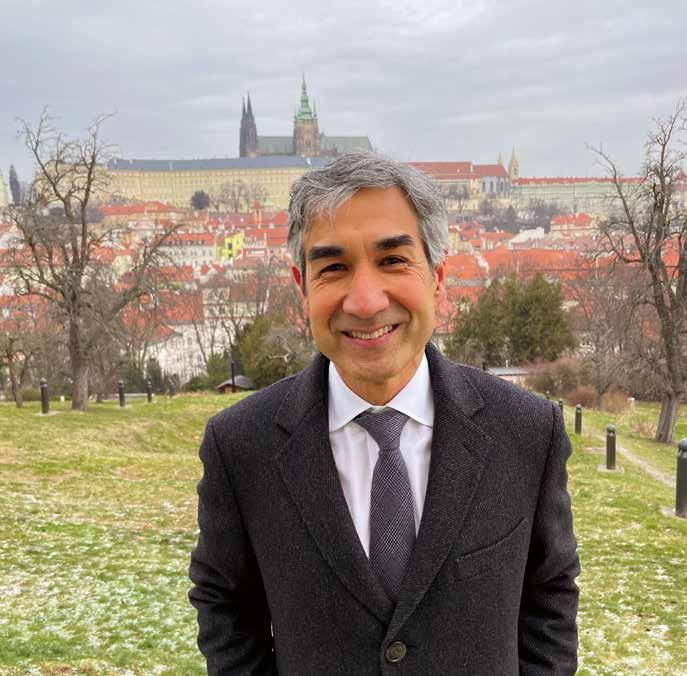
need to tell your readers. We have long been key allies. Building on that strong history, I keep hearing at meetings with senior leaders from both our countries that U.S. Czech relations have never been better. And this robust partnership is something I experience daily in my interactions with Czechs from all walks of life. We have a great friendship, and my task is to keep strengthening it. I want to focus much of my time here on getting to know diverse groups and strengthening our people-to-people ties, especially with young people – the future world leaders. I want to continue to enhance U.S.-Czech relations with those emerging voices and promote our mutual values centered on diversity, democracy, and human rights.
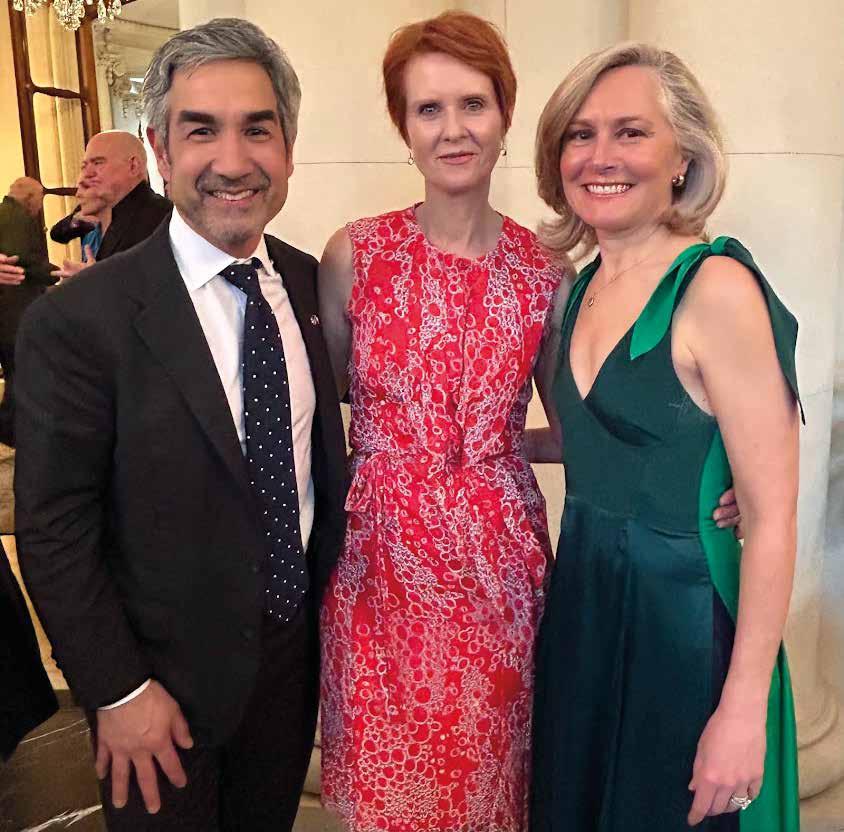
This interview is done on the occasion of your national day. Do you have a wish for your country? And for Czechia?
As I shared during my remarks, I am proud to not only celebrate our independence, but also the values that
our two countries share. A shared commitment to freedom, democracy, justice, equality, and equity. And more importantly than just a belief in these ideals, our shared commitment to making those ideas real. As Václav Havel once said: “Vision is not enough; it must be combined with venture. It is not enough to stare up the steps; we must step up the stairs.” Both of our countries have come so far, but there is still work to do – for example, toward ending gender-based violence or ensuring people have the same rights and opportunities regardless of who they love or how they look. It’s a duty and a privilege to continue scaling those “stairs” together with my American colleagues and Czech friends as we seek to live up to our ideals.
On the occasion of the 247th Anniversary of the Independence of the United States of America,
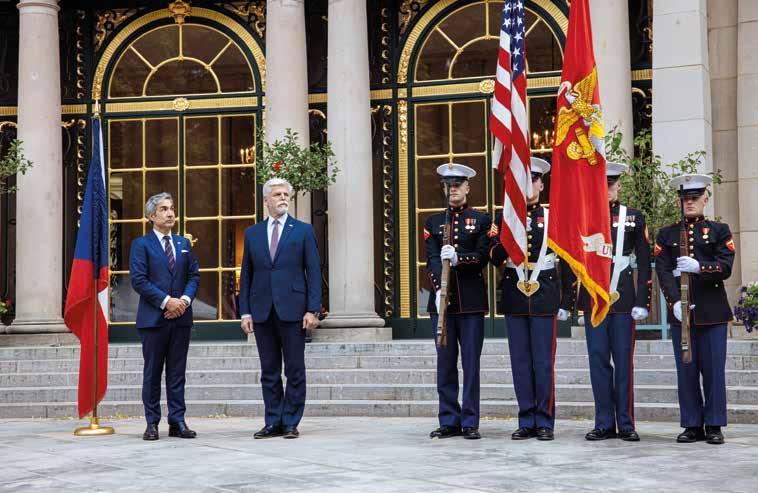
President Pavel, Senate President Vystrčil, Distinguished guests.
Thank you for joining me – along with my wife, Lauren, and our children – to celebrate the 247th anniversary of the United States of America’s independence.
To me, what makes this occasion so special is that it is not just about how we celebrate. Sure, we Americans love an excuse to throw a backyard party and grill up some burgers. But it is about what we celebrate: a shared commitment to freedom, democracy, justice, equality, and equity. And in that regard, our
two countries could not have more in common. It’s not just a shared belief in lofty ideas. It’s a shared commitment to making those ideas real.
You see, Independence Day – in its essence – is a celebration of our continuing effort to form a more perfect union. Freedom is not just something we earned in 1776 or 1989 – on July 4th, or November 17th, or any other day. It’s something we have to reaffirm, day after day, year after year.
As Václav Havel once said: “Vision is not enough; it must be combined with venture. It is not enough to stare up the steps; we must step up the stairs.” And for so much of our histories, Americans and Czechs
Text: M. Zisso; Photo: Lukáš Bíba H.E. Mr. Bijan Sabet, Ambassador of the United States of America hosted a special reception at his beautiful Prague residence. Experience the all-American atmosphere of the event through our photo reportage and selected parts of Ambassador´s welcome speech. H.E. Mr. Bijan Sabet, Ambassador of the United States of America and Petr Pavel, President of the Czech Republic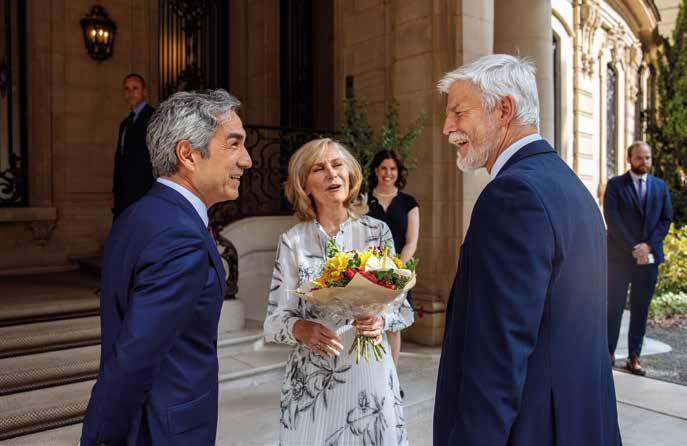
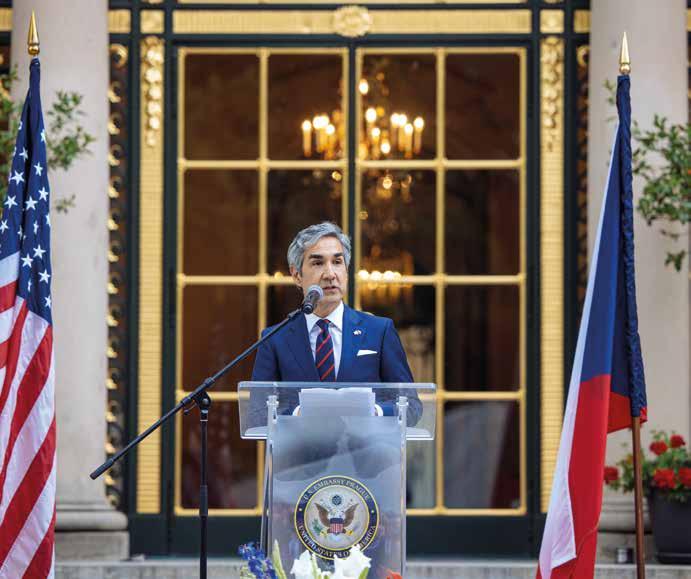
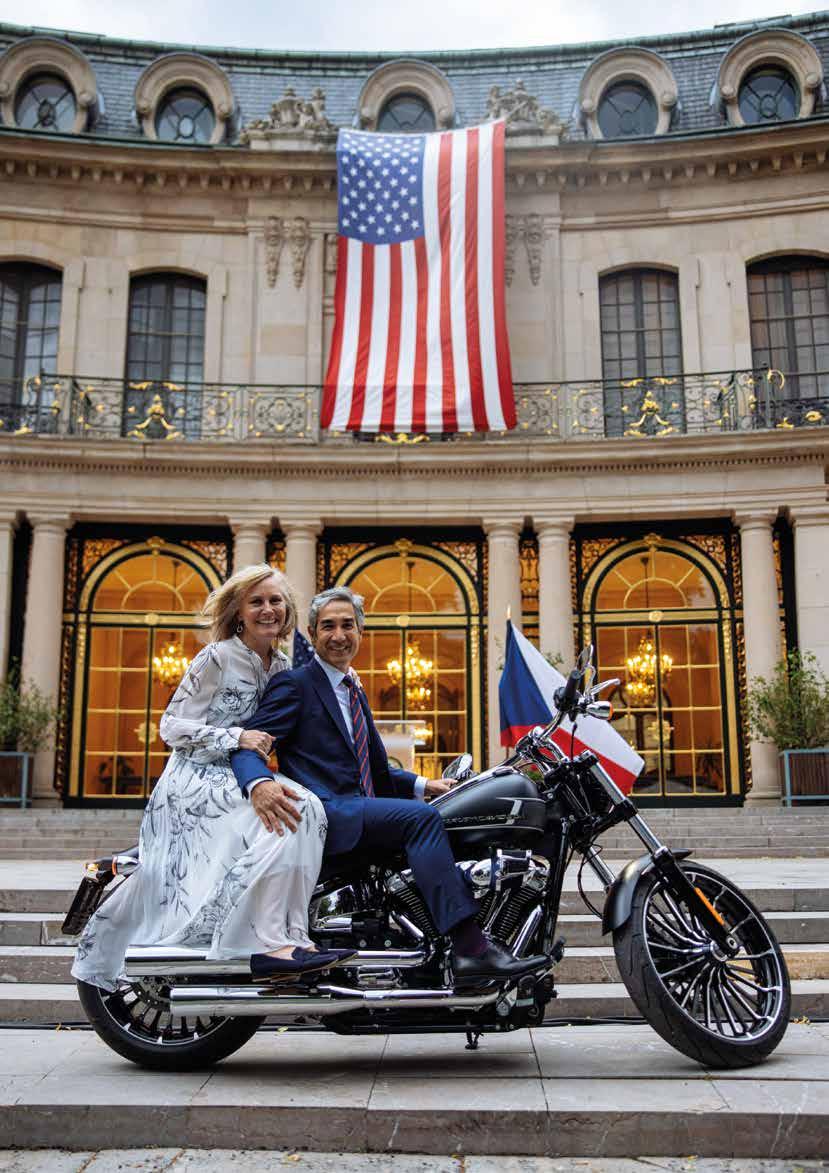
have been scaling the stairs together. And though I’ve only spent five months in this country, I have been so inspired by Czechs I meet every day.
During those five months, I’ve met Czech firefighters who pulled survivors from the rubble following the devastating earthquake in Turkey; activists fighting for LGBTQ rights and gender equality; Roma advocates combating discrimination; and entrepreneurs who have reminded me of the same energy I saw as a tech investor in Silicon Valley.
And as Ukraine fights for its own freedom, not only were you the first nation to send heavy weapons, you also provided safe haven to more refugees per capita than any other country. I’m deeply impressed by the vibrant Czech civil society and the NGOs that find new ways every day to help the brave Ukrainian people as they defend their homes and their families, and fight for the future.
I can’t wait to meet even more of you as we continue to expand our relationship through people-to-people exchanges, commercial cooperation, and new frontiers like energy, science, cyber, health, and space.
Everywhere I go, I am in awe of this beautiful country. As an amateur photographer, I’ve found endless subjects during my evening strolls up and down Prague’s cobblestone streets.
I’ve pedaled the paths of Bohemia to commemorate the U.S. military helping liberate this country from the Nazis. I sipped coffee at Café Savoy, where Madeleine Albright and Václav Havel reflected on the choices leaders make when fighting for independence.
I’ve skied in the north, toured parts of Moravia, and visited Brno. And at every turn, I’ve experienced your incredible kindness, remarkable history, and delicious food. I think the only one having more fun than me is our dog, Sam.
I could not be more grateful for the warm welcome you have given my family here in the Czech Republic. It means so much to move across an ocean and still feel like we’re home. “Mám knedlík v krku” – I have a dumpling in my throat.
I want to close with some thank you’s. Thanks to our event partners for their support of this celebration. Thanks to the amazing Residence Staff. And thanks to my Embassy team and their families, for making this event and everything we do every day, possible.
And thank you all for joining us on this beautiful summer evening to celebrate our independence and our connectedness. Here’s to vision and venture, to not simply staring up the steps, but to stepping up the stairs.
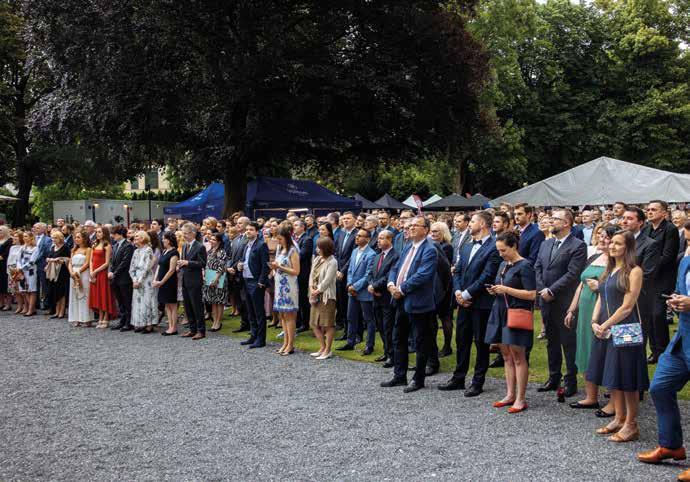
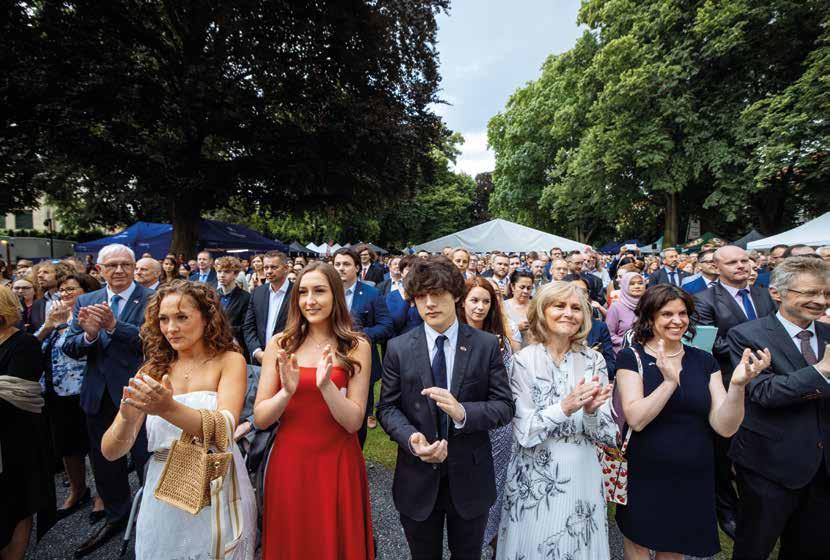
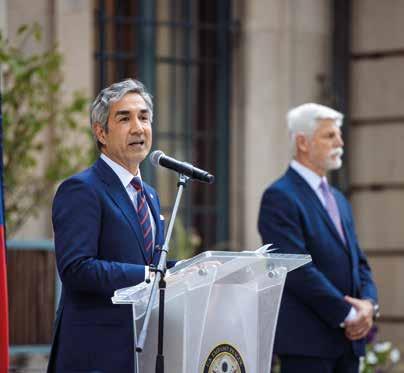
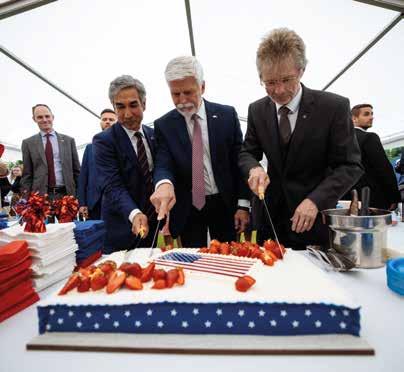 From right: RNDr. Miloš Vystrčil, President of the Senate of the Czech Republic, Ms. Christina Jeanne Agor, Counsellor, Deputy Head of Mission, Mrs. Lauren Sabet, spouse of the Ambassador of the USA, and their children and other guests
H.E. Mr. Bijan Sabet, Ambassador of the United States of America and Petr Pavel, President of the Czech Republic
H.E. Mr. Bijan Sabet, Ambassador of the United States of America; Petr Pavel, President of the Czech Republic; and RNDr. Miloš Vystrčil, President of the Senate of the Czech Republic
From right: RNDr. Miloš Vystrčil, President of the Senate of the Czech Republic, Ms. Christina Jeanne Agor, Counsellor, Deputy Head of Mission, Mrs. Lauren Sabet, spouse of the Ambassador of the USA, and their children and other guests
H.E. Mr. Bijan Sabet, Ambassador of the United States of America and Petr Pavel, President of the Czech Republic
H.E. Mr. Bijan Sabet, Ambassador of the United States of America; Petr Pavel, President of the Czech Republic; and RNDr. Miloš Vystrčil, President of the Senate of the Czech Republic

Dear readers,
Being appointed to Prague is an invaluable opportunity for an Ambassador. To have to leave Prague, a few years later, is therefore losing something invaluable.
I am not just talking about the city as such: a splendour, inhabited by a real „genius loci“, and moreover where life is good! It is also the country as a whole, its people, its culture, its intellectuals, its scientists, its artists, its heritage, its nature, etc. And then, for a diplomat, the Czech Republic is also an opportunity to witness an intense political life, which has seen, during the years of my assignment, the development of great fundamental debates, illustrated by the demonstrations of the „million moments for democracy“, then the change of majority following the 2021 elections, and the election of a new Head of State at the beginning of this year.
It is also a country with active diplomacy, which supports the values of democracy and respect for human rights, but which also takes up the challenge of confrontation when necessary. Czechia represents a renewed commitment to European construction, as brilliantly illustrated by the Czech EU Presidency last year. It is also a generous and courageous support for Ukraine, inspired by a painful historical experience. It is still an unfailing commitment to solidarity in matters of security and defence, within the North Atlantic framework.
It is furthermore a country that has extraordinary companies, which are champions in their areas of activity, and a country that is also welcoming many foreign investors.

In short, it is a country where the diplomat is never bored for a minute, and where he constantly finds new avenues to explore, for the strengthening of the relations with his homeland…. And when this diplomat leaves, he obviously feels “expelled from paradise”! But such are the rules of diplomatic life, and my wife Bernadette and I are delighted to have had this chance to be posted in Prague.
I am deeply grateful to all those who allowed me to have this successful experience: my Czech and Slovak collaborators of the Embassy, the Deputy Head of Mission, our Military Attaché, the representatives of the communities and regions of Belgium represented in Prague, and also the many Czechs and Belgians who, in their field of competence or their region, contribute graciously to the strengthening of Belgium’s presence and image. I am also very grateful to my wife for her commitment to the Embassy’s activities and to the Diplomatic Spouse Association. I would also like to thank my colleagues of the Prague Diplomatic Corps, where perfect collegiality reigns, marked by a great deal of mutual assistance and friendship, under the benevolent attention of its Dean. Last but not least, a very big thank you to the many Czechs I have met over the course of my activities: experts, senior civil servants, political and academic leaders, etc. who welcomed me so well and helped me in carrying out my mandate. And to those who are still in Prague but will soon have to leave, I say: enjoy every moment of your remaining Prague citizen life!
And to my successor, Ambassador Jurgen Van Meirvenne, I wish full professional success, in a city to which he will, in turn, be very attached to, I am sure.
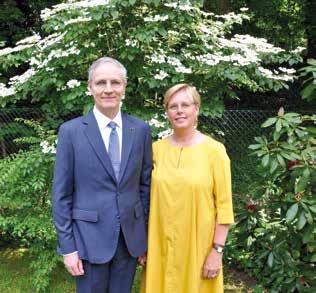 Gregoire Cuvelier
WITH H.E. MR. ALEXIS DUTERTRE, AMBASSADOR OF FRANCE
Gregoire Cuvelier
WITH H.E. MR. ALEXIS DUTERTRE, AMBASSADOR OF FRANCE
“The European dimension of our relations is absolutely crucial,” says H.E. Mr. Alexis Dutertre, Ambassador of France, and continues, “We are now working on preparing key decisions to pave the way for the next EU enlargement, a process where we also need to achieve significant reforms in governance and policies so that a future EU can be efficient and successful”. How many “Alliance Française” can you find in Czechia? Is nuclear energy making us closer partners? And is there really only one Europe? These are but a few questions we are touching on in our interview.
You took over as Ambassador to the Czech Republic in October 2020, three years ago. Can you still recall the time?
Of course I can. I arrived in Prague during the COVID-19 lockdown. It was a very particular period, and not the easiest one to begin my tenure here, with all the Zoom meetings, live meetings with masks on, and Plexiglas windows. In a function where establishing good personal contact is so important, it was very frustrating, not least regarding the need to manage the services of our embassy. Therefore, I was only able to truly enjoy Prague and the Czech Republic after a few months. It was quite special to discover Prague with almost no tourists, and I enjoyed my first visits out of Prague a lot, starting with the cities where we support an “Alliance française” as a cultural and linguistic centre: Brno, České Budějovice, Plzeň, Ostrava, Pardubice, and Liberec. These three years have allowed me to work towards building on and establishing lasting partnerships between France and Czechia, in particular as my first mission was to promote strong cooperation on the EU agenda as France and Czechia were preparing for their respective EU Council presidencies (during the first and second semester of 2022). I have always been pleasantly surprised to see how well France is known and appreciated, no matter the city or the region. We are now supporting the opening of a seventh “Alliance Française” in Zlín, and taking an active role in the activities of the newly inaugurated Milan Kundera Library in Brno.
My career has always entertained a close link with the European Union. I served twice in our Permanent Mission to the EU in Brussels, the second time as deputy permanent representative, focusing on negotiations on EU sectoral policies, but also as EU advisor to our Foreign Minister, and then to our Prime
Minister. I also served in a three-year position as deputy head of mission in Tel-Aviv: Israel is a thrilling place to serve as a diplomat.
I came to Prague knowing that the succession of the French and Czech presidencies of the Council of the EU would be a crucial moment for our bilateral relations, as well as for building convergence on the EU agenda. Indeed, in the second semester, no less than fifteen of our ministers came to Prague for ministerial meetings, and President Emmanuel Macron attended the Prague Summit on 6th and 7th October 2022, with the launching of the European Political Community, which was his idea.
The European dimension of our relations is absolutely crucial: we forged the EU unity on the support to Ukraine immediately after the Russian military aggression, now supporting Ukraine’s accession to the EU and NATO, but also building a stronger Europe, with a particular focus on strengthening economic security and reducing strategic dependencies in the fields of defence, technology, energy, raw materials, etc. We are now working on preparing key decisions to pave the way for the next EU enlargement, a process where we also need to achieve significant reforms in governance and policies so that a future EU of up to 36 members can be efficient and successful.
Our French-Czech relationship is reinforced today by the shared conviction that there is not that of the West and that of the East, the old and the new: there is only one Europe. This topic is at the heart of the late CzechFrench author Milan Kundera’s essay “A Kidnapped West”: in the face of Russian aggression, we all lay westwards of Moscow, and share the same values and interests. This relationship is first and foremost that of all our personal ties, which we support as our daily work at the embassy, the French Institute in Prague, the French high school, and the CEFRES - our
research centre for human and social sciences, here in Prague. It is an ever-growing network of crossinvestments, scientific and research partnerships, alliances of European universities, multilingualism with high schools with Czech sections in France and bilingual sections here, exchanges between cultural and audiovisual institutions, and actions for equality between women and men.
Our economic ties are growing: our bilateral trade reached an ever-high peak of 14.5 billion Euros in 2022, with nearly 500 French companies established here and providing for nearly 70,000 direct jobs in the Czech Republic. France and Czechia are strong partners within NATO and the EU, with also a solid and living bilateral strategic partnership since 2008. France is listening to Czechia’s needs in upcoming strategic choices, to be a long-term partner, in particular in energy independence, with a focus on nuclear energy and in interconnections, and modal shifts with transport infrastructures and high-speed railways. On the other hand, France is also attractive to Czech investments, with recent high-profile investments of Czech companies in France, in various sectors: energy, media, retail, chemicals, and biotechnologies.
You mentioned nuclear energy. What does the cooperation of both countries in this area look like?
Czechia is France’s closest partner in the EU when it comes to the question of nuclear energy. We share the same strategic choice to ensure our national energy independence, and meet the growing demand for stable, competitive, and low-carbon electricity, with the strong support of our public opinion that nuclear energy must be part of the solution, together with renewables. Both our countries have now decided to build new nuclear reactors: up to four in Czechia, and six (with an option for eight more) in France. It thus makes sense to build a European partnership, and to make European choices for the future of our interconnected energy markets.
France and Czechia are building an alliance of likeminded Members States on nuclear energy within the European Union, which is key to securing investments and financing models, as well as to ensuring technology neutrality in the EU regulatory framework on energy.
In this context, EDF (Électricité de France company) will submit its final offer at the beginning of October for the Czech new-build nuclear program. This offer is based on the proven and licensed EPR technology, with a clear commitment and proven track record to ensure the participation of the Czech supply chain to its largest extent, and to help establish a European fleet effect, in synergy with other new EPR programs being developed in France and in the United Kingdom. France and Czechia are also investing in skills and research in nuclear energy, with strong cooperation already established and flourishing in this new context.
This interview is done on the occasion of the French national day. What would you wish for your country and for the Czech Republic?
I can only wish that both our countries remain steadfast in our commitment to the European agenda. In a more brutal and competitive world, our nations need a stronger and less naive Europe. For France, a more united Europe also means a more sovereign Europe, and I believe Czechia has an important part to play in this shift.
This also means remaining steadfast in our support of Ukraine. The Russian aggression has destabilized our continent, and it is crucial that we help Ukraine achieve victory. Both France and Czechia have been strong supporters on all fronts, with the delivery of significant military equipment. This support will continue until Ukraine achieves its objectives. So, I can definitely wish this success not only for Ukraine but for both our countries and the whole European continent, paving the way for Ukraine’s membership in the EU and NATO.
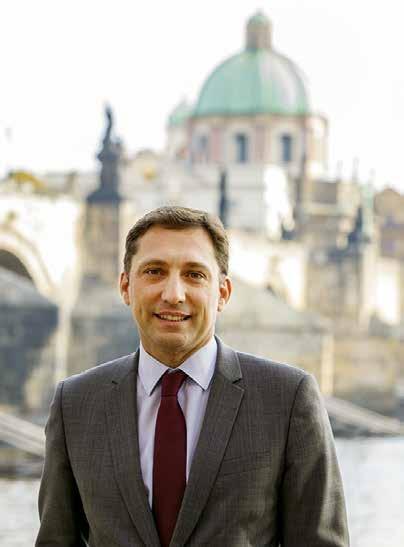
On the occasion of French National Day, celebrated on July 14 as a commemoration of the 1789 Bastille Day, Ambassador of France H.E. Mr. Alexis Dutertre hosted a special reception at the beautiful garden of the French Embassy in Prague. You can read selected parts of his welcome speech and together with the photos get a picture of the friendly atmosphere at the event.
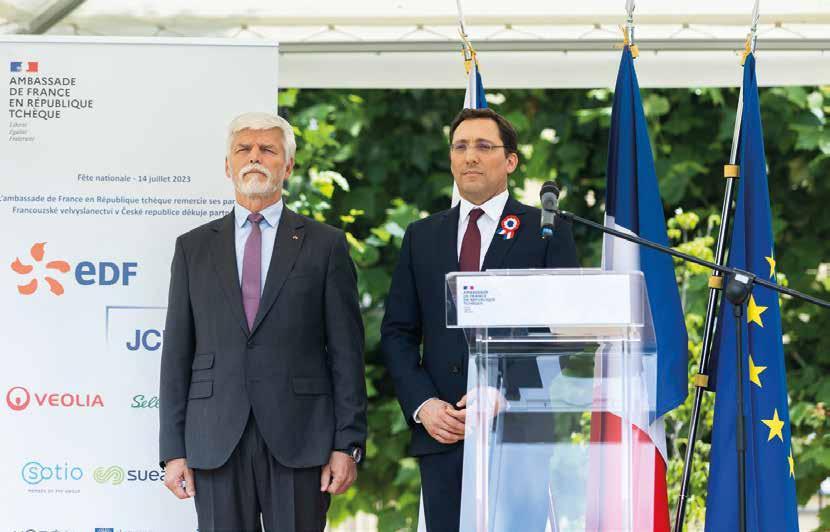
Mister President, Ministers, Ladies and Gentlemen, Dear Compatriots.
Dear guests, Ladies and Gentlemen, Dear friends.
What a pleasure to welcome you and meet you so many for our national holiday and mark the FrancoCzech friendship!
I am very happy to be able to welcome you to the French Embassy on the occasion of Bastille Day.
I would just like to mention two subjects that bind us: our European unity and our Franco-Czech relationship. For more than 500 days, Europeans have shown the strength of their unity in support of Ukraine, together with their allies. The war is not over but it is already a geopolitical failure for Russia. To use the formula of Milan Kundera, who died this week and to whom we pay tribute, we will not let Ukraine be another „kidnapped West“.
[In Czech] France and the Czech Republic today share several convictions : there is no place for a Russian imperial fantasy in Europe; support for Ukraine will continue as necessary to achieve a lasting peace, that is, chosen by Ukraine and respecting international law; the best security guarantees for Ukraine are in its membership of the EU and NATO. It is a path that our two countries have helped to pave. To use the formula of Milan Kundera, to whom we pay tribute today, we will not let Ukraine be another „kidnapped West“.
In a more brutal and competitive world, our nations need a stronger and less naive Europe. For France, a more united Europe is also a more sovereign Europe.
This European unity is also necessary to strengthen our economic security and reduce our strategic dependencies in terms of defense, technology and energy security. For this to happen, the next enlargement must be successful. This means
simultaneously preparing the reforms necessary for a Europe of 36 Member States to function effectively. France wishes to work on this topic with Czechia.
Our Franco-Czech relationship is strengthened today by the shared conviction that there is no West and East, no old and new: there is only one Europe. This common view is at the foremost of all our personal ties, supported by the embassy, the French Institute in Prague, the French high school and CEFRES. It is a network of cross-investments, scientific and research partnerships, alliances of European universities, multilingualism with high schools with Czech sections in France and bilingual sections here, exchanges between cultural and audiovisual institutions, actions for equality between women and men. Finally, nearly 500 French companies provide nearly 70,000 direct jobs in the Czech Republic.
Today, France wishes to strengthen its long-term partnerships with the Czech Republic: within the nuclear program with the offer from EDF and the European nuclear alliance, in the area of transport and high-speed rail infrastructure, with the PPP model; by investing here in the vehicle of the future; and by developing technological and artificial intelligence ecosystems.
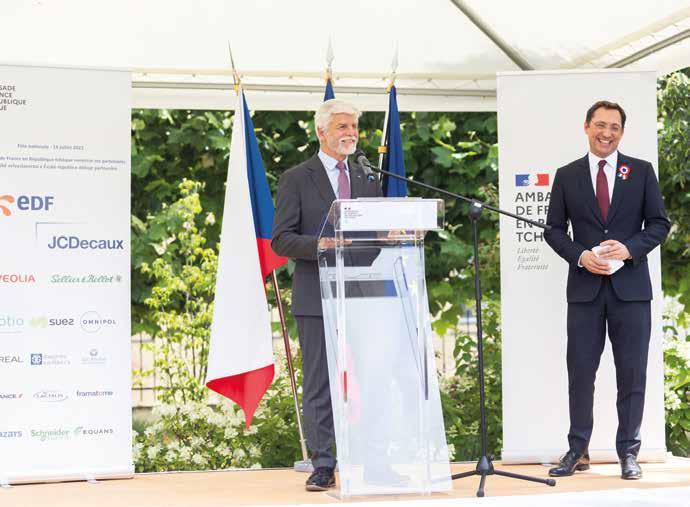
I would therefore like to thank those who, through their commitment, keep our Franco-Czech relationship alive: the French community, the Franco-Czech chamber of commerce, foreign trade advisors, the six French alliances in the region (and soon a 7th in Zlín by the end of the year!), associations and of course our elected consular officials. I also extend my very sincere thanks to all the partners of our reception today.
Thank you to all friends of the Franco-Czech relationship! Very happy national holiday to all!
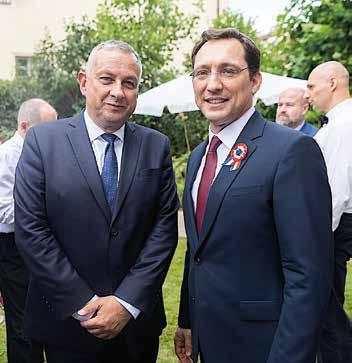
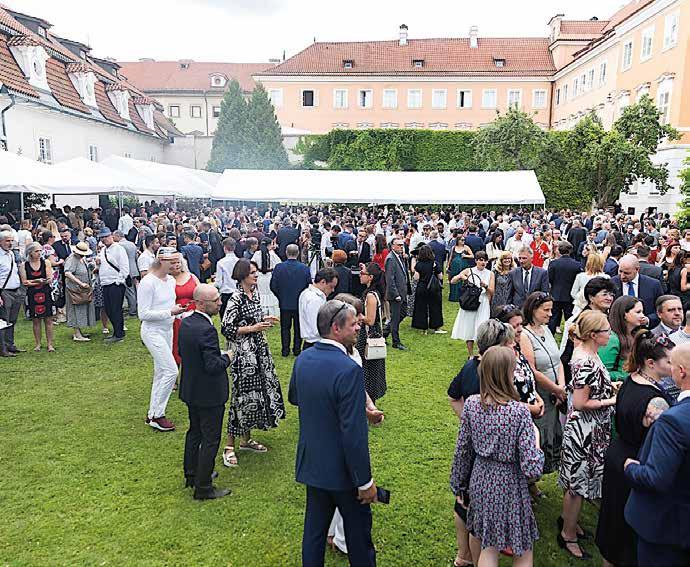
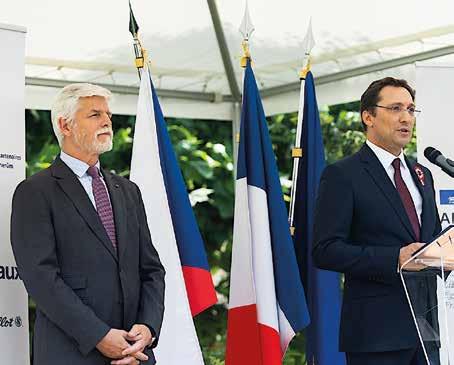
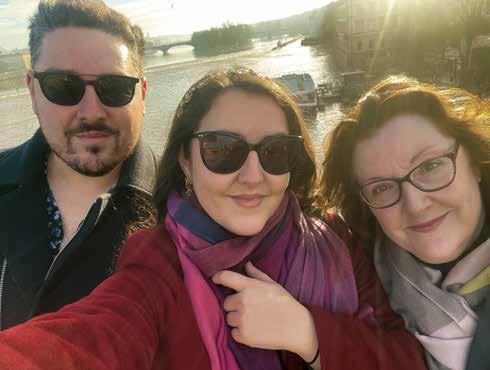
Dear readers,
Being an Ambassador to the Czech Republic is an honour and a privilege. We have worked closely with the government and people during the pandemic, and the Irish government is working well with the Czech government. President Higgins warmly congratulated President Pavel earlier this year on his election. The President and Czech government are impressive in their leadership and response to the invasion of Ukraine by Russia. Ireland continues to stand with the Ukrainian government and people in this second year after Russia’s brutal and unprovoked aggression.
The delivery of a successful Czech European Commission Presidency in the second half of 2022, the Czech response to Russia, and the handling of the energy crisis have all been
effective. The delivery of a prompt, humane Czech response to the arrival of several thousand Ukrainian refugees, mainly women and children, has been acknowledged internationally. Ireland also has responded fast to this major humanitarian need.
A recent trade mission, led by our Minister for Trade Promotion, Digital and Company Regulation, with Enterprise Ireland and many leading Irish companies, underlined our commitment to the delivery of digital and Green transition, business, agritech, environmental solutions, fintech, and innovative software. Ireland and the Czech Republic are like-minded at the EU and UN levels, and cooperate closely on transatlantic relations, sanctions, energy, climate change, human rights, the rule of law, Single Market, trade, and much more. Cooperation with the Czech government, public and private agencies, and Czech TV and media has created more interest in Ireland, and is leading to further collaboration.
Education is key to our future cooperation, and we are more aware of each other’s history and experience since our independence. My adult son Luke and daughter Leah Leslie both work in the creative industries, and while I have been posted here they have been learning more about their European roots. We have been greatly impressed by the talent and history of the Czech people, and by the vibrant beauty of Prague and the country. Together we have learnt more about the development of the Czech Republic since the Nazi and Soviet occupations. Irish and Czech people are a great fit in business throughout the Czech Republic, also in the many cultural sectors where we share our talents. We have constant engagement with the vibrant Irish community in Prague, from students studying on Erasmus+ exchanges, to established expats in the Czech Irish Business and Cultural Association, and with the Irish Studies Centre in Charles University. We encourage all your readers and their families to visit Ireland, and to explore educational links. We’re delighted that Irish culture, film, and animation have captured the imagination and hearts of Czech, as well as global audiences. The Irish language is taught and spoken in Prague, and Gaelic Games – and Irish football hurling – have been growing in popularity there. As I prepare to leave the Czech Republic, it remains vital that we stand together for common values, including unwavering support for the Ukrainian people, as well as for our shared commitment to freedom and democracy. I wish the readers of the Czech and Slovak Leaders success, health, and peace. I leave the Czech Republic to return to Ireland knowing that we are close and reliable partners, who together are large enough to make a difference through partnership, and even closer international cooperation.
Is mise le meas - Sincerely,

 Cliona Manahan
Ambassador Manahan and her daughter Leah Leslie and son Luke Leslie
KHASHKHAN DAMDIN, AMBASSADOR OF MONGOLIA
Cliona Manahan
Ambassador Manahan and her daughter Leah Leslie and son Luke Leslie
KHASHKHAN DAMDIN, AMBASSADOR OF MONGOLIA
“Czechia was the first foreign country I have ever visited, as a teenager, 40 years ago. Now, I am representing my country in the Czech Republic as an Ambassador, and I am grateful to my government for entrusting me with this appointment,” says H.E. Mr. Gansukh Damdin, Ambassador of Mongolia. Talking about the relations between the two countries, we could not help but mention the “Third Neighbour Policy” of Mongolia, “Years to visit Mongolia” program, and of course the “Przewalski’s horse” and “One Billion Trees” projects.
Introduce your country to our readers, please. Mongolia is located in north-central Asia, and covers 1.5 million square kilometres, with a population of 3.5 million people. We are a nation with a great history and rich nomadic traditions, which have been passed down from generation to generation for hundreds of years. Mongolia is a democracy. As a country rich in mineral resources, the mining sector constitutes a majority of the economy. In 2022, our GDP grew by 4.8%, and for this year it is projected to reach 5.3%.
You became the Ambassador of Mongolia to Czechia two years ago. Could you share the journey that brought you to this position?
I was born and raised in a herdsman’s family in a remote village of Khashaat in Arkhangai province, Mongolia. I am the fourth child out of eight. I completed secondary school in my hometown, and went on to study at the National University of Mongolia in Ulaanbaatar in the year 1986. After a year of studying there, I was given the opportunity to study at the Moscow State Institute of International Relations. I studied in Moscow for five years, and this was the beginning of my diplomatic career. I have been working in the Foreign Service of Mongolia for over 30 years, since I first entered it in 1992. I have held various positions at the Foreign Ministry, including working in the Press and Information Division, the Department for Multilateral Cooperation, the Policy Planning Department, and working as a desk officer for ASEAN countries. During this time, I have been assigned to a few posts at our Diplomatic Missions abroad. Before being appointed as Mongolia’s Ambassador to Czechia by President Ukhnaa Khurelsukh, I was the Director General of the Department of the Americas, the Middle East, and Africa at the Mongolian MFA.
During my tenure as a Director General, I was able to take part in the process of establishing Strategic Partnership relations with the USA. The USA is an important third neighbour of Mongolia, who has encouraged our democracy and reforms from the beginning. It became Mongolia’s fifth strategic partner in 2019.
The history of Mongolia, and the path it has been through, has had a significant influence on me becoming a diplomat. The Chinggis Khaan consolidated Mongol tribes, revived statehood, and further established the Great Mongol Empire in the 13th century. The world knows that Pax Mongolica, or “Mongol Peace”, was brought on by the Great Khaan to humanity during this time.
Today, Mongolia actively participates in maintaining peace and security across the globe, as well as harmony for humanity. Last year, the UN Secretary-General António Guterres announced that “Mongolia is a symbol of peace” during his visit to Mongolia.
The Chinggis Khaan once said, “Diplomatic relations are the golden tether of our Statehood”. Keeping this wisdom in mind, I am eager to fulfil the noble duty of Ambassadorship with distinction. I am also grateful to my government for entrusting me with the appointment as the Ambassador to the Czech Republic, a close partner of Mongolia.
We are curious about some of your impressions and highlights of your tenure in the Czech Republic so far. It may not be coincidental, but I have two interesting experiences related to Czechia. First of all, Czechia was the first foreign country I have ever visited. 40 years ago, as a teenager, I came to Czechoslovakia to spend my summer holidays at the international camp. I remember visiting
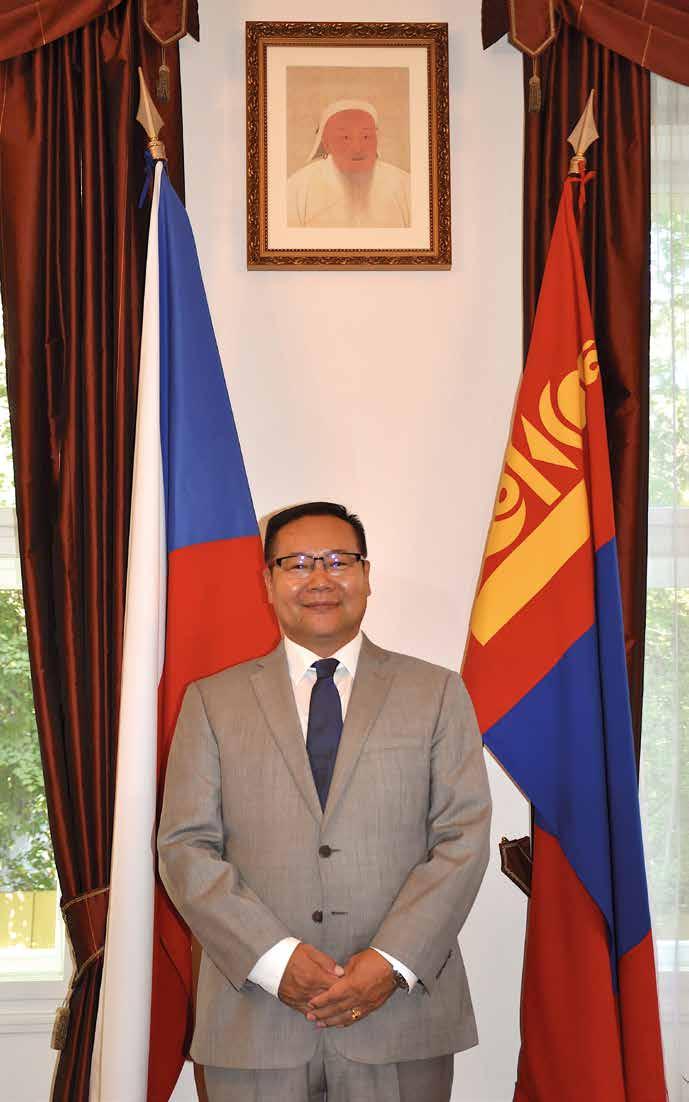
Prague Zoo, and telling my friends and family about the animals that we had never seen before, as well as about the buildings, which were hundreds of years old. Now, I am representing my country in the Czech Republic as an Ambassador. During this time, I have noticed that tradition and innovation complement each other well here. Our countries are similar in that we both have a rich history and culture, and I think our country could learn from Czechia on how to better implement this pairing between tradition and innovation.
How many countries have you served in?
My appointment here in Czechia is my fourth posting abroad. The first one was at our Embassy of Mongolia in the Kingdom of Thailand. It was very interesting for me, as Mongolia had just newly established its resident Embassy in Bangkok. The second one was in Ottawa, as a Counsellor of the Embassy. Then, I served as the Minister-Counsellor and Deputy Head of Mission at our Embassy in Washington DC. During those years, I witnessed many important events related to Mongolia-U.S. relations, and took part in the activities and negotiations of adopting the U.S. Congress Resolutions supporting Mongolia and implementing the second Millenium Challenge Compact project in Mongolia. Currently, a 350 million USD project, designed to increase drinking water supply in Ulaanbaatar, is successfully being implemented within the MCC program. For the first time, Mongolia will have a wastewater recycling plant, and the Central Wastewater Treatment Plant of Ulaanbaatar city will also be renovated.
Being an ambassador and your lifestyle – is that a harmonious match?
Personally, I think the life of a diplomat is quite interesting. Working and living in a foreign country for a certain period, and thus engaging with a foreign country’s culture and customs, as well as with its people, is a good learning experience. In between postings, we also stay in our home country, which gives us a chance to better sense what has happened in the country, what is new, and what the changes or challenges there are.
A diplomat has a wide opportunity to meet and have a conversation with people from all walks of life: the heads of the state and government, entrepreneurs, intellectuals, everyday citizens etc. In that sense, we bring people together and we connect them, which I love to do. I am most grateful to my family that they understand, and are fond of my work. With their unwavering support, I could have accomplished my career from Attaché to Ambassador.
You mentioned some very key facts about Mongolia’s economy at the beginning of our interview. Can you provide some additional details, please?
Like every other country around the world, Mongolia’s economy has been significantly affected by the COVID-19 pandemic. With the aim to recover the economy and reduce setbacks to our development, the government
is implementing a New Economic Recovery Policy. This policy focuses on 6 areas, designed to address key economic constraints. These areas are: border ports, energy dependency, industrialization, urban and rural development, green development, and state policy efficiency.
The government is also actively working to improve the legal framework and institutional systems designed to protect investors’ interests. Mongolia has signed bilateral investment treaties with 43 countries, has established double taxation agreements with 26 countries, and it is party to many important multilateral treaties such as the Washington Convention on Settlement of Investment Disputes, the UN Commission on International Trade Law, the Asia-Pacific Trade Agreement, and the Energy Charter. Digitalizing government services is also a vital step in streamlining its policies, and it is being implemented quite successfully.
Furthermore, the government is focusing on attracting more investment in non-mining sectors, such as agriculture, information technology, tourism, and energy. Under the initiative of the President of Mongolia, we are implementing the “Food Safety and Supply” program across the country in order to ensure food security and strengthen farming and agriculture. The government has set an ambitious goal to receive one million tourists in 2023, and to attain 1.2 billion USD (during that time). For attracting tourists, we announced the years 2023-2025 as “years to visit Mongolia”, and exempted 34 European countries’ travellers from needing a visa to visit. In total, the citizens of 61 countries are on our visa-exempt travel list, and the citizens of another 99 countries are entitled to apply for a Mongolian e-visa for the purpose of tourism.
In my view, the EU is a key partner for Mongolia in developing non-mining sectors. Mongolia signed the Partnership and Cooperation Agreement with the EU, and enjoys the EU GSP+ status, which allows 7,200 types of goods to be exported to EU countries. Additionally, the Government of Mongolia has decided to build a new Kharkhorum city in the central part of Mongolia, a project in which foreign partners are more than encouraged to participate.
As earlier noted, Mongolia declared 2023-2025 as the “Years to Visit Mongolia”. Citizens of EU member countries will enjoy visa-free travel to Mongolia for the purposes of tourism. In addition, those who participate in sports and cultural events, make movies, create contents, or transit in Mongolia will be visa-exempt.
I would say Mongolia is becoming one of the mustsee travel destinations. We have a lot to offer, such as snowcapped high peaks, dazzling sand valleys, and vast steppes. You can find horse riding tours in every part of the country, while Gobi has camel riding tours with Bactrian camels (which are native to Mongolia). Therefore, we invite
fellow Czechs to visit Mongolia, and to explore our beautiful country. Summer and autumn are the most pleasant seasons to visit Mongolia and explore – from UNESCO heritage sites to the beauty of landscapes. I can guarantee that dwelling in our national housing (ger) and staying with nomadic families will be one of the most exciting and interesting experiences of your travel. The sun will rise right before your eyes, and the night sky will immerse you in thousands of stars.
Eco-tourism is becoming more prominent in Mongolia.
I would like to highlight that, with the support of the Czech Embassy in Ulaanbaatar, the Hiking Markers System of Czechia was introduced to Mongolia in June. Mongolia is also home to over 4,000 rivers, and there has been a rise in popularity among Czech fishermen/women visiting due to the documentary made by famous Czech fisherman Jakub Vágner. Moreover, ice fishing trips to Mongolia are becoming popular, and fishing spots can be found as close as the capital city Ulaanbaatar. We will always welcome fellow Czechs to Mongolia – a country of eternal blue sky.
Mongolia has special relations with Prague Zoo, which all Czech nature lovers are very proud of. How do you feel about it?
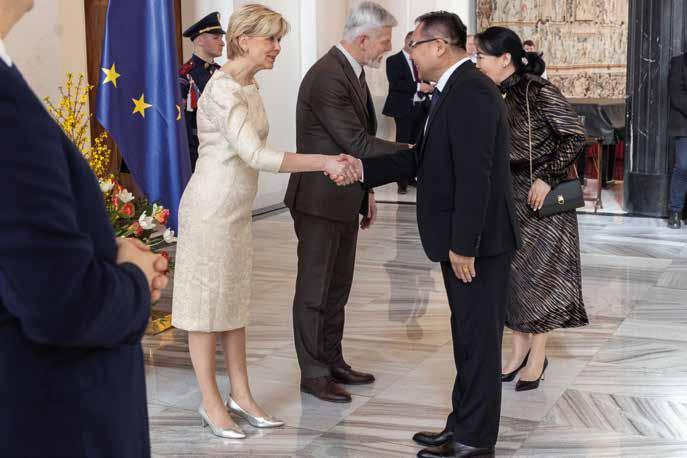
Prague Zoo has been implementing a very important project of re-introducing Takhi – or Przewalski’s horse – in Mongolia for over 20 years. This project allows the once almost extinct Takhi to wander the steppes of Mongolia once again. The third project is now in progress, in which the protected area Numrug in Dornod province, was
chosen as the third translocation place. Within prior phases, the Przewalski’s horses were taken to the Gobi B area and Khomiin tal. The population of air-transported Takhi from the first project has now increased from just 34 to over 400. On behalf of the Government of Mongolia, I would like to take this opportunity to express our sincere gratitude to all those who were involved in the projects of returning Takhi to their homeland.
However, this is not the only long-term tie between our people…
Of course not. Let us mention the “One Billion Trees” green development program that the President of Mongolia initiated in 2021. Mongolia signed the Forest Partnership Memorandum with the EU in 2022 in Sharm el-Sheikh, Egypt. Czech researchers and scientists, led by Mendel University, have been actively contributing to forest research and forest management improvement in Mongolia. We encourage them to continue their work within the “One Billion Trees” national movement, as well as the “Forest Partnership” of the European Union. Moreover, Czech Deputy Minister of Education, Youth, and Sports, Mr. Jaroslav Miller, visited Mongolia in April, and signed a Memorandum of Understanding on Promoting Cooperation in Implementing the scholarship program between the Ministry of Education and Science of Mongolia and the Ministry of Education, Youth, and Sports of the Czech Republic. We expect a dozen Mongolian students to come study in the Czech Republic’s top Universities, under the auspices of the Mongolian President’s Scholarship program, starting this academic year.
One area that is also worth mentioning is that Czechia plays host to over 12,000 skilled Mongolian workers. It is the largest community of Mongolians in the EU, which consequently promotes strong people-to-people ties.
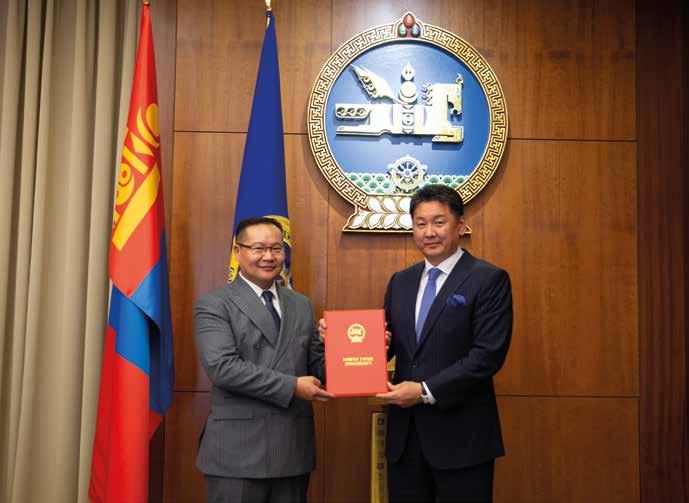
After talking about all these ongoing projects between the two countries it is a pleasure to ask: what is the current status of Czechia – Mongolia relations?
The two countries established diplomatic relations in 1950, and Czechoslovakia became the 4th country to recognize Mongolia’s independence. We enjoy a longlasting friendship, our people preserve a strong bond, and our countries share common values regarding democracy, freedom, and human rights. Political relations between our two countries have been reached to a high level, and the two sides recognize that we have great potential to expand our bilateral ties.
Within our „Third Neighbour” policy, we attach great importance to our partnership with the European Union, as well as with its member states – including Czechia. The Minister for Foreign Affairs of Mongolia visited the Czech Republic in May, and had a fruitful discussion regarding the upgrade of cooperation in the areas of economy, education, and science.
Broadening trade and economic cooperation are both key to our cooperation. The Joint Inter-Governmental Commission
is an important platform in promoting and expanding our cooperation in trade, economy, and investment. We are preparing to host the 8th meeting of the Commission in Ulaanbaatar, in the third quarter of this year. The MongoliaCzechia annual business forum will also take place concurrently. I expect tangible results from those events.
This interview is done on the occasion of your National Day. What are you wishing for your country, and for the Czech Republic?
On 10-15th July we celebrate our National Day – Naadam Festival. The celebration of this Festival dates back to the establishment of the Khun Empire in the 1st to 2nd century BC. At that time, the Naadam Festival was a symbol of the unification of Mongols; and wrestling, horseracing, and archery are the main features of Naadam. UNESCO listed Naadam Festival on its Intangible Cultural Heritage List in 2010. On this important occasion, I wish progress and prosperity for my country, and happy Naadam to Mongols far and near, friends of Mongolia, and esteemed readers of the Leaders Magazine. I sincerely wish every success to Czechia in its noble endeavour for a prosperous nation. I also wish that the excellent relationship and lasting friendship between Mongolia and Czechia will strengthen in the years ahead.
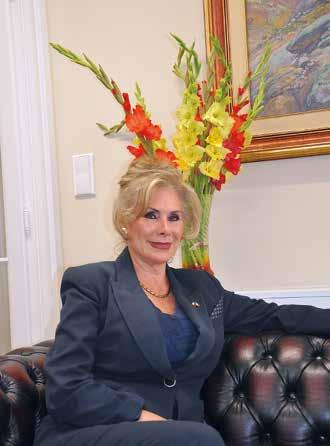
In the life of a diplomat, the end of the tour of duty is generally a sour moment, and this moment has arrived for me.
The Czech Republic has been an easy country to fall in love with. Throughout these six years, I have had the honour and privilege to serve as Ambassador of Mexico. There was always something new to do, to discover, or a project to get involved with. It was a very busy but enjoyable time – both professionally and personally (if making that separation is even possible).
Professionally, among many important occasions, there was the wonderful opportunity to celebrate the 100 years of the establishment of diplomatic relations of Mexico - Czechoslovakia/Czech Republic (1922-2022). A circumstance that allowed to summarize the high level of the bridges between the Mexican and Czech governments and peoples.
A number of official and unofficial meetings, reciprocal high-rank visits, seminars, conferences of all kinds, and environments are rich times to highlight. It has been fulfilling to strengthen the coincidences of the principles and values that both countries share in the bilateral and multilateral arena.

Personally, it would be endless to address the multiple and enriched tasks and experiences I had the opportunity to enjoy and share with Czech people. From university deans, professors, and students to cantina schools in thirty Czech towns; from big to multiple small and medium businesses; from renowned artists, singers, and athletes to scientists and other diverse personalities. Also, friends from different backgrounds, including great journalists and public relations entrepreneurs like the team of Leaders Magazine!
I take this opportunity to express my deepest gratitude to all friends, Czechs and non-Czechs, followers of Leaders, and, of course, to the founder of the magazine, Benke Aikell; the Executive Editors Eva Anderová and Meshulam Zisso, and their team for their marvellous and generous support in the diffusion of many of these adventures in which you took part in.

The collection of this material accounts for the splendid atmosphere that prevails among the members of the Diplomatic Corps that have had the privilege of being designated to the Czech Republic. Thank you, dear colleagues and friends, for the wonderful times we shared together!
Including this delightful land and the people of the Czech Republic, you will forever remain in my heart, and I hope to see you somewhere, sometime, in another part of the world, such as… Mexico!
Yours truly, R.
Leonora Rueda G., Ambassador of Mexico“In our country, one can experience the diversity of Asia in one stop,” says H.E. Ms. Suzilah Binti Mohd Sidek, Ambassador of Malaysia. She has only been to Czechia for a short time so far, and has not had the opportunity to explore any other region besides Prague, which she describes as “charming, just like most of its people”. We spoke to the Ambassador about her lifelong interest in the happenings around the world, the experience that she has gained in her profession, and the one responsibility that ambassadors can never delegate to others.
Can you tell us a few words about Malaysia, and about yourself?
I am the youngest of five siblings, brought up in a town called Kuantan in Pahang, a state on the east coast of West Malaysia. After completing my studies, I worked in the private sector for a short while before joining the civil service.
Malaysia is a multicultural country, located a bit north of the equator. Malaysians are a mix of people of different races and religions, mainly Malays, Chinese, and Indians, but also many other ethnic groups who practice Islam, Buddhism, Hinduism, and Christianity, among others. We enjoy a warm tropical climate, with rain and high humidity all year round. Malaysia IS truly Asia. That has been our tagline in promoting Malaysia, and the best way to explain and sum up what Malaysia is all about. One can experience the diversity of Asia in one stop, all at once – and that stop is definitely Malaysia.
What made you join the civil service and eventually become an ambassador?
As I was growing up, I watched a lot of TV, and I watched the news with my late father. We had both the Malay (national language of Malaysia) and English language newspapers delivered to our home, and it was a daily routine for me to go through them and read about the news of other countries. This contributed to my interest towards the happenings in other parts of the world. Other than that, the fact that geography classes were compulsory in our schools back then also influenced my interest.
When I had to choose my major after A-Levels, I came across an “international relations” course, which was alien to me back then. Feeling intrigued, I went around asking many people about it and what it meant, which no one could really explain. Contrary to today’s world, where the Internet and search engines are readily accessible, the quest to answer my curiosity remained limited. Despite that, I knew deep inside that this was my calling, and what I would like to pursue – something less familiar to others. My friend, who did the same course with me, shared that we could join the Foreign Service once we graduated. Again, this was not something I had information about, and that intrigued me even more. Only much later did I find out how exactly to join the Foreign Service in Malaysia, and gave it a try. Our Foreign Service is part of the larger civil service, and we had to undergo a series of exams, interviews, and courses in order to be accepted. After about six months of civil service training, we could then indicate our interest in joining the Foreign Service. After two interviews, I was accepted to join Wisma Putra, the Malaysian Ministry of Foreign Affairs, and it has become my beautiful journey for the last 22 years.
You arrived in Czechia less than a year ago. Have you collected any impressions so far to share with us?
Our countries established diplomatic ties in 1971, and we have had a good 52 years of this relationship. Nevertheless, there is always room to further connect our people and continue to have exchanges at all levels. In my case, the Czech Republic is the fourth country that I have served
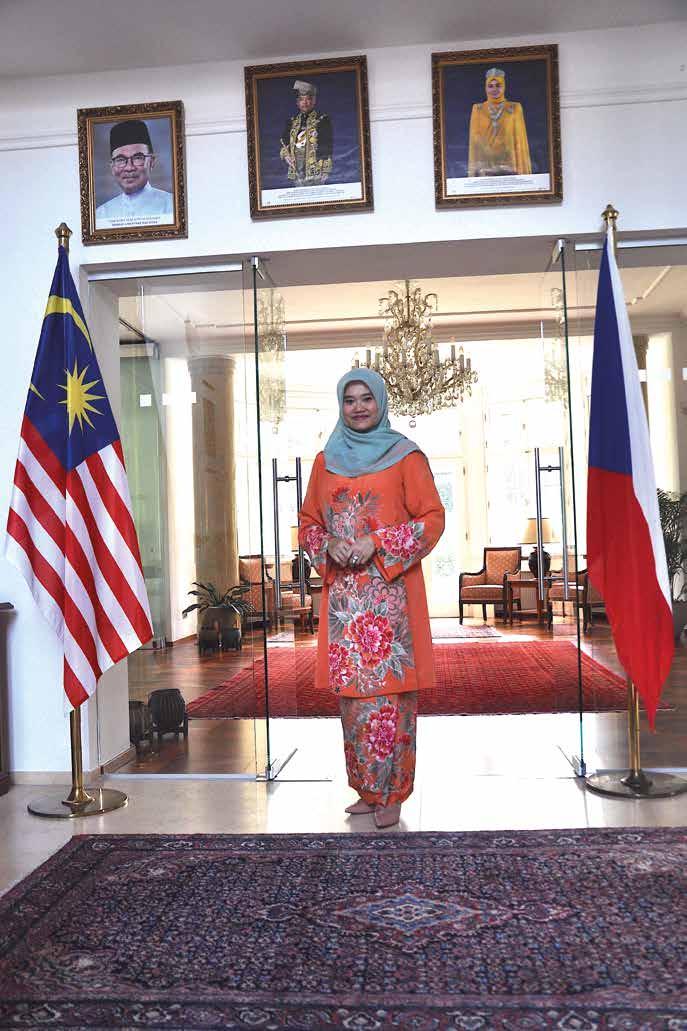
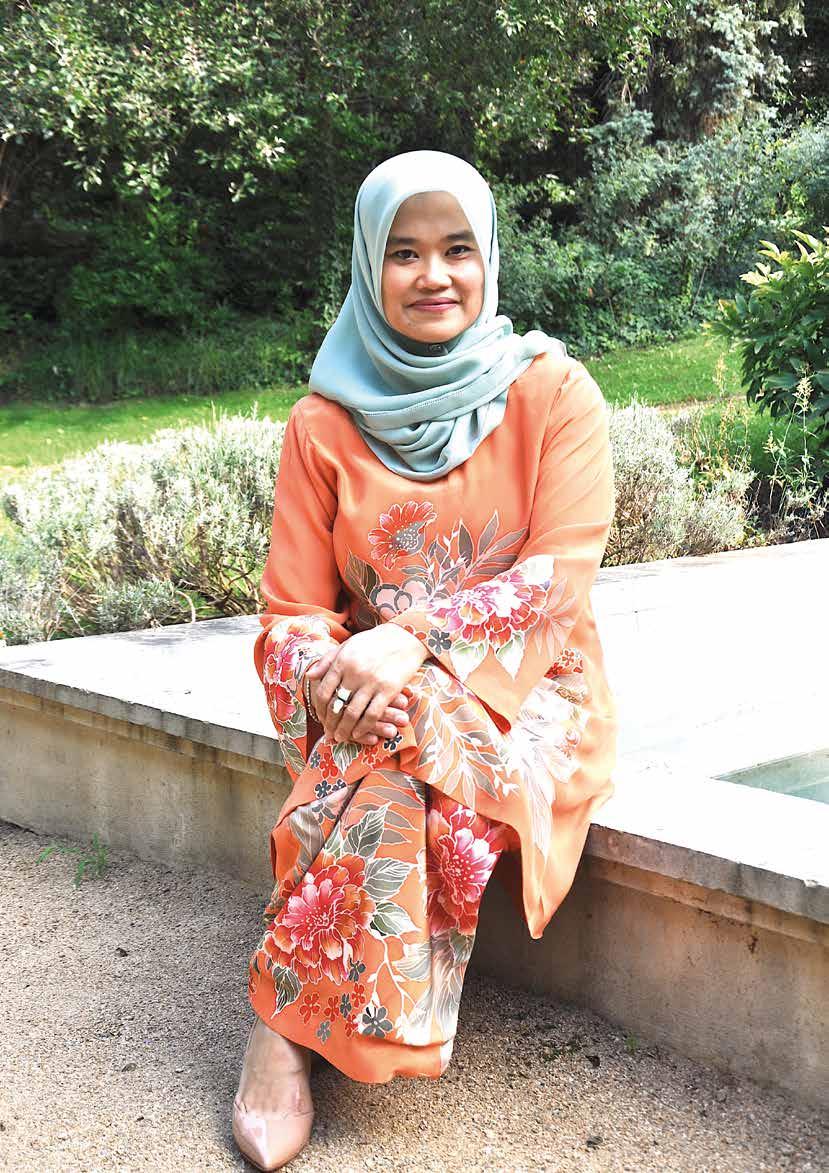
in up until now. My first post was in Ottawa, Canada, my second was in Vienna, Austria, and my third was in Bangkok, Thailand.
I have only been based here for about five months, and so far I find Prague to be charming, just like most of its people. For me, Prague is neither too big nor too small, and undoubtedly very beautiful. One will never get bored being here. I am yet to explore the other parts of the country, and am definitely looking forward to meeting more people, of course.
How does being an ambassador fit into your lifestyle?
As mentioned earlier, my interest in other countries sparked when I was quite young. I must say that I am very fortunate to have landed on this career path, as it gives me the opportunity to learn and experience living in other countries while working. Being part of an Embassy is a big bonus too, as it makes settling into new places slightly easier. It is good to be able to move to different countries for a certain length of time, knowing where my roots are, and be able to travel back to Malaysia from time to time. It is a kind of nomadic lifestyle which I am used to by now. The only downside is the packing and unpacking that comes with it!
In my free time, when I am in a foreign country, I prefer to walk and explore the cities and towns, as that will be a good way to discover cafés and restaurants. Yes, I am a bit of a foodie, and eating is one of the more popular pastimes for Malaysians. Other than that, watching movies and reading books are still among the things I love doing.
What has been your best professional adventure so far?
The first thing that comes to mind would be my first visit to Timor Leste in 2003. I was part of the Southeast Asian desk, and we had to prepare farewell visits by our outgoing Prime Minister at that time, Tun Mahathir Mohamad. His farewell visit there was the first foreign visit for Timor Leste, as they had just gained independence the year before. Not only did we get to witness the birth of a new country, but we also had the honour of being part of something very significant to both of our countries.
On the other hand, what do you consider the weirdest thing you have dealt with?
That would definitely be living through the COVID-19 pandemic in Bangkok. Bangkok is one of the busiest postings for a Malaysian diplomat. It was very quiet during COVID-19 compared to the year before, when Thailand was the Chair for ASEAN. In 2019, there were so many delegations travelling to Bangkok and other parts of Thailand to attend meetings, all of which kept us occupied with various activities. Everything came to a sudden stop when the pandemic hit, and we all had withdrawal symptoms!
That year (2020), I was also the chair of the working group on draft resolutions at the United Nations Economic and Social Commission for Asia Pacific (UNESCAP). It was really tough to get people to negotiate for the first time via Zoom. As it was an extraordinary circumstance, we agreed to only negotiate one resolution, which was the year’s theme resolution. Little did I know that it would be the most difficult (resolution to negotiate), as that year’s theme was oceans. We spent so much time negotiating, and it was really complicated – not only because of the substance, but also due to getting used to the technicalities of negotiating online. Furthermore, since there was a partial lockdown and the UN office was closed, we had to have the sessions in my Embassy’s multipurpose hall. The UNESCAP Secretariat joined my colleagues and me at our Embassy, and most of the time negotiations were done while listening to people arguing and staring at black boxes with only their initials. We finished at 3am on the final day of negotiations, shortly before the curfew imposed by the Thai government ended, which was until 4am. The good thing was that vehicles with diplomatic plates could travel with fewer restrictions then.
What is the most difficult part of being an ambassador?
Making swift and correct decisions. This was highlighted to me by the Czech Ambassador in Bangkok when I met him before assuming this post. He was absolutely right. We can consult others, of course, but the decision and the responsibility that comes from making that decision belong entirely to the “ambassador”, as are the sole consequences of it.
Can you give a piece of advice to the next generation of ambassadors?
Make sure to keep yourself updated. This goes across the board, not just in politics but also in technology, lifestyle, and everything else as we may be asked about – anytime and anywhere.
This interview is done on the occasion of your national day. What are you wishing for your country? And for the Czech Republic?
This year, Malaysia is celebrating our 66th National Day on 31st August, and the 60th year of the establishment of Malaysia, which was on 16th September 1963. 16th September is also significant for Malaysia-Czechia relations, as that date marked the start of our relationship back in 1971. In celebrating both National and Malaysia Day, I hope that both of our countries will make a strong economic recovery for the betterment of our people, in a safe and peaceful environment.
“How does it feel?” “What do they really do?” “Would I love doing it?”
Young women interested in diplomatic work ask themselves similar questions, as attempting to enter the political sphere can be difficult and intimidating to navigate at times. Fortunately, the Embassies of the United Kingdom, Canada, and the United States annually hold the Ambassador for a Day program—a joint initiative for young, aspirational women in the Czech Republic—to answer some of these questions. This is what the one-day ambassadorship experience looked like for Kristina Němcová this year.
A great opportunity for a small-town girl
“Nobody in my family has ever had this opportunity…I’m just a girl from a small town,” Kristina Němcová, winner for the Canadian Embassy, revealed.
The Ambassador for a Day program is a competition entered via essay with the chance of being chosen to fill the assigned Ambassador’s shoes for a day. The day is complete with insightful conversations, shadowing opportunities, and celebratory spirits regarding freedom, democracy, foreign affairs, and women’s roles in them, according to the Embassies.
Kristina Němcová, a journalist who admires the work of H.E. Ambassador Ayesha Rehik, was keen to jump at the opportunity to work with her, and expressed immense gratitude to have been selected by the Canadian Embassy, as Ambassador Rehik has long been a role model for her.
“I follow Mrs. Rehik because I really like her agenda. She’s interested in minorities and LGBTQ rights, and she also helped my friend and colleague, a female journalist, with her project for women in media,” Němcová stated.
During her day as Ambassador, Němcová took part in various meetings and events, with the opportunity to converse with several ambassadors, and also observe the real-life tasks at hand for an Ambassador. These opportunities not only gave insight into the daily work and responsibilities Ambassadors have, but also led to
revelations about the reality of the people behind the titles. Němcová described finding considerable respect for Speaker of Parliament Mrs. Markéta Pekarová Adamová after their discussion, despite their differing political views, stating that “she’s just a person, just a woman; and as a woman in this high position, she’s not in an easy situation.”
The three winners had the opportunity to have lunch with Mrs. Danuše Nerudová, a presidential candidate and the closest a woman has ever come to becoming head of state in the recent 2023 elections. The meal was paired with insightful conversations on women in politics.
A meeting with representatives of the Manushe (Slovo21) organization following the inspirational lunch was another highlight of the day, according to Němcová. Manushe (Slovo21) is an organization dedicated to promoting the rights and interests of Roma in the Czech Republic. The Ambassadors-for-a-day later attended a dance battle at the Khamoro Roma festival.
The day concluded with a reception at the British Embassy, in which women from various fields – including politics, activism, and journalism – came together to celebrate feminism, and to facilitate meaningful discussion on empowerment and inclusion in the workforce.
“I felt like I belonged there. I didn’t have impostor syndrome... I already said it, but I am the first person in my family who
graduated with a university degree. This feeling of coming from a small town is still here. But in this situation, I just feel like my work matters,” said Němcová while reflecting on the entire experience.
The program opened up the eyes of the three winners to a world of politics, female empowerment, and various career pathways and opportunities, all via hands-on experiences and networking. Němcová is personally still interested in pursuing her career in journalism; however, the Ambassador for a Day program did spark new interests, and added new fuel to the flames of previous ones, giving her a revived sense of ambition.
“I would love being a journalist working for an embassy… and I think that the biggest part is that I met really interesting people, and the interesting people met me,” said Němcová on the largest takeaways from the program.
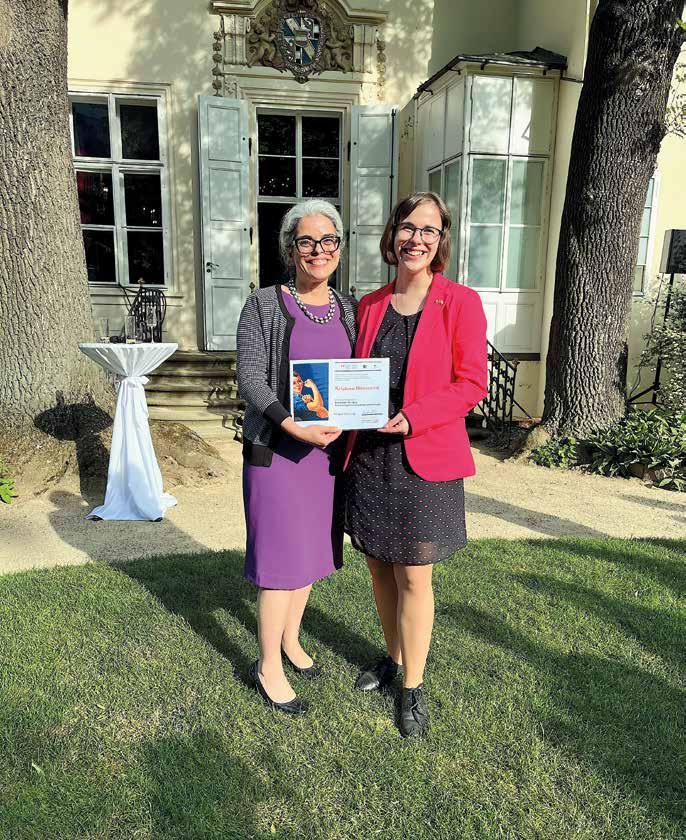
As the three Ambassadors-for-a-day continue their individual pursuits, they now have the experience of a lifetime, including contacts, informative discussions, and learning tools to aid them in their future careers.
“I’m so grateful. It was really interesting for me, and I will never stop being grateful for this opportunity,” Němcová stated.
Last year, 21% of all Czech holiday flights were headed for Egyptian destinations. The number of those who buy apartments in places like Hurghada is growing too. “We are very much pleased to see the increasing number of Czech tourists coming to different destinations in Egypt,” says H.E. Mr. Mahmoud Mostafa Afifi, Ambassador of Egypt, confirming this data. What is the role of the “three S’s” in Egypt’s popularity among Czech tourists? Where does the Ambassador feel the extra pressure of representing his country? The answers to these questions – and more – await you in our interview.
Can you tell us what made you become an Ambassador?
I was showing since a very young age a great interest in following international politics, as well as what is going on in the world of diplomacy. I was following the specialized news and reading about global affairs since I was a child. That is why I took the path of studying international politics and economics, in order to also academically prepare myself for this job.
I believe that I made a good career decision for myself. By now, I have been working for the Ministry of Foreign Affairs of the Arab Republic of Egypt for 29 years. I hold degrees in politics, international relations, and law. I have two children, and I even find time for my hobbies, which are reading, sports, and travelling.
You have been representing your country in the Czech Republic for less than a year. Can you share some of your impressions so far?
Before coming to the Czech Republic, I served in three countries: Gabon, the United Kingdom, and to Egypt´s mission to the UN in Geneva, in addition to working as the Official Spokesperson of the League of Arab States in Cairo. I had very good impressions of the Czech Republic even before arriving here as an Ambassador, especially because I had visited the country as a tourist a few times, so I always knew how beautiful and culturally rich the country was.
When assuming my position as an Ambassador, I also found the politics of the country to be interesting and vibrant. Of course, I had to take some time to understand the local culture and the society, given that it is someway different from my country and the places I had worked in before. However, this is usual for any new Ambassador,
understanding how things work on different levels in his new posting, and getting to know the people and their customs after arriving in the country.
What is the most difficult part of being an ambassador?
The Ambassador is a significant part of the image of his country, so you always have to be watchful of your actions, the way you deal with people, the way you talk. Many times, you also have to sacrifice your personal life for the sake of your official engagements. You have to contain different situations and problems, to find solutions, and to be able at the same time to build good channels and connections in the country you work in, aiming to serve your country in the best possible way and enriching the bilateral relations between your country and the one you are accredited to.
The current relations are excellent and growing in solid steps. This does not come as a surprise, because the relationship between the two countries is historic as the diplomatic relations started over one hundred years ago, so it is very well established. The countries have supported each other in different situations. Currently, there are very good political relations, the commercial balance is increasing on both sides, investments also from the two sides are seeing significant advancement, and tourism is working very well. On the cultural level, we have been seeing very good development in recent years, and I note in this context the excellent work of the Czech archaeological mission in Egypt, which met significant success, as well as organizing the very successful exhibition “The Kings of the Sun” in 2020, held in the National Museum in Prague.
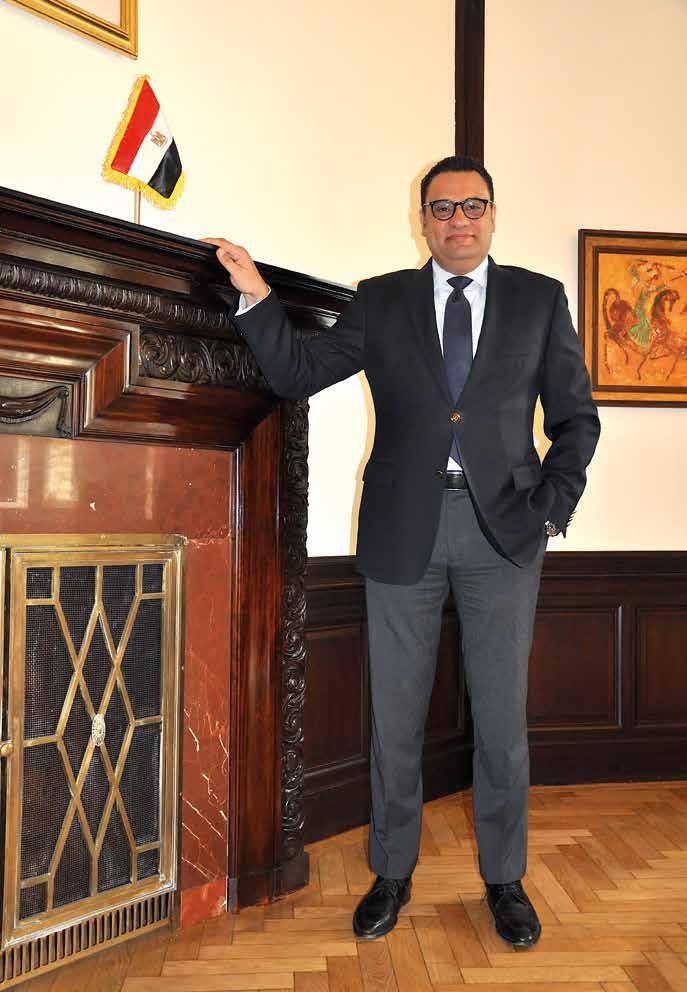
You mentioned very strong tourist relations. Can you expand on this idea a bit?
Czechia is currently the third market for tourism in Egypt, and the first market per capita, which is something that makes both sides happy. We are very much pleased to see the increasing number of Czech tourists coming to different destinations in Egypt. We tend to offer Czech people extensive information about tourism in Egypt to suit what they are looking for, including of course info relating to sea resorts, especially the Red Sea, which have a special appeal to the Czech market, since Czechia is a landlocked country. We have this promotion based on what we call the “three S’s”: sun, sand, and sea, and we always work to meet this level of expectation of the Czech people, while taking into consideration the tremendous steps and efforts Egypt exerted in recents to expand, diversify and promote the tourism sector.
Egypt has one of the longest histories of any country. Is that what makes you an important player?
Whenever the word Egypt is mentioned, people always think firstly about our great ancient civilization. That puts an important responsibility on the shoulders of the representatives of this country. This reputation has to be met by showing how rich and deep the Egyptian civilization is. At the same time, and coming to modern time, Egypt is a country which has significant leverage on both the
regional and international levels. Egypt is an Arab, African and Mediterranean country at the crossroads of different parts of the world and a very close neighbour to Europe. It has always maintained solid, friendly and diversified relations with other countries, as well as a longstanding policy of non-aggression and peaceful coexistence with the goal of maintaining stability and security and seeking the welfare of all people. So, it is also important to talk about modern Egypt, and the major developments taking place, especially in the fields of modernization of the economy and the society. We present our country, not only as an ancient civilization, but also as a modernized young country with a solid established institutional structure, motivated society, energized economy and a bright future with great potential in different fields.
This interview is done on the occasion of your national day. What are you wishing for your country? And for the Czech Republic?
I wish both countries further progress, and to remain in the highest level of countries respected before anything else for their solid principles. I also hope that the current close friendship and cooperation between Egypt and the Czech Republic continues to grow in all fields and aspects, and that our partnership will reach new levels for the benefit of the friendly people of the two countries.
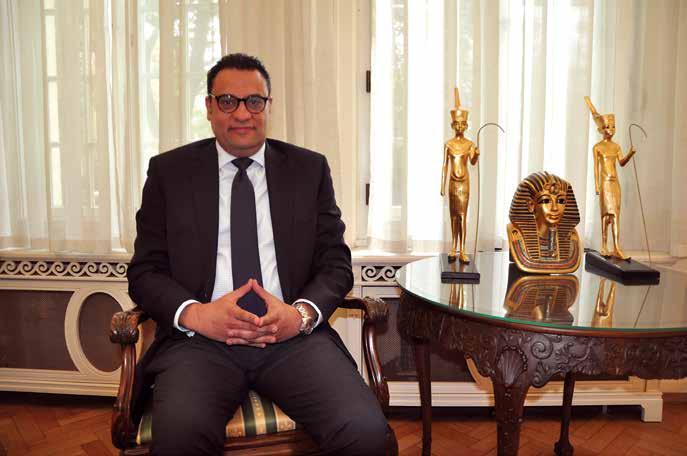
A grateful goodbye from H.E. Mrs. Phasporn Sangasubana,
Ambassador of Thailand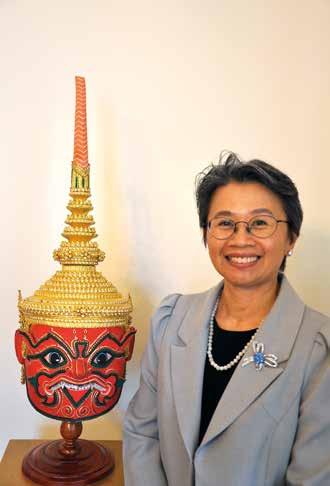

Dear readers,

I have been a big fan of the Czech Leaders Magazine for the past two years. And as I already said before, I appreciate the Czech Republic for its beauty (in historical, cultural, and natural aspects), and for the good and hospitable nature of its people. During my 35 years of service in the Ministry of Foreign Affairs of Thailand, I have been posted in six countries. I am very happy it is the Czech Republic where I have served my last posting before retirement.
As I am entering a new chapter of my life in Bangkok, I have also left behind the Czech Republic, which has been my second home. However, I will carry with me the good memories of ‚treasures‘ that I did not obtain anywhere except here – like attempting the language with Czech locals and getting ‘different’ results, freshening up after a long hard-working day by walking among the greens in Prague, and trying to walk in my new hiking boots in a straight line up the natural beauties in the country.
Thank you for the positive memories. If you missed me, please do travel to Thailand and be one of the exciting number of 100,000 Czech tourists in 2023, and continue to follow the Czech Leaders Magazine.
Phasporn Sangasubana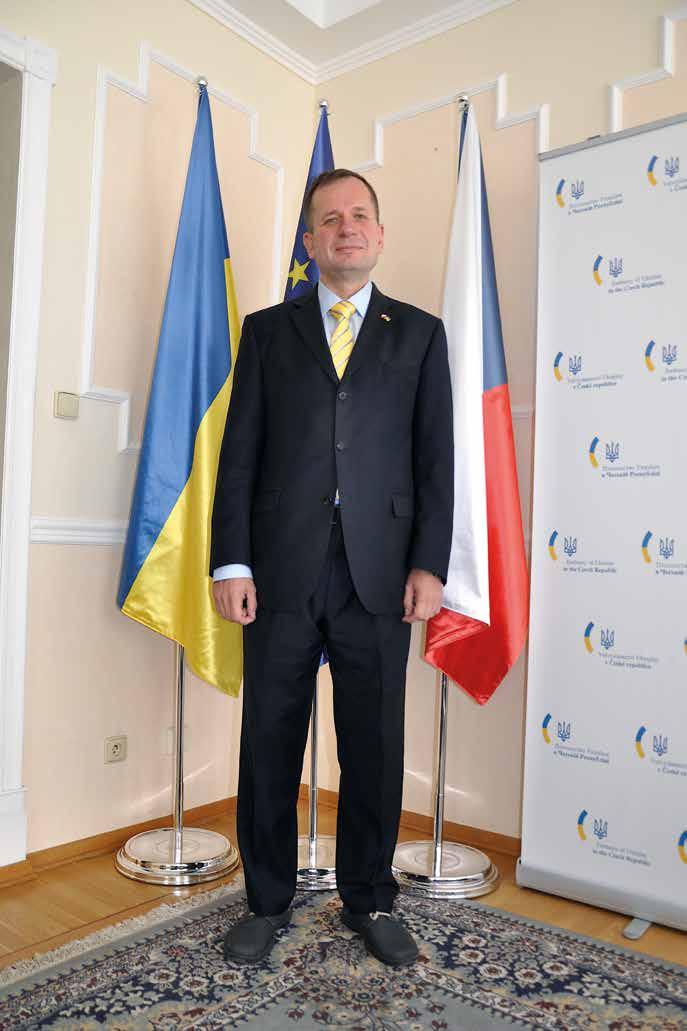
A second-generation career diplomat with a degree in International Law, JUDr. Vitalii Usatyi became the head of the Ukrainian Embassy in the Czech Republic in August 2022. He spoke to us about how the Russian enemy sought to destroy them, but Ukraine had only become more united. “Every meter of our liberated land is taken with the blood of our soldiers. This is the real Ukraine. Ukraine has changed. We will never be the same, and we will never let anyone force us to do something against our will,” he says and immediately adds, “Me personally, and the whole of the Ukraine, will always remember and appreciate everything that the friendly Czech people have done in the name of our common Victory over the Russian enemy.”
You have taken on the duties of the head of the Ukrainian Embassy in the Czech Republic since August 2022. Can you briefly describe your professional background leading up to your current role?
I am a second-generation career diplomat. After obtaining my degree in International Law at the Institute of International Relations of Taras Shevchenko National University in Kyiv, I started working in the Legal Department of the Ministry of Foreign Affairs of Ukraine. Over time, I worked my way up from a specialist of the Legal Department of the Ministry of Foreign Affairs of Ukraine to the Director General of Legal Affairs Department of the Ministry of Foreign Affairs of Ukraine. I am still thankful to fate, and to my former supervisors –who saw my potential and desire to work in diplomacy and had taught me a lot.
I served as Vice-Consul at the Consulate General of Ukraine in Prešov, Slovak Republic, and as Deputy Ambassador at the Ukrainian Embassy to the Slovak Republic. Since August 2022, I have taken on the duties of Chargé d’Affaires of Ukraine in the Czech Republic.
Do you recall your first impression of Czechia upon your arrival?
Actually, I have been working in the Czech Republic since April 2022. Before that, I worked in Slovakia for a long time, and visited the Czech Republic many times, so the country was not new to me.
However, my first impressions while visiting the Czech Republic during the Russian full-scale invasion were of tremendous support, assistance, and solidarity with Ukraine and our people. This support was evident at every step, from the highest state authorities to ordinary Czech citizens who tried to help us in every way possible, and constantly emphasizing that we were fighting for them too. The Czech people showed themselves to be true brothers and sisters with a good historical memory, drawing lessons from the Russian occupation in 1968.
In my free time, which is very limited, I try to learn more about the Czech Republic, its rich culture, language, traditions, nature, and everything that this wonderful fraternal country has to offer.
Sadly enough, talking about Ukraine these days means talking about war. How has the war impacted your country and its people?
Ukraine has always been a powerful European country, and has now become resilient. It has become a symbol of courage for the entire civilized world. Before the fullscale Russian invasion of Ukraine, we have unfortunately been often compared to each other, but now the world knows Ukraine.
The blue-yellow flags fly high as a sign of support for life, and for the condemnation of the death always brought by Russia. The Russian enemy sought to ruin us, but Ukraine has only become more united. We have
never been so unified as during the last year and a half. They daily destroy our infrastructure, civil houses, kindergartens, schools, and monuments, but they will never break our spirit. The phrase “Better to be with no light and warmth than with Russia” has become our motto during the attacks on our energy system. Ukraine has become the centre of our continent, where values are defended, freedom is protected, and Europe’s future is being written.
When the Russian troops broke into Ukraine, many people were afraid that we could not resist for a long time. But it never happened. Our people’s courage stunned the world. Our people stop the tanks with their bare hands, our farmers are harvesting under shelling, and our people save each other by risking their own lives. Every meter of our liberated land is taken with the blood of our soldiers. This is the real Ukraine. The life of every person is important to us. We are a nation that believes in victory, and which surely goes for it. Ukraine has changed. We will never be the same, and we will never let anyone force us to do something against our will.
As you said, Europe’s future is being written now in Ukraine, which is fighting for its life. Do you feel a lot of support from the Czech people?
We have felt tremendous support from the Czech people from the very beginning of the full-scale Russian invasion. Czech people have provided a massive amount of humanitarian aid for Ukrainians who were forced to leave their homes and seek safety from the Russian bombings. Czech families have opened their homes to host our women and children. Many Ukrainian adaptation centres, centres for assistance to Ukrainians, language courses, and psychological support centres were established. Well-known Czech initiatives have fundraised to support the Ukrainian army, and there has been support from Czech citizens. After a recent visit to Prague, the President of Ukraine, Volodymyr Zelenskyy, and the Chairman of Verkhovna Rada of Ukraine, Ruslan Stefanchuk, were very pleasantly impressed by the great number of Ukrainian flags in the city.
A bright example of Czech support is an event that took place last year. Czech society has a good historical memory. 55 years ago, on the night of August 20th-21st, the territory of Czechoslovakia was occupied by the troops of the Warsaw Pact, ending the hopes of Czech and Slovak people for a free democratic life. Czechs and
Slovaks, who themselves experienced the occupation in 1968, understand today’s tragedy of the Ukrainian people, who are resisting the Russian aggression, very well. As a part of the commemoration of this anniversary in Czechia in August 2022, a spontaneous ‘flashmob’ was held called “Let’s transfer 1968 Crowns to the Ukrainian military”. 14,000 people took part in this action, and 24.2 million CZK were transferred to the charity account of the Embassy. We are also very grateful to Czech citizens and legal entities for their donations on the eve of August 21st this year.
Me personally, and the whole of the Ukraine, will always remember and appreciate everything that friendly Czech people have done in the name of our common victory over the Russian enemy.
The Ukrainian community in Czechia has grown a lot since the invasion began. Do you work together?
Yes, I am in constant contact with the representatives of the Ukrainian community in the Czech Republic. The Ukrainian community has established a wide network of organizations, particularly in Prague, Brno, Hradec Králové, Chomutov, Liberec, and Karlovy Vary. We hold regular organizational meetings with the heads of Ukrainian organizations to coordinate our joint plans, events, and efforts. Since the full-scale Russian invasion, the new Ukrainian organizations have appeared in the Czech Republic, and they have been actively engaged and have collaborated with the Czech Republic, for which we are very grateful to the Czech people.
Your country wants to join the EU and NATO. What are the benefits of joining both? Do you feel supported in that?
Ukrainians are currently making a great contribution to the safety of the European continent. Thanks to the heroism of Ukrainian defenders, as well as international support, Ukraine has not only withstood the blow but also conducts successful operations to liberate the occupied territories.
As we can see, only uncertainty provokes Russia. In 2014, when Russia occupied Crimea and started a war in Donbas, Ukraine was officially a non-aligned country, which did not help to keep Russia from showing aggression. Progress towards Ukraine’s accession to NATO, as well as European integration, will force Russia to stop the aggression. The accession of our country to
NATO will guarantee the strategic safety of the whole Alliance, as well as guaranteeing peace in Europe.
The support is well felt. The Czech Republic fully supports Ukraine’s acquisition of full membership in the European Union and NATO, including the accelerated procedure.
Since the beginning of the full-scale invasion of the Russian Federation into Ukraine, the Czech Republic has taken a long number of steps to support your country and its people. Can you tell us how you perceive the current status of CzechUkrainian relations?
The Czech Republic is our reliable friend and partner. Since the beginning of the full-scale invasion of the Russian Federation into Ukraine, the Czech Republic has become one of Ukraine’s closest partners in Europe, which provides comprehensive and diverse political, economic, military-technical, and humanitarian assistance to Ukraine in its fight against Russian aggression, taking leading positions in the EU in certain areas.
Support for Ukraine, its reforms, and European choice is declared in the program documents of the Czech government. On 1st March 2023, the Government of the Czech Republic approved the changes to the program of its activities, which were due to the fullscale Russian aggression against Ukraine and the economic consequences caused by it. Special attention in the renewed program is given to Ukraine, where it is specifically mentioned that the Czech Republic will make the necessary efforts to create a Special Tribunal to punish the crime of Russian aggression. It also specifically mentioned that it will take an active part in the postwar reconstruction of our state, which should not only be a restoration but also a general modernization, with the aim of integrating Ukraine into the European Union and NATO. The Czech Republic fully supported and co-authored of the resolutions regarding Ukraine within the framework of the UN General Assembly. The Czech Republic consistently supports the continuation and strengthening of personal and sectorial sanctions against the Russian Federation at the EU level.
Since the beginning of the full-scale invasion of the Russian Federation into Ukraine, the Parliament of the Czech Republic has adopted a number of important resolutions in the interests of our country. The Czech Republic provided shelter to more than
520,000 temporarily displaced persons from Ukraine. We are grateful to the Czech government for its quick reaction, and for its condemnation of the actions of the Russian Federation regarding the withdrawal from the “grain agreement”.
The export of grain from Ukraine, mainly to Africa and the Middle East, is crucial, and there has been a lot of effort invested in securing further export. How has the Czech Republic been involved? The support of the Czech Republic for further implementing Ukrainian President Volodymyr Zelenskyy’s initiative “Grain from Ukraine”, regarding the export of grain to the countries of Africa and the Middle East, is critical.
The Czech side took part in the International Founding Summit “International Summit on Food Security” (November 26th, 2022, Kyiv), and joined the Joint Statement based on the results of this event. The financial contribution of the Czech Republic amounted to 2 million CZK (85,000 US Dollars). In December 2022, the President of Ukraine sent a letter of thanks to the Prime Minister of the Czech Republic, Mr Fiala, for the Czech Republic’s participation in the International Summit on Food Security, and for its support for the “Grain from Ukraine” initiative.
On 21st April 2023 and 9th May 2023, telephone conversations between the Minister of Agrarian Policy and Food of Ukraine and the Minister of Agriculture of the Czech Republic took place, during which the Czech side confirmed its readiness to facilitate the further export of Ukrainian grain.
We are grateful to the Czech government for its quick reaction and condemnation of the actions of the Russian Federation regarding the withdrawal from the “grain agreement”. The Russian Federation’s violation of international obligations and regular cynical attacks on Ukrainian port infrastructure, means of navigation support, and grain terminals confirm that the Russian Federation is a terrorist state, whose actions lead to an increase in world prices and food shortages, as well as the suffering of millions of people – particularly in Africa and the Middle East. Currently, there is an obvious need to consolidate the further steps of the EU states and the international community in general regarding the further implementation of the “Grain from Ukraine” program,
“Since the beginning of the full-scale invasion of the Russian Federation into Ukraine, the Parliament of the Czech Republic has adopted a number of important resolutions in the interest of our country,” JUDr. Vitalii Usatyi, Chargé d‘affaires a.i. of Ukraine, provides us with this list.
24.01.22 The Chamber of Deputies (low chamber) of the Parliament of the Czech Republic adopted a resolution condemning Russia’s military aggression against Ukraine.
25.02.2022 The Senate also adopted a corresponding resolution “Regarding the Russian invasion into Ukraine”.
05.04.2022 The Chamber of Deputies unanimously adopted the resolution “Regarding the condemnation of war crimes committed by the Russian army on the territory of Ukraine”.
04.07.2022 The Senate adopted a similar resolution.
06.04.2022 The Chamber of Deputies unanimously adopted a resolution recognizing the Holodomor in Ukraine in 1932-33 as genocide of the Ukrainian people.
11.05.2022 The Senate adopted a resolution “Regarding support to Ukraine”.
15.06.2022 The Senate and the Chamber of Deputies adopted two resolutions “Regarding the speech of the President of Ukraine Volodymyr Zelenskyy to members of the Senate” and “Supporting the territorial integrity of Ukraine and condemning the military aggression of the Russian Federation”.
02.10.2022 The President of the Czech Republic Miloš Zeman signed the joint statement of the Presidents of Estonia, Latvia, Lithuania, the Czech Republic, Poland, Montenegro, Romania, North Macedonia, and Slovakia regarding Russia’s attempts to annex Ukrainian territories.
15.11.2022 The Chamber of Deputies adopted a resolution “Regarding the escalation of Russian aggression against Ukraine, crimes against Ukrainian civil population, and support for the creation of a special international criminal tribunal to investigate war crimes committed by the armed forces and power structures of the Russian Federation”, which recognized the Russian regime as a terrorist.
14.12.2022 The Senate adopted a resolution “Regarding the genocide of the Ukrainian people during the Holodomor, organized by the Stalin regime of the Soviet Union in 1932-33”.
15.02.2023 The Senate adopted the resolution “Regarding the Russian aggression against Ukraine”, in which the Russian aggression against Ukraine was again condemned and the necessity of the establishment of an international tribunal for investigation of the crimes of aggression committed by senior officials of the Russian Federation against Ukraine was declared.
31.05.2023 The Senate adopted the resolution “Regarding preparations for the NATO Summit in Vilnius in July 2023”, in which it called for deepening Ukraine’s integration into NATO structures even before the official start of the process of our country’s accession to the North Atlantic Alliance, support for Ukraine’s acquisition of NATO membership as soon as possible, as well as the continuation of supply of weapons and military equipment to Ukraine in coordination with allies among NATO member states.
All of these demonstrate the unwavering support of the Czech Republic for Ukraine.
and to ensure the smooth creation and functioning of a humanitarian maritime corridor in the Black Sea.
Ukraine immediately initiated consultations with its international partners regarding an appropriate response to the unilateral and aggressive actions of the Russian Federation.
Ukraine is extremely grateful to the President of the Czech Republic Peter Pavel, to the Government of the Czech Republic, the Senate of the Parliament of
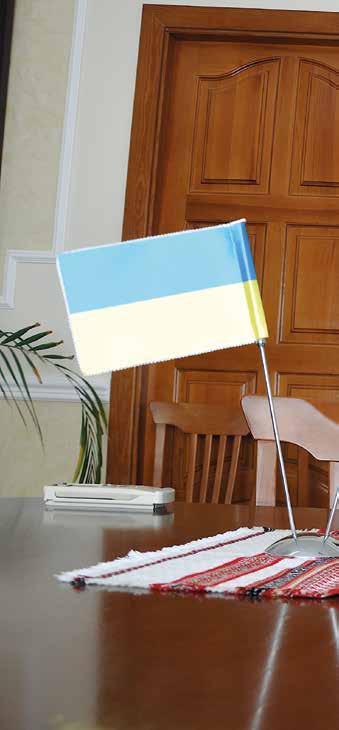
the Czech Republic, the Chamber of Deputies of the Parliament of the Czech Republic, and all the citizens of this powerful country for all you have done, and for the fact that you stand for Ukraine and on the side of truth.
This interview is done on the occasion of the Independence Day of Ukraine, which you celebrate on 24th August in commemoration of gaining independence in 1991, when the Soviet Union dissolved. Please, feel free to express your wishes on this special occasion.
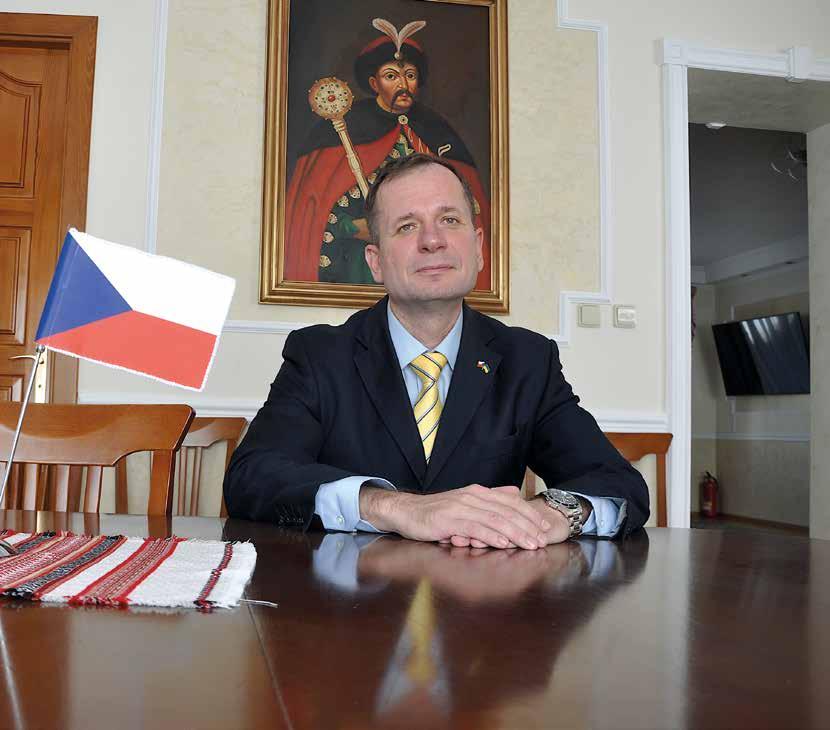
Ukrainians now wish each other the most cherished victory over the Russian occupiers. These wishes are
heard every day, every minute. In addition, I would like to wish for strength and endurance, and for us to always remember that we stand on the side of truth and justice. We know what we are fighting for, and we have a lot to fight for.
To the dear Czech Republic, I would like to wish patience and faith in our common victory, which will surely come, and that you will never feel what we have felt. We are going through this struggle together, and together we are holding the defence of the entire European continent.
JUDr. Vitalii Usatyi, Charge d’Affaires of Ukraine in the Czech RepublicThe future is happening now. You too can experience that refreshing feeling of taking the path nobody has ever tried before. If you like freedom and trying new things, this article has something for you: you will learn about the GR1T Pioneer, an ultralight, fully electric dirt bike engineered for peak performance.
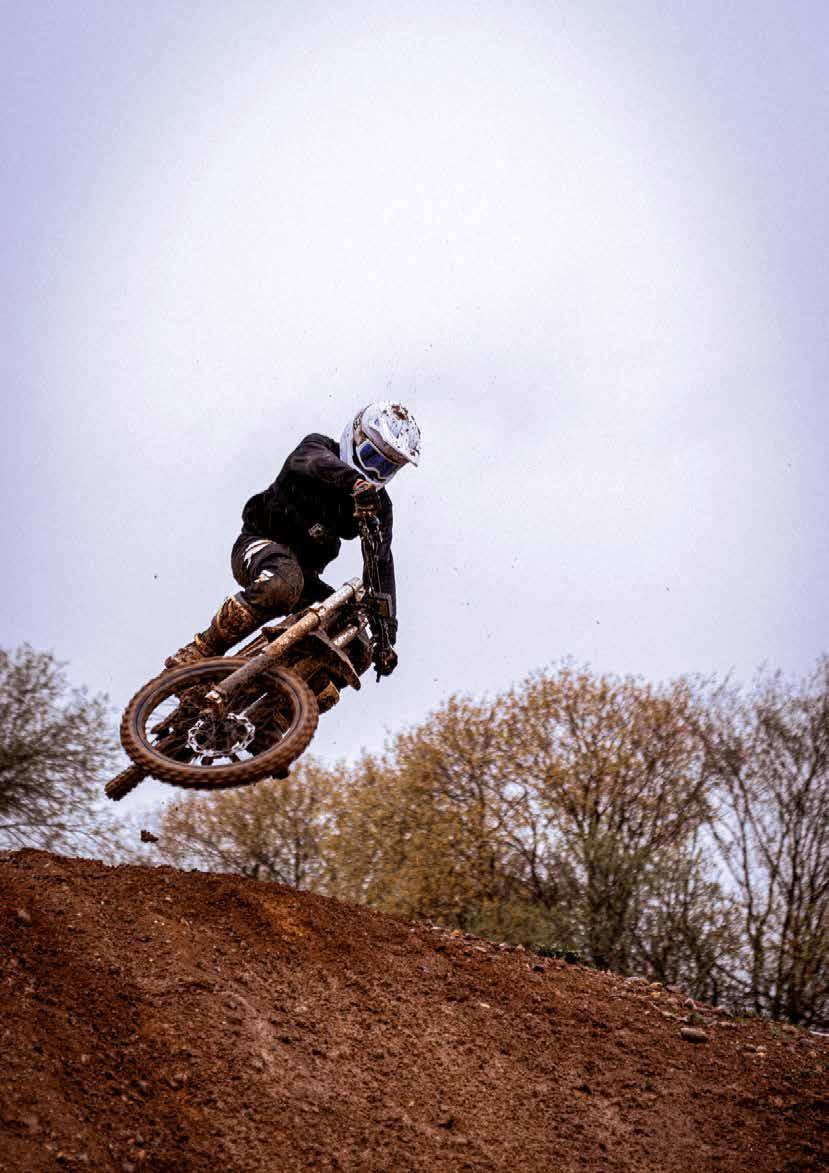
BEST-IN-CLASS POWER-TOWEIGHT RATIO
– 60 kg (47kg without battery)
– 100 km/h max. velocity
– 60–100km range (depending on usage)
– 2,2 kWh (45Ah x 48V) removable battery
– 15 kW/20kW peak power options
– 160 kg max. payload
GR1T Pioneer Jan Brabec,a young Czech motocrosser with a passion for this sport and a desire to keep trying new things and challenging himself. He won his first masters title three years after getting his first BMX bike at the age of four. He learned from Casey Johnson, and motocross legend Jeremy McGrath in California, USA. Besides winning several home titles, he also competed in several world championships for foreign teams, e.g. Italian SRS Honda and Dutch Boersfoon Suzuki.
We love the quality. And the Germans are famous for looking into the smallest details. That’s why the fact that a vehicle was designed and constructed in Germany, in partnership with a leading German motorcycle manufacturer with a 40-year-long presence on the global market, sounds quite appealing to us.
The GR1T Pioneer is made to be durable and robust. According to the producers, “the aim was to craft the world’s best electric motorcycle”. Were they successful? The results of the tests, taken under extreme conditions on the motocross track, speak clearly. The goal was not only met but even surpassed.
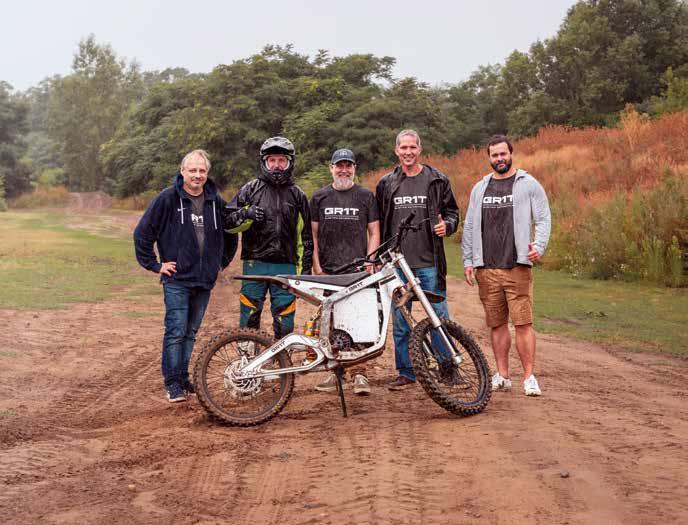
At times, when the legislation makes the lives of fossil fuels vehicles ever more and more difficult, the electric Pioneer smoothly flows with this stream of change.
The team of professionals who gained their expertise at BMW Motorrad and Triumph have put all their skills towards the creation of a unique and viable motorcycle that is not only politically correct and reliable, but, most of all, it’s fun to ride.
“I absolutely love it! I was sceptical at first because of my past experiences with competing brands, but the Pioneer is different. I love the frame and balance of
the bike. It fits perfectly with my riding style. It’s super smooth. This was by far the best electric motorcycle that I have tested. If I had treated other bikes the way I treated the Pioneer, they would’ve broken in half!” superlatively says Jan Brabec, a successful Czech motocrosser who has competed in the Dakar rally six times and won the Czech Motocross Champion title ten times.
The best thing about the Pioneer is its innovative frame. The total weight, including the battery, is 60kg, which makes it extremely balanced and comfortable to handle. The Pioneer even outpaced Brabec’s 450cc motocross bike on certain parts of the track!
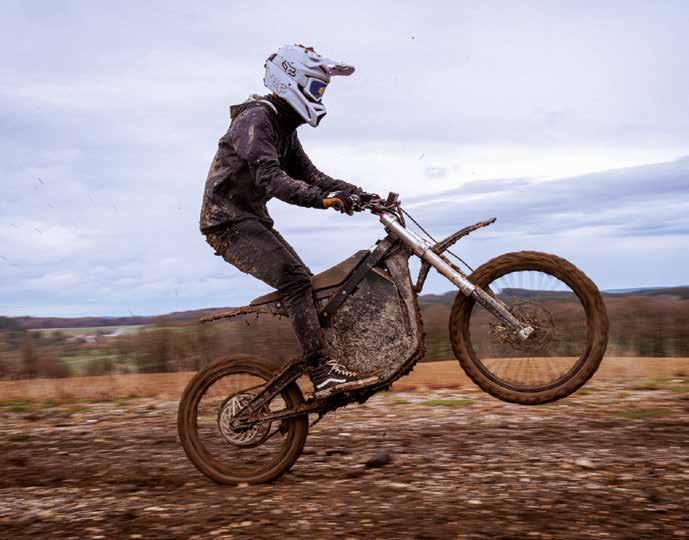
The plans are also underway to unveil a street version of the Pioneer, designed for the urban jungle. This street version will offer a modern design, digital connectivity, and a lower power output. You will be able to ride this variant with a standard A1 car licence in Europe, with no need for a special motorcycle licence. Minor adjustments to the bodywork and the addition of accessories can create unique looks and applications, which is a feature meeting the current desire of people to express their individuality.
The vision of the creators goes further in developing a digital ecosystem, enabling the Pioneer to integrate with riders’ smartphones via iOS or Android apps. The on-board display appearance can be personalised, and videos can be recorded, as well as accessed and shared on social media platforms. For those who want even more, there can be paid-for programs, e.g. downloading your preferred engine sound. There can also be versions made to suit the needs of special services like the armed forces, police, firefighters, and park rangers.
Pre-sales of the offroad “Pioneer PRO” model are planned to begin in the Autumn of 2023, with a limited Founder’s Edition of just 100 units. Each Pioneer will be numbered and etched with the owner’s name, adding a personal touch to the ride. Early supporters will be rewarded with branded gear and lifetime benefits. The company intends to begin delivery of the pre-sold motorcycles in the first half of 2024. To get more information and reserve your Pioneer, visit GR1T’s website www.gritmotors.com. Have a great ride!
As one of the first branches of the organization, UNIC Prague was founded in 1947, only two years after the United Nations was established. “Growing up in the unfree, undemocratic regime I had always dreamt of an open international arena,” says Michal Broža, Head of UNIC Prague. “The UN is the only universal global multilateral mechanism the world has to solve the problems that are too big for one country, and for any coalition of countries. I am proud to serve the international community. I consider it a privilege and am grateful that I can do such a job.”
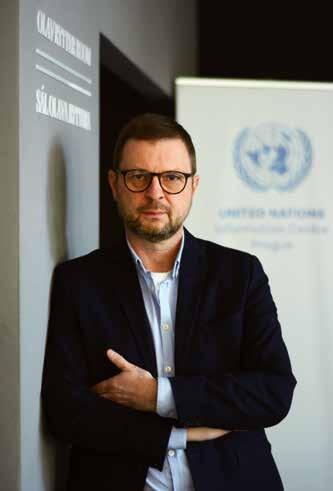
Who is Michal Broža? Tell us about yourself.
I am a father of two. For me, it is perhaps the most important thing to start with. I am a Czech national in the international service. A proud European, and an Earthling. What makes me feel happy is my family, the beauty of the natural world, rich culture, and provoking art. My concerns include the state and the prospects of the Earth’s climate, injustice, and undemocratic rules. What I believe humanity must struggle for is freedom, the rule of law, a healthy environment, good education for all, decent jobs and incomes, rights of every single individual, and, indeed, peace.
My job includes public diplomacy, but my role could be better described as international civil service. Joining the UN was not necessarily a dream job. Growing up in the unfree, undemocratic regime, I had always dreamt of an open international arena, about different and often distant cultures. I was keen to explore the world’s diversity. Not to be told what was right and what was wrong, but to find out myself. When my first UN job vacancy appeared, the war in the former Yugoslavia was in full swing. The UN was high on the agenda, many believed the UN was here to solve the war. The UN was receiving some praise, and lots of criticism. Becoming part of the global body seemed to me a great challenge, and a pretty cool thing. It was big, global, and based on the best of human values, but also quite controversial for the complexity and the number of different interests projected into world affairs. My role was to communicate, explain, and advocate for the United Nations. Quite a challenge, and quite an important thing for the world, I thought.
The United Nations was founded in 1945, 78 years ago. Is it still relevant today?
“The United Nations was not created to bring humanity to heaven but to save it from hell.” This famous quote from the
second UN Secretary-General, Dag Hammarskjöld, is as valid today as it was then. President JFK called Dag Hammarskjöld the greatest statesman of the 20th century. The older the UN gets, the more obvious it seems to have it. But also, the less we tend to care about it, and the more we tend to criticize it. However, regardless of its age, the UN is the only universal global multilateral mechanism the world has to solve the problems that are too big for one country, and for any coalition of countries. The problems that do not respect national borders.
The question should rather be: is it still needed? Goodness yes! Look at the length of human history. The UN is actually 78 years young. Sure, it is imperfect. Sure, it could and should be reformed, improved, modernized, and made better and more responsive. Yes. But let’s be honest. The world is maybe quite restless now, full of multiple crises. But it used to be a far more hostile place before the UN was created. The progress humanity has made through the system of UN cooperation is enormous.
Major crises like the Russian war against Ukraine, the COVID-19 pandemic, the climate emergency, and others highlight a paradox of global (non)governance. Look at the meetings at the UN. Many world leaders know what the major global problems are. They name them, speak about them, and about the need to solve them. But in reality, too many of these problems remain untouched, or are inadequately addressed.
Climate change. And not only climate change. UN Chief António Guterres says there are two major reasons for that. 1. Foreign policy of states remains an extended arm of domestic politics. 2. The world has outdated and weak global institutions, including the United Nations, the Security Council, the WHO, and the international financial system. Did you know that, when borrowing at international financial markets, interest rates are up to 8 times (!) higher for the poorest countries than they are for developed countries? It is unfair, and it is bad for everyone – including the rich part of the world. We simply need a more collaborative and fairer international system, based on the rule of international law. This is because “more than ever before in human history, we share a common destiny. We can master it only if we face it together. And that, my friends, is why we have the United Nations.” I borrowed this quote from the former UN Secretary-General Kofi Annan. I was lucky to have had a chance to work with him, and to personally meet him.
The United Nations is very well known globally. Is there anything people would not know about its activities?
Yes, I think the UN is quite well known, and the majority of
people know the fundamental facts about the UN, with many believing it is a good and useful institution. But that’s it. The knowledge and support for the UN is quite shallow. Many people usually associate the UN with only one major thing, based on their knowledge, or rather on their opinion. But the UN does so many things! – from peacekeeping operations and protecting the vulnerable, to organizing elections and protecting the environment. Most people probably do not know about the risky and complex operation the UN was recently undertaking in Yemen to prevent major environmental and social disaster, which would be caused by the largest oil spill in human history. Over one million barrels of oil were pumped from an old and decaying FSO Safer tanker stranded by war at Yemen’s shore. If left unattended, the tanker could explode or break. It would be a disaster of global dimensions. For years, no one was willing to take action in the country, which was devastated by a long conflict. It took two years of UN diplomatic and political work, technical preparations, and fundraising before the emergency operation could begin. Today, all of the oil has already been pumped into a replacement vessel. It is a story of cooperation, prevention, political mediation, ingenuity, and environmental management – demonstrating once again the indispensable role of the United Nations, as UN Chief António Guterres points out.
The United Nations office in Prague – which you are heading – has a long history. What are some interesting facts about its development throughout the years?
The UN has been in Prague since 1947. Only two years after its establishment, it opened its branch in Prague. It was thanks to, in particular, the engagement of then Foreign Minister of Czechoslovakia, Jan Masaryk, who had been very active when the UN foundations were being laid, and remained engaged when the UN actually started to operate. The founding fathers (yes, women’s role in society at that time was still pretty undervalued) of the UN were smart enough not to let the UN be headquartered somewhere far, risking the rest of the world remaining disengaged and uninformed about the global body, its goals, and activities. Therefore, a network of UN Information Centres (UNICs) was designed to serve as a bridge between the headquarters and its member states. Prague was one of the first on the list because Jan Masaryk pushed on all diplomatic fronts, including with the first UN Chief Trygve Lie. Norwegian diplomat, Slavist, translator, and journalist Olav Rytter was appointed the first Director of UNIC Prague. With the support of the Norwegian Embassy, we recently collected materials about Mr. Rytter, producing an information panel and leaflet about his professional achievements (including in the UN), and naming our
multipurpose room in the UN premises in Prague after him. This was done in order to remember the legacy of the UN official who laid the foundation of the UN presence in Prague.
The core mandate of the UN Information Office in Prague has remained unchanged until today. We are the voice of the UN in Czechia, communicating UN themes and priorities on social media, on the web, and through the traditional media, as well as through working with Czech institutions –the government, NGOs, schools, universities, and the private sector.
We have a broad range of issues to highlight. For many years, UNIC has been actively raising the issue of climate emergency. With our Czech science and NGO colleagues, we have presented all IPCC (Intergovernmental Panel on Climate Change) reports of the 5th, and most recently the 6th, Assessments Reports to the Czech public. In 2019,
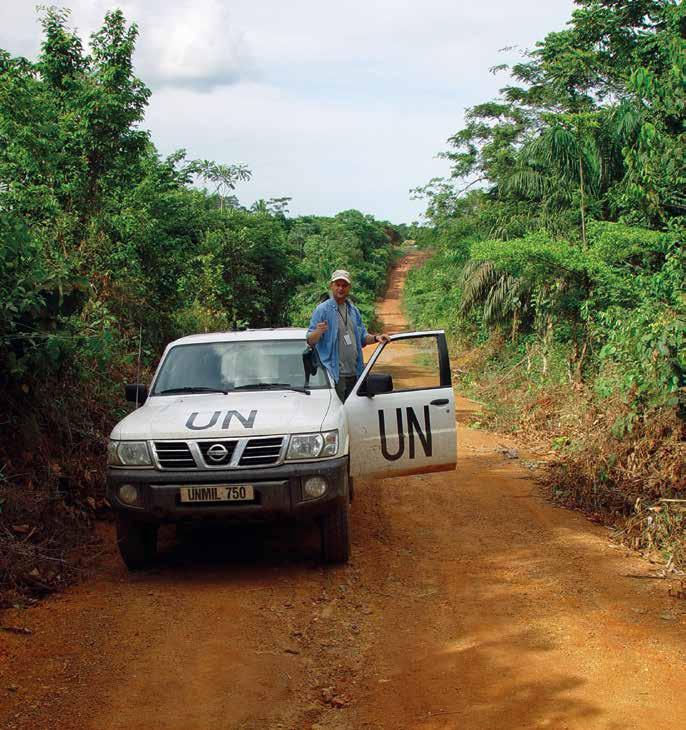
we started advocating for more climate communication in Czechia, and established the Climate Change Communication Prize. Since 2020, this project has been organised together with the Learned Society of the Czech Republic. Six climate science communicators have already been awarded, including two for their lifelong contribution. UNIC is also actively engaged in communication and awareness raising of issues related to human rights, including gender equality, the rights of the LGBTIQ+ community, issues of sustainable development (including biodiversity loss), education, health, circular economy, and, overall, the Sustainable Development Goals, UN’s top agenda for 2015-2030.
February 2022 saw a re-emergence of major conflict in Europe. Since day one, the United Nations has been using all of its means to prevent the escalation of the conflict. However, it has not been able to stop the war after the fullscale invasion of Russia in Ukraine.
The war in Ukraine has been a major issue in Czechia since the very beginning. Can you further explain the UN’s position and activities regarding the Russian invasion?
As I said before, the UN has been using all of its means to prevent the escalation of the conflict. However, the invasion, by one of the permanent members of the Security Council, prevents the United Nations from resolving the conflict through legal means, and according to the UN Charter. The Secretary-General and the entire UN system remain engaged, and are utilizing all its powers to recreate conditions that would open the space for peace negotiations. In the meantime, the UN’s main task is to mitigate the consequences of war on the people in Ukraine, and in the countries in the region where many seek safety. This includes Czechia, which belongs to the major providers of safe space and protection for refugees, as well as providing a wide range of assistance to Ukraine.
In the last decade of the last century, two UN agencies established a presence in Czechia: UNHCR and WHO. Also, the National Committee of UNICEF was established to fundraise and advocate for the UN Children’s Fund. In the same decade, the office of the International Organization for Migration (IOM) started to operate in Czechia (in 2016 IOM became part of the UN system).
Since 2022, the four Agencies’ presence in Czechia increased dramatically to support the Government’s response to the Ukraine refugee crisis. With the support of major donors, UNHCR, UNICEF, WHO, and IOM assist through implementing the Regional Refugee Response Plan. This plan aims to ensure refugees’ access to protection and assistance on a non-discriminatory basis, including the rights associated with temporary protection or similar legal statuses in host countries. Special attention is given to those refugees who are already, or are at risk of becoming, vulnerable. The work of these UN Agencies has been praised by the government, as well as the international donors.
Sometimes, and quite often in times of war, you have to think twice before saying things in public. As an international civil servant, I am responsible to the Secretary-General, and through him to the entire international community. In what I say, I represent the perspective of the United Nations, not my own. I do not comment on developments, I do not officially present my own attitudes and views. Therefore, for everything I officially say I need to know the position of the UN. And sometimes it is hard to find all the information needed from the UN system. What is also quite difficult for us, being posted in this part of the world, is the time difference from the UN Headquarters. While here in Europe we are already discussing emerging issues, New York is only just waking up, and it sometimes is too late for me to gather
all relevant information from the UN colleagues and entities. I work in an environment which is quite unique, truly international, and based on the values of the United Nations. Working for the UN requires skills, but also (specific) attitudes – including respect and understanding for diversity and equality. I am proud to serve the international community. I consider it a privilege, and am grateful that I can do such a job.
The best personal adventure has been raising my two daughters with my partner Pavla. As to the work, I had the privilege to serve in the UN Peacekeeping. In Liberia, I was able to witness the rise of the nation after a 15-yearlong civil war. Every day, I was able to see the uneasy life of ordinary Liberians and returning refugees, I met many former combatants, and worked with re-emerging media. On the other hand, I was in regular contact with senior UN colleagues, military personnel from all over the world, high officials of the country, visiting senior journalists from the world media, as well as world leaders coming to visit the country that just embarked for a difficult journey from conflict to peace.
I was recently visiting one of my Liberia UN colleagues in Stockholm. While I was the communications officer of the civilian mission, he was the spokesman of the military contingent. We recalled one of the big military inspections, in the rubber plantation not far from the capital of Monrovia. That was an area with a high concentration of former combatants, and rumours spread that there were still armed groups hiding. The operation indeed was quite interesting – or adventurous, if you wish. None of the rumours ever proved true.
Another adventure was the inauguration of the first postwar democratically elected President. Many world leaders arrived in Monrovia, including the First Lady of the United States. I was in the UN team covering the inauguration for the UN Radio, and with the means we had available at that time it was a great experience and adventure. It felt like being part of the history of that nation, and even today I still feel attached to Liberia.
There are many issues in this world that give me hard time. I have already mentioned climate change and the inability of the world to prevent it growing. The inability of the world to switch from talking to acting. Second, I think we – the people, governments, the media, education system and others should do far more and better against disinformation that nurture hate, racism and question very basic human values including justice, truth, solidarity and cooperation. And I am terribly disappointed that despite loving nature we – the people – love fossil fuels and the way of life based on consumption more. We need to better get along with our
natural world including ocean. And there is one concrete thing that makes me feel bad. The ever-growing number of cases of online fraud against women, most of whom live alone, by men pretending to be serving in UN missions – as a doctor, engineer, military etc. These are online “friendships” that always start with confidence building by the men, and then switch at a certain point to ‘confidence tricking’ in order to squeeze money from the women: 1. for being able to early retire from the UN, 2. to get UN permission for annual leave, 3. any other “credible” reason to “help” that person (and his/her associates) financially. My office receives several calls from these women nearly every week, trying to figure out whether the person actually exists, or why the UN has not yet let her friend go on annual leave after sending the required fees so many times. Sometimes, it is hard to make them believe that they were a victim of fraud. Or family members call us to find a way to help their mother, sister, etc. realize they were tricked. It is so unfair. The UN is misused as a credible and known institution, as most people know that the UN operates in uneasy situations. The “UN story” helps criminals build trust, only to later implement their criminal plan. We do our best to let people know that the UN never asks people for money to let their staff take annual leave, retire, or leave a mission etc. We also plead that people do not share their personal data online.
What does the free time of an international civil servant look like?
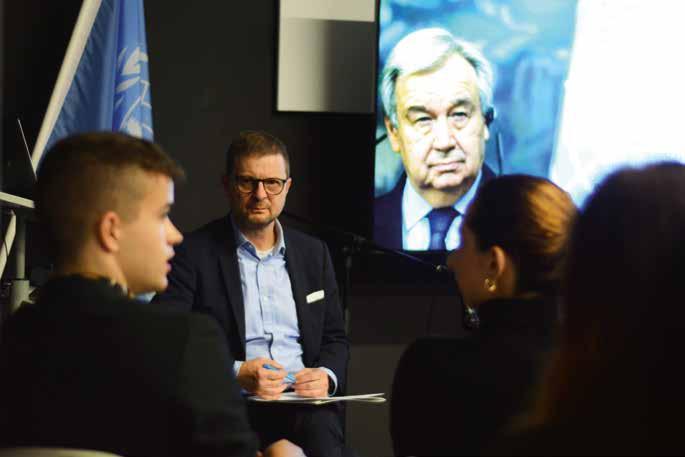
I already indicated I like to be with my family. I also read a lot about global affairs, as it is part of the job. I am very
interested and engaged in micro-mobility issues, as transport in cities has been one of the major things that touch our daily lives. I am a firm supporter of cycling as a mode of urban transport, and advocate for cycling infrastructure. After spending a long time in Amsterdam as a student, it is something I find quite natural.
I play concert guitar, but I do not play concerts. I am still too shy to perform, but I love playing old classical guitar pieces. I have the best teacher in the world, a Dutch guitar master living in Czechia.
I love skiing, hiking, and playing tennis. And I do what I can to help people in need. Lately, the people from Ukraine in particular. Not because they are from Ukraine, but because they are suffering. I feel the same for people from Syria, Sudan, Bangladesh... We need to continue showing solidarity. It doesn’t always need to be a big thing. Sometimes it is enough to smile at these people, tell them that we care, and shake hands. It damn helps.
To conclude, can you give a piece of advice to the young generation?
I would hesitate to call it advice, but please remain engaged in pushing for climate action. Please care for biodiversity, nature, and the environment. Use bikes instead of cars. Travel not for fun but for education, solidarity, understanding each other, and for helping other people, nature, and culture. Don’t give up on making the world a better place. And I will close with a favourite African saying: If you want to go fast, go alone; but if you want to go far, go together.
Karen Hendriks is an emerging Australian picture book author, with three books out in the world – ‘Go Away, Foxy Foxy’, ‘Feathers’, and ‘Home’. The inspiration for her last picture book ‘Home’ came from her grandmother’s sadness for the loss of her family home. “It’s about losing a home, finding a new one, but never forgetting the one you came from”, explains the writer.
My intuition answered the call of an old tapestry I will always remember my grandmother’s deep sadness for the loss of her family home. Her eyes held a longing.
I thought the house was lost because of the war, so many people lost everything. My grandmother had been an only child, and I think one day she thought that the home would have been a place she could always visit. One of my grandmother’s tapestries, of a snowy mountain home, is on my wall at home. Her sadness is something I will never forget. This was the inspiration for my picture book Home. It’s about losing a home, finding a new one, but never forgetting the one you came from.
When I decided to leave teaching and become a children’s author, my picture book Home is one of the very first stories I wrote. I am a person who writes from the heart first, and then the head follows that intuition. I worked hard on Home for over four years, and as my writing craft improved so did my story. Little did I know that this story was going to be a gift to me, and that it is still giving to me to this very day.
I discovered so many things about my mother’s family during this story’s journey, not because my mother shared the information but because it unfolded bit by bit as I gathered it myself. My mother had shown me an image of the small village that my grandmother
was born in, and where she was from. I had assumed it was in Germany. It was small, it snowed, and it was near mountains. This became the setting for my picture book Home.
I wrote about a young girl and her family’s journey after losing their home and then coming to Australia. I had always wondered why my grandmother could never return.
The question “why” would become the heart of my story. One day, while chatting to my mother, she shared the name of the village and one old photo. It struck me how beautiful the village was. I went searching and searching and searching but every way I turned nothing came up. I couldn’t understand why. Eventually, I discovered UK-based Sophie Dixon’s webpage. She uses all sorts of visual mediums to create stories. For her thesis, she had created a page about Wunschendorf. It was there that I discovered the village is now called Srbská, and is in Horní Řasnice in the Czech Republic. On Sophie’s site, I read stories about survivors from the village, and there were photos and some video recordings from people who are still alive and have a connection to it. I realised that my family had been Sudeten Germans.
This path led me to an understanding that any people who had Germanic heritage had to leave their homes
and could never return. This became woven into my picture book. Although my story is fictional, it does have those emotions and feelings. Along the way, I discovered that my great-grandfather, Julius Bohm, had been the deputy mayor of Wunschendorf. Julius had opposed Hitler in 1939, so even before World War II had started he was placed in the Dachau concentration camp, and was not allowed out until the war had well and truly finished.
During the time of writing my book, I did travel to Europe, before COVID-19, and visited Potsdam, where the Treaty was drawn up and signed. This is what changed the course of many people’s lives. Any person with Germanic heritage in Czechia, Poland, and Hungry had to leave their homes and return to Germany. Now I knew why my family could never return.
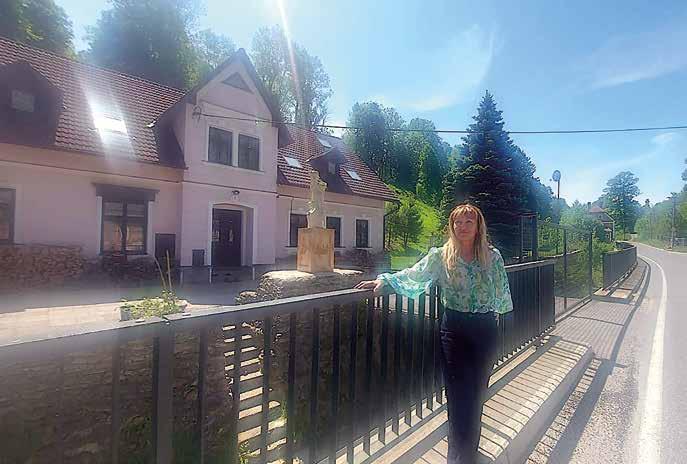
When my picture book received a contract to be published, I had to tell my mother about the story. I wondered and worried about what she would think.
She is very protective of my grandmother. Eventually, a week before my book was to be released, my mother read the story, and although she never says much, I was very happy that she liked it. Then, out of her mouth came the words that this had happened to her as a young baby. I had always assumed my mother was born in Germany. I now knew my mother had been born in Wunschendorf. My mother said this happened to my grandmother, her, and my greatgrandmother. The two women and my mother (as a young baby) had walked alone from the village into Germany.
At the beginning of this year, I decided to try and find the village and the house. I found Hanna online as a tour guide in Prague, and asked her if we could book her to take my husband and me into the mountains to try and find the village. With the information that I had given Hanna, she was confident we would find the village and the house. I was secretly excited and hopeful.
In June 2023, I arrived in Prague and fell in love with the city. On the day we were going to find the village, Hanna and her husband Robert arrived to pick us up from the Old Town. I think Hanna was as excited as I was about our quest. As we drove into Horní Řasnice, Hanna said, “We are not far from your village”. As the car slowed into the village she said, “Karen, look out for the house”. My husband Frank called out that he had found it. Hanna was certain too. We stopped and looked at the house from the road and the driveway. Yes, it did match the photo perfectly. Everyone was very excited. The house had been renovated, and was beautiful. From the house, I could see what was once the schoolhouse (now a residence) that my grandmother had attended. I was not quite certain that this was the right house. I had a feeling the house was connected to me, but that it wasn’t the one my mother had been born in. The others reassured me, but the feeling that it wasn’t quite right persisted.
We then decided to visit the mayor’s office, and this is where the story gets very interesting. We climbed the old staircase, and knocked on a wooden door. Hanna declared how lucky we were that the mayor was in his office that day. She explained that I was from Australia, and that I had found the house my mother and grandmother were born in. Everyone in the office became very excited and looked up the records. Yes, indeed it was the village and then the surprise grew even bigger: my family had lived in the village for 108 years, and originally the Bohm family members had owned eight houses in the village. And then another surprise came: two houses were still standing. We even rang my mother, and she was able to personally thank the mayor for helping me, thanks to Hanna translating. Before we went back to find the second house, the mayor kindly took us to see the village’s small church. It was historical and charming, and once inside I realised that this was the church where my grandmother had made her Holy Communion – I remembered from a photo my mother has. The mayor declared that I was one of them, and I smiled ear-to-ear and replied “Yes, I am.”
It also turns out that the mayor knows Sophie Dixon, and that she had lived in the village for five or six years. Now I knew why she recreated the village online. She has now left, but I did pass on a message from the mayor to her.
Then we went back to find the second home, and I knew the number of the house I was seeking. Hanna said that they often changed the house numbers
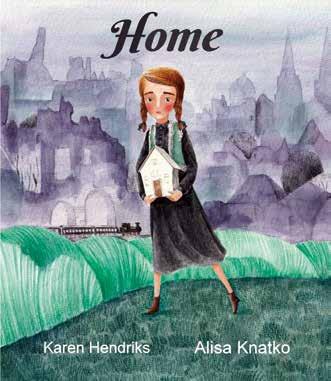
after the war, but the number 126 was the one I was looking for. As we went past the first house, just around the corner was a sweeping driveway with a letterbox numbered 126. There, right near the first house, was the house my mother and grandmother had been born in. The same as the other house, but a different colour, and not renovated. My heart was happy, and I am so filled with gratitude that this had happened. I had found two houses, not one. How incredible is that?
Now that I am back in Australia, I feel the pieces of the puzzle have come together. I love Australia and where I live by the sea, but a piece of me will always be at a snowy mountain village in the Czech Republic. Somehow, I belong there too. I understand so much more about my grandmother and her homesickness. I do hope to come back to Prague, and to visit the Friedland council to look at the birth and marriage certificates. I am so thankful for Hanna and Robert’s help, and that my story led me to making so many family discoveries.
is an emerging Australian picture book author with three books out in the world - Go Away, Foxy Foxy; Feathers; and Home. Foxy and Feathers were shortlisted in the Rubery International Book Awards. The Duchess of York shared Feathers on her YouTube channel. Feathers also received a Highly Commended at the ACT Notable Book Awards in Canberra, Australia. Recently, Feathers won an Australian Foreverability award. Home is listed on the Refugee Council of Australia’s webpage as a resource and is on the 2023 NSW Premiers Reading list as recommended reading for school students.
Currently, Karen is participating in The Inspire Series children’s book talks. This is with other Australian and international children’s authors. She also writes daily quotes for creatives on Instagram.
Karen lives on the New South Wales’ South Coast in Shellharbour, Australia. She’s always curious and loves to travel. Karen is currently self-publishing a local picture book and has just signed a new picture book contract.
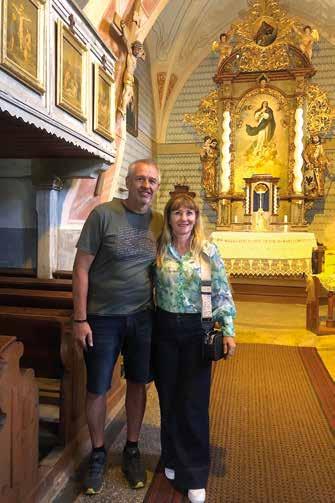
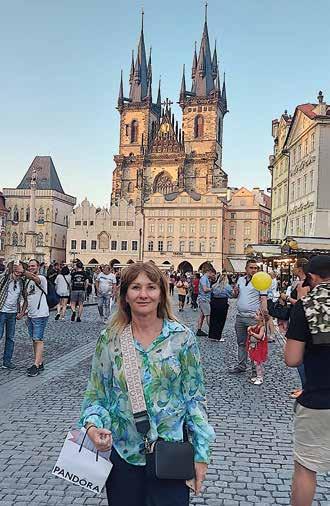
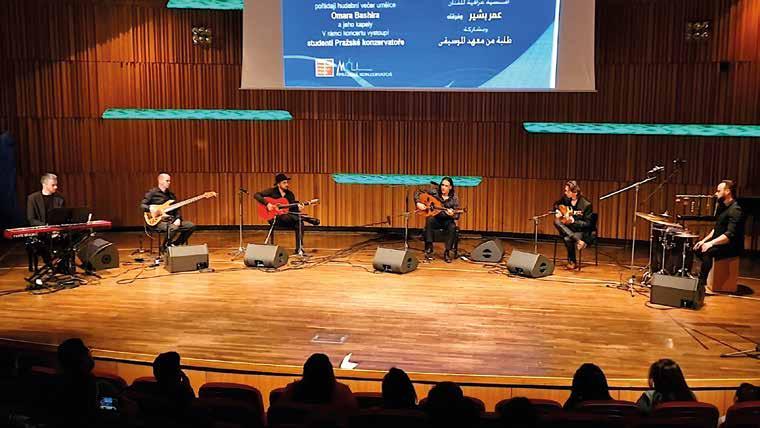
The Ambassador of the Republic of Iraq H.E. Mr. Falah Abdulhasan Abdulsada Abdulsada hosted an Iraqi Folklore Concert at the Prague Conservatory. The leading artist was Omar Bashir, an IraqiHungarian musician. His father, Munir Bashir, was considered to be the supreme master of the Arab maqamat scale system. Omar Bashir was born in Budapest in 1970, and started playing the Oud with his father at the age of five. The Ambassador of Iraq delivered a welcome speech to the guests, selected excerpts of which we are introducing to you.
Your Excellency Jan Bartošek, Vice Chairman of the Chamber of Deputies.
Your Excellency Pavel Růžička, Chairman of the InterParliamentary Friendship Group Czech RepublicRepublic of Iraq.
Your Excellencies, Distinguished Members of the Diplomatic Corps, Distinguished Guests, Ladies and Gentlemen.
It is a pleasure to welcome you, and let me thank you for your presence here at our event today, through which we want to send a message of peace and love, That is why the title of the event came with „Together we sing for peace, and with culture we fight terrorism“, as there is no other language more warm and interactive than the language of culture and music, as it is the bridge among nations and peoples and an important tool in confronting the forces of darkness,
and in spreading the values of life in its beautiful human form as well as planting hope for future generations.
Honorable Guests, Iraq is considered one of the countries that have suffered the most from terrorism of all kinds, and we can say with certainty that rifle alone does not impose peace without culture - a culture of love, acceptance of others, tolerance, and dialogue. Therefore we are trying here to highlight the role of culture and its tools in restoring life to normal.
So, Ladies and Gentlemen, let us raise olive branches and sing for peace, and may the cannons be silenced forever.
I would like to take this opportunity to extend my thanks and appreciation to the Prague Conservatory, especially the Director Mr. Petr Čech, and all those who contributed to organizing this event.
Text: M. Zisso; Photo: Archive Omar Bashir, an Iraqi-Hungarian musician and his band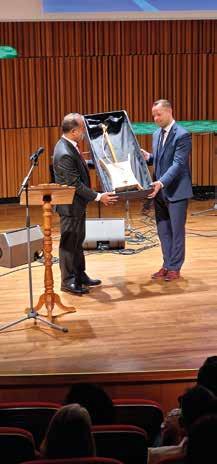
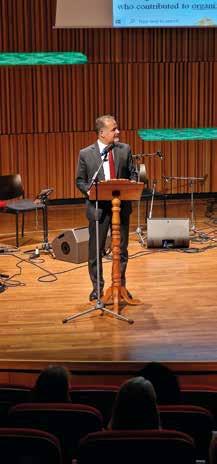
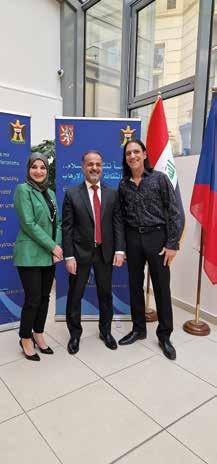
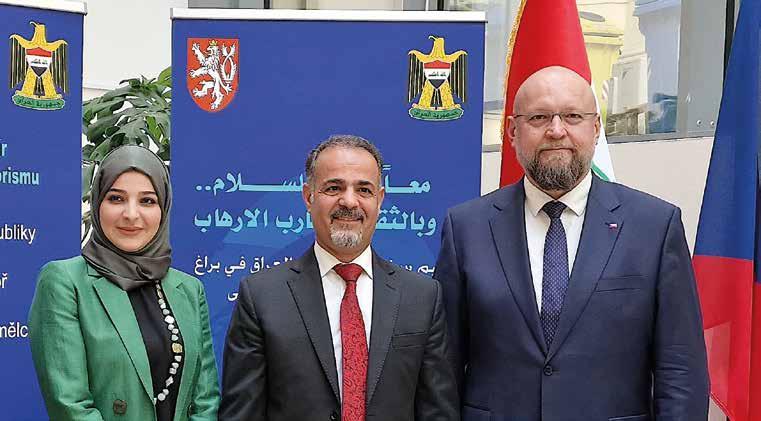
“The civil service offers an interesting opportunity to participate in good causes, needed by society and to improve the functioning of the state as a whole. And the Chief State Secretary is not only the head of the Civil Service Section in the Ministry of the Interior, but, more importantly, he is the head of the Civil Service in the entire Czech Republic,” says Jindřich Fryč, a senior civil servant, who has held the top position since November 2022.
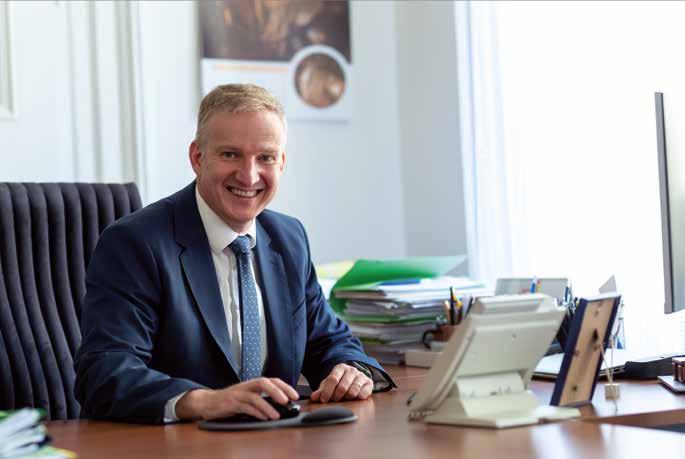
Can you tell us a few words about yourself?
Should I classify myself professionally, I am a senior civil servant, and my entire professional life has been de-facto linked to the civil service. Despite the various offers that have come from the private sector over the years, I have found working for the state to be meaningful and fulfilling to my idea of a working life. This was a major reason for my decision last year to apply for the post of Chief State Secretary, and to contribute even more to the further development, direction, and modernisation of the civil service in our country, drawing on my own extensive professional experience in the civil service to date.
If I were to talk about my personal life, thanks to my four
children, my family and the time spent with them is very important to me.
You are a teacher by education. What made you become a civil servant?
I worked as a primary school teacher for a few years, but almost immediately after my university studies I started working at the Ministry of Education, Youth and Sports, where I gradually worked in a number of positions - from Administrator to Director of a Department, Director General of a Section, Deputy Minister, and State Secretary.
Although I gave up my teacher’s career, I always felt that by working at the Ministry of Education, Youth and
Sports I remained at least a little bit faithful to my field. Working for the ministry has always made sense to me. The civil service offers an interesting opportunity to participate in good causes, needed by society and to improve the functioning of the state as a whole. It offers diverse agendas, including highly technical ones, and gives the opportunity to get involved in a wide range of fields.
From the beginning of my studies and consequently, during several years of teaching, I wanted to influence things much more than „just“ as a transfer of knowledge. I wanted to participate in the creation of the system. I have always wanted to address a specific issue in a deeper context, for example with an overlap into the field of international relations. Nevertheless, the same preoccupation with civil service issues has also motivated me now in my decision to apply for the post of Chief State Secretary.
You have held the office of Chief State Secretary, as the head of the Civil Service Section in the Ministry of the Interior of the Czech Republic, since November 2022. What is your role?
As you just said, the Chief State Secretary is not only the head of the Civil Service Section in the Ministry of the Interior, but, more importantly, he is the head of the Civil Service in the entire Czech Republic. Thus, the role of the Chief State Secretary consists mainly in its top position, where his competencies and powers given by the Civil Service Act are directed to the legal relations of civil servants, organisational matters of the civil service, service relations, remuneration, and management of civil service matters.
In practical terms, this is the top position within the entire civil service, with the Chief State Secretary ensuring compliance with the Civil Service Act and the rights and obligations set out therein, including the coordination of the civil service in the various Ministries and other Service Authorities. For this purpose, I work closely with the State Secretaries and Heads of Service Authorities.
Currently, you are preparing a new amendment to the Civil Service Act, which will be proposed by the government. What kind of changes does it include?
The Government’s programme statement sets out a commitment to strive for a smart, efficient, and costeffective state. Specific steps should enable authorities to operate more efficiently, be open, and strengthen their power.
The forthcoming amendment to the Civil Service Act, which will simplify and speed up the functioning of the
civil service, (e.g. personnel procedures, increasing the emphasis on its effectiveness, rationalisation, and better mobility of civil servants within the system), should also help to achieve this goal.
Among other practical changes the amendment should bring is the rationalisation of disciplinary proceedings, streamlining of service performance appraisal and education of civil servants, streamlining of organisational matters of the civil service and facilitation of the law application, where the implementation of legislative technical changes will lead to the easier and more userfriendly application of the law.
Last but not least, it should be mentioned that the quality of the people involved in the state administration is crucial to its level of effectiveness. Therefore, the concept and position of a civil servant (official) and the related personnel matters are of particular importance for the performance of state administration. The current amendment to the Civil Service Act aims to make modern civil service of high quality and efficiency, and to make it better perceived as a good public service.
You are also preparing a comprehensive Civil Service Development Strategy, aimed at making the civil service more attractive. How and why are you doing this?
The civil service is not something abstract, but it is about specific agendas that the state provides for citizens through civil servants – and citizens, and therefore the state, need and expect the provision of these agendas. The civil service also needs to be much more „in the public eye”, as does everything it delivers to the people. This is one of the main goals for the future, which can bring about a change in the perception of the work we do.
We, therefore, want to go in the direction of making the civil service more attractive. The recently published OECD report on the state of the public administration has given us very good recommendations in this regard, with a number of recommendations, such as focusing on strengthening the employer brand, modernising and streamlining the recruitment process, focusing on developing the management skills of those in charge, strengthening the role of education and professional development, and collecting and using human resources data more effectively. And it is in light of these recommendations that we are focusing our strategic actions in the area of civil service development.
Of course. Since the adoption of the Civil Service Act itself, we have been in continuous communication at the working level with the European Commission, which
is interested in the development of the civil service and its transformation. I see this as a mutually beneficial dialogue. Last year’s successful Czech Presidency of the EU Council was an opportunity not only to discuss priority topics (e.g. ethics in the civil service) but also to present the civil service system in the Czech Republic as a whole, which brought many positives in this regard.
For your work, you received The Order of Academic Palms and the Grand Federal Cross of Merit awards.
First of all, I would like to say that I appreciate both awards very much. I have devoted a large part of my working life to the field of international relations and European affairs, so the awards primarily reflect my work in international relations.
At the Ministry of Education, Youth and Sports I started as an Administrator Specialist for German-speaking countries, and as Director of the Youth Department I expanded the area of international cooperation to other important European countries such as France. For over 20 years, I have been directly involved in the preparation or negotiation for a number of cooperation programmes or projects with both countries, as well as several international agreements.
In the case of cooperation with Germany, what I value the most is the negotiated equivalence agreement, which fundamentally facilitates mobility in education between the two countries, or the development of cooperation between young people, which has contributed to the good neighbourly relations we have with Germany, and which we appreciate. Concerning the cooperation with France, I will mention the longstanding coordination concerning Czech-French bilingual grammar schools in our country, and the major expansion of cooperation in the area of youth in the mid-1990s. I should also mention my continued support in the field of foreign language teaching, including my personal contribution to the introduction of compulsory teaching of a second foreign language at secondary schools.
As I have already mentioned, I am truly honoured to have received both awards. In this sense, my most profound recognitions go to my colleagues, who supported me and enabled me to make it all this way.
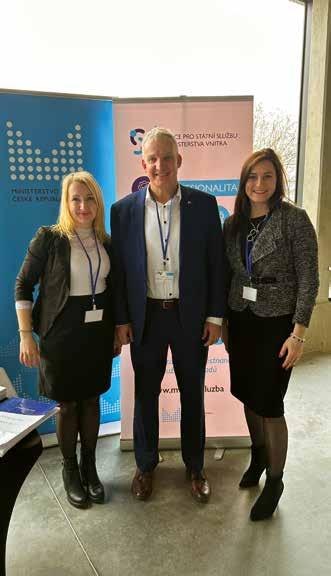
For young people, working in the civil service or public administration is not attractive, and is not a “first choice after school” for a large number of them. I see this as a great risk for the future of the Czech Republic. A wellfunctioning state needs and will always need highquality civil servants. Yet civil servants have nothing to be ashamed of compared to other groups of employees.
Moreover, the civil service offers them stable conditions, including salary, but also the opportunity to further self-development, as well as training and development of their talents and skills – or what they are good at. And last, but not least – you will find many really great, welleducated, and exceptionally skilled colleagues in the civil service.
If we asked you about the weirdest thing you have ever dealt with, what comes to mind?
This is a very interesting and unconventional question. There is not even a completely easy answer to it. I’m not going to mention one particular thing, but rather a longterm sense of fading tolerance between people, respect and regard for others, and perhaps the work they do, as well as a loss of willingness to listen more to others, and to what they are trying to convey. This translates into interpersonal relationships, in personal life and in the workplace.
Every day may bring some adventures, sometimes positive and sometimes unfortunately negative, but even from adversity one can come out learned and strengthened for the days ahead. To be more personal, I consider work extremely important in my life, but I see my children and the daily joys and worries about them as the greatest adventure and responsibility in my life.
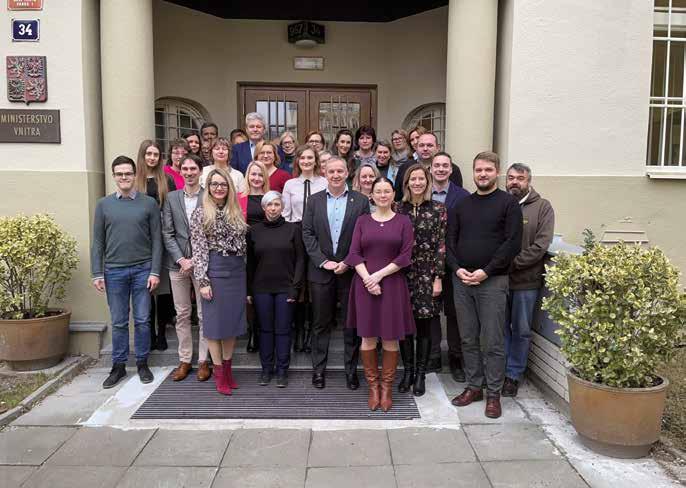
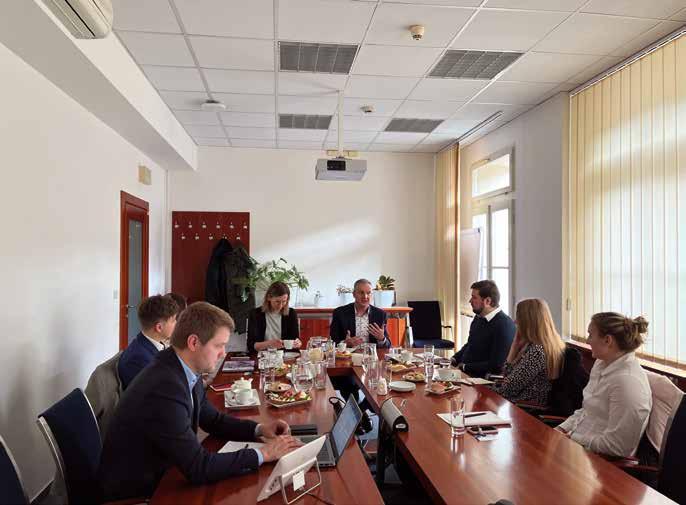
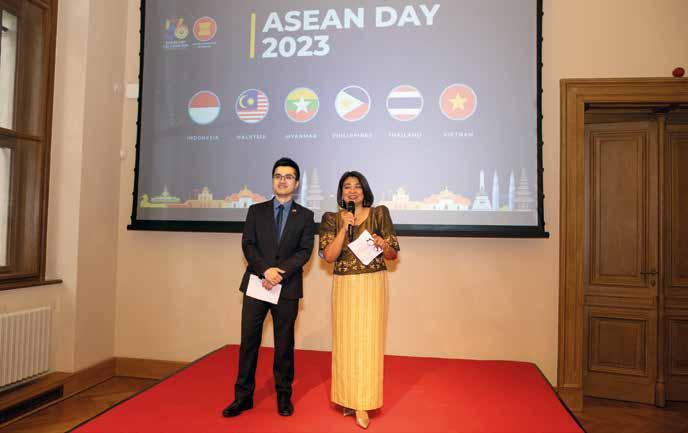
H.E. AMBASSADOR EDUARDO R. MEÑEZ Chair of the Committee greeted everyone in the name of the member countries. The highlight of the event was a fashion show of tradition dresses from ASEAN countries with very surprising models – the Ambassadors, their spouses, and other members of the Embassies.
Director General Kateřina Sequensová, Director Helena Koenigsmarková, H.E. Most Reverend Jude Thaddeus Okolo, Dean of the Diplomatic Corps in Prague, Excelllencies and Colleagues, Ladies and Gentlemen, Honorable Guests. Good afternoon.
I have the honor to represent and celebrate, as Chair of the ASEAN Committee in Prague (ACP), our joint commemoration of the 56th anniversary of the Association of Southeast Asian Nations or ASEAN. We know that for some of you in the audience, especially the diplomats and those involved in foreign or international relations, there may be familiarity with our regional group. But for those who may only know about our countries individually, it is our hope that today’s event will enlighten you on the shared aspirations and ambitions of our region, similar to what
the European Union has been pursuing, albeit here in Europe for a longer time and with deeper integration. The video message you just saw provides a glimpse of what ASEAN represents across the political-security realm, our region’s economic significance, and our sociocultural cooperation, especially in relation to the Czech Republic and the EU as a whole. It is the ASEAN Committee in Prague’s shared objective, through joint activities such as today, to broaden and deepen the general public’s knowledge and understanding of ASEAN. We have several events lined up, all designed to expose the various sectors of Czech society to issues that will bring us together for a better future. We hope to impress upon you, through these activities, the idea of ASEAN Centrality here in Central Europe, and remind you of the Indonesian Chair’s theme this 2023, “ASEAN Matters: Epicentrum of Growth.”
ASEAN matters to its 700 million citizens; it matters to their safety, security, and prosperity; and it matters
towards the sustainability of their resources and environment for continued growth and development.
ASEAN also matters to regional and global citizens who rely on supply chains that ensure the provision of resource inputs to manufacturers; who depend on secure maritime lanes to facilitate the shipment of goods to trading destinations; and who seek peace and stability to expand economic opportunities.
ASEAN is an epicenter of growth because through the years, regardless of the challenges, ASEAN has continued on a path of integration and growth. In essence, continuously implementing and living the vision of the founding fathers of ASEAN in 1967, that is, “to accelerate economic growth, social progress, and cultural development in the region through joint endeavors in the spirit of equality and partnership.”
ASEAN is projected to be the fourth largest economy in the world by 2030. We are positive that we can attain this as we grew by 5.7% in 2022 due to resilient domestic consumption and thriving trade. We are
expected to grow within the same range this year (4.7%) and next (5.0%) due to our economy’s resilience, demography and positive growth.
It is due to the confidence in our regional economy that foreign direct investment flows into the ASEAN grew by 5.5% or USD224.2 billion in 2022 and intraASEAN foreign direct investment flows increased to 12.3% in the same year.
As we mainstream the ASEAN Outlook for the IndoPacific and further implement the Master Plan on ASEAN Connectivity, we are confident in a future that will connect us, ASEAN and the Czech Republic and ASEAN and the European Union, towards deeper political, economic, and socio-cultural cooperation.
Ladies and gentlemen, today’s event also serves as the opening of the exhibit entitled “Woven Identities: Clothing Traditions of ASEAN” which we have complemented with a short festival of fashion and, of course, our regional cuisine. While there are six resident ASEAN embassies in Prague, our exhibit will
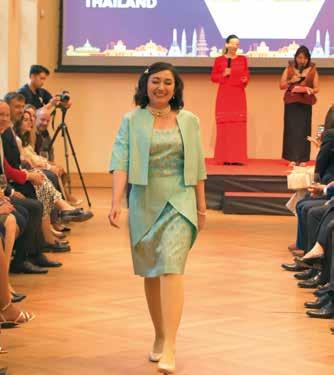
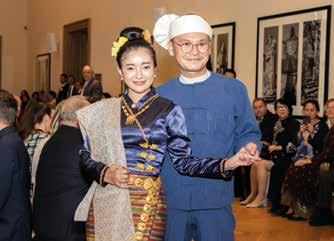
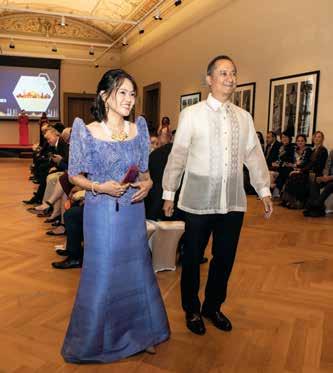
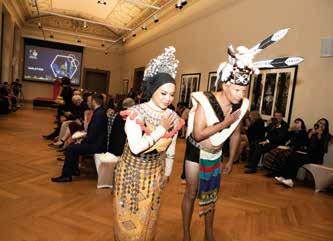
show the traditional attire of all ten ASEAN member countries over the next two weeks. We would like to thank the Museum of Decorative Arts, through Dr. Helena Koenigsmarková, for supporting this event. We would also wish to welcome and thank our Guest of Honor, MFA Director General for Non-European Countries, Economic and Development Cooperation, Ambassador Kateřina Sequensová, who just returned to Prague from Den Haag and assumed her position in the ministry.
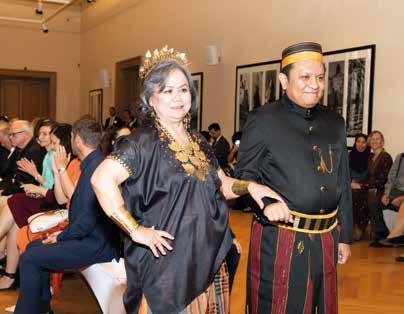
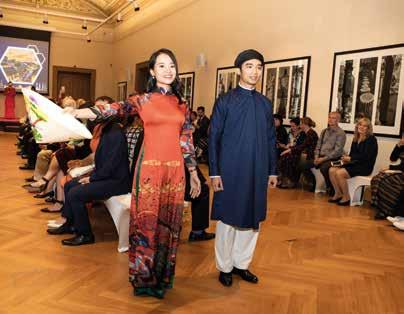
On a personal note, I would also like to acknowledge the presence of Ambassador Jana Šedivá who has also
recently returned from her posting in Manila and who is known among us ASEAN Ambassadors here as being previously involved in our region within the MFA. It is also important to mention that we have a new Chargé d’Affaires from Myanmar, Mr. Htuann Naung, who just arrived yesterday in time to join our group for today’s festivities.
Once again, thank you on behalf of all the ASEAN Heads of Mission and personnel in Prague, and please enjoy the program.
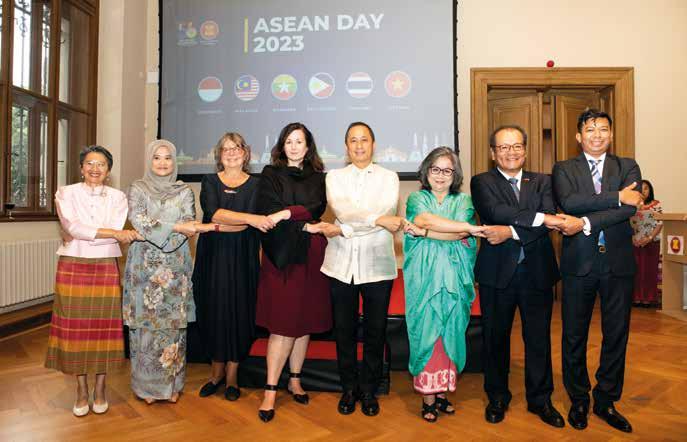
First Secretary Mr. Muhammad Tiefryan
Fahlensyah and H.E. Ambassador Kenssy Dwi
Ekaningsih - Indonesia; Local Staff Mr. Michal
Teinitzer and Counsellor Farashima Aini Mohd
Ali - Malaysia; Counsellor Mr. Sai Kaung Htet and Madam Su Myat Nandar - Myanmar;
H.E. Ambassador Eduardo Martin R. Meñez and Madam Marissa Meñez - Philippines
Counsellor Ms. Wanlaya Wattanasopon - Thailand; Counsellor Mr. Sai Kaung HtetMyanmar; Counsellor Ms. Farashima Aini Mohd
Ali - Malaysia; Minister and Consul General
Ms. Indhira C. Banares - Philippines; First Secretary Mr. Muhammad Tiefryan FahlensyahIndonesia; and Third Secretary Mr. Long Nguyen
Hoang - Vietnam
H.E. Ambassador Eduardo Martin R. Meñez - Philippines; H.E. Ambassador Kenssy Dwi
Ekaningsih - Indonesia; Dean of the Diplomatic Corps H.E. Most Reverend Jude Thaddeus Okolo
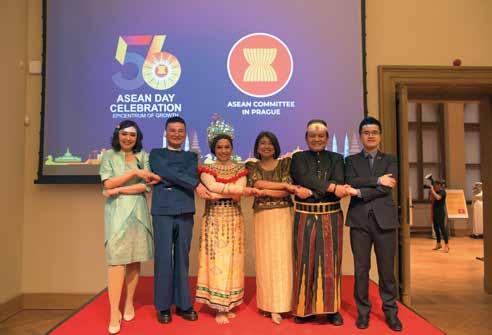
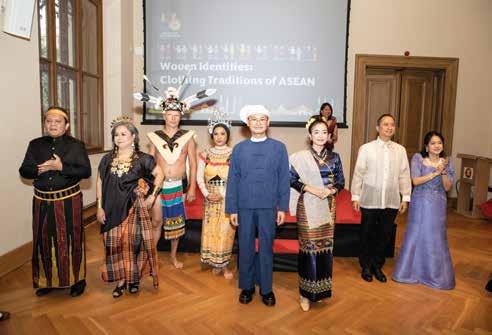
- Holy See; H.E. Ambassador Suzilah Binti Mohd
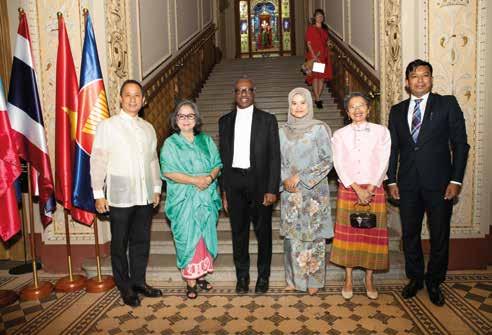
Sidek - Malaysia; H.E. Ambassador Phasporn
Sangasubana - Thailand; and CDA Mr. Htuann
Naung - Myanmar
“In 2018, I received a very interesting offer from Lexum, part of the Optegra Group, an international group operating state-of-the-art eye clinics in Western, Central, and Eastern Europe. It is a really strong specialist provider of surgical medical care that delivers real benefits to patients quickly and painlessly, in the beautiful and clean field of eye surgery. I didn’t hesitate for one second,” This is how Michal Krejsta, the head of Lexum European Eye Clinic network recalls the moment of joining the company. How did he get from a Moravian block of flats into this top position? And is it different from all his previous extensive career experience?
Tell us about yourself. What influenced you on your path to top management?
I was born in Boskovice, and spent my youth in Blansko and Brno. I was a very ordinary boy from a block of flats with lots of interests, a passion for sports, and caring and loving parents. Which, I believe, is a great foundation. I did well at school, I was a good pupil and student. I completed each year with honours, and I graduated from secondary school with honours as well. Then I went to university. Originally, I wanted to study law, but since my parents had opened a pharmacy and my brother was already in medical school, there was a question of who would take over the business my parents had built. So, I decided to study pharmacy instead of law. At that time, I made this purely pragmatic decision knowing that I could get a law degree later. That is also why I have recently completed my studies at Charles University and obtained my LL.M. But, back to studying pharmacy. Surprisingly, I have to say that I did really well, and even started to enjoy it. After successfully graduating, I went on to obtain a PhD in pharmacy in Brno and Belgium. In England, I earned an MBA Senior Executive degree, and I also successfully graduated from Cornerstone Business School in the USA.
So, completing your studies didn’t take much effort. Tell us, what was the beginning of your professional career?
I started as a medical representative at AstraZeneca, a pharmaceutical company, in 2001. Quite soon afterwards I was promoted to Product Manager, and then Marketing Director. However, I also wanted to learn how to manage people, so I joined Bayer, where I was involved in oncology in the Czech Republic and Germany. I then moved on to Business Director at Pfizer, where I successfully combined my marketing and business experience, and became CEO of the company within a few years. I stayed at Pfizer for ten years. Then I decided that I wanted to get to know and understand the entire drug and patient chain in detail, including its opportunities and risks. And there was no better place to do that than PHOENIX – a giant in the pharmaceutical distribution market in Europe. I won the selection procedure and was named CEO. After that, I got offers from Penta, and later from Omega Pharma, which I accepted. In 2018, I received a very interesting offer from Lexum, part of the Optegra Group, an international group operating state-of-the-art eye clinics in Western, Central, and Eastern Europe. It is a really strong specialist
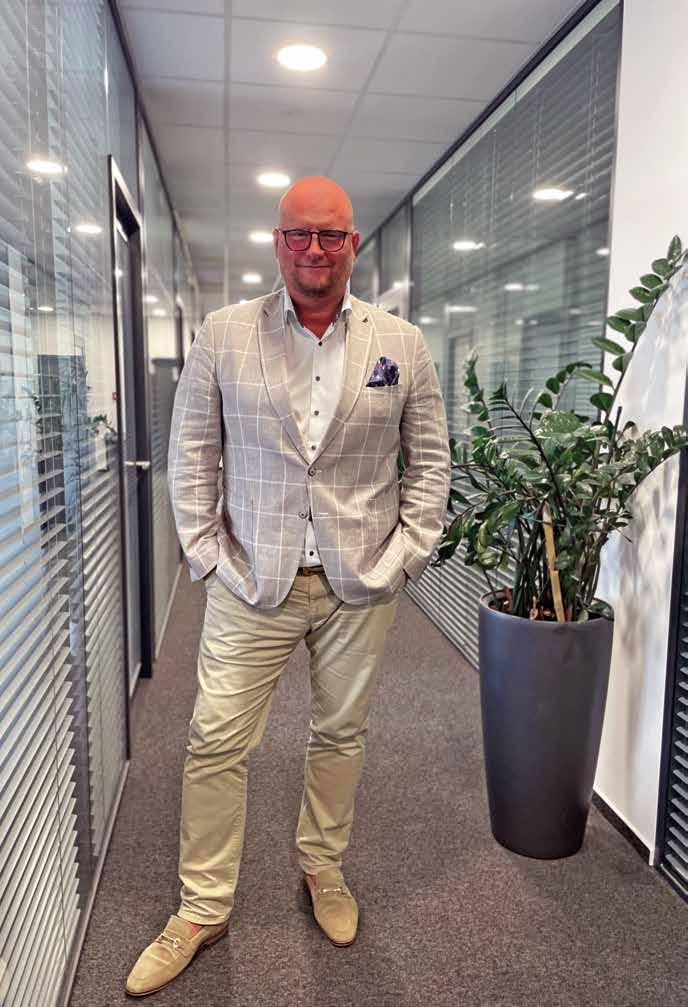
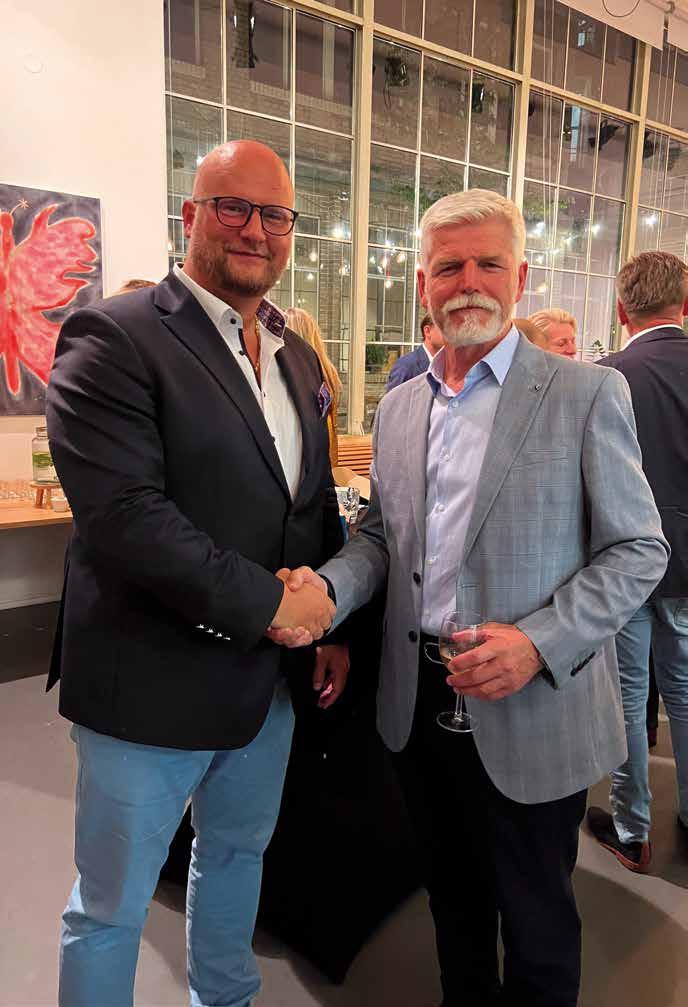
provider of surgical medical care that delivers real benefits to patients quickly and painlessly, in the beautiful and clean field of eye surgery. I didn’t hesitate for one second. This essentially completes my journey from manufacturer to distributor to provider, so I dare say I understand the entire patient chain and can take advantage of all its synergies, as well as navigate around its pitfalls.
How do you explain such rapid career progression, something few of us achieve in our lives?
I think I have always been able to see “around the corner”. I have been able to connect the dots and understand the entire context, which I am able to quickly apply wherever necessary. That is a model that allows me to overlap my expertise. Few people have this ability, and I believe this is what made me attractive to employers and colleagues. I had knowledge, experience from abroad, and spoke fluent English. The fact that I am able to put my ego aside certainly played a role too. I am aware that I have it, but I am also aware that it is the most precious thing, and therefore it is pointless to let it show too much. Where convenient, I have no problem suppressing my ego in order to gain an advantage, to reach an agreement where both sides walk away from the table satisfied and are eager to meet again and develop co-operation. This is what relationships between people should be all about in the first place. Companies have primarily approached me when they needed to set up changes and establish processes. In most cases, a shift from “zero to a hundred” was required. Except for perhaps Pfizer, I took over these companies in situations where they were not doing well – for example they suffered from poor local management or some other problem. I implemented reorganisations and restructuring, I initiated change management, and did my best to motivate people.
You have mentioned the ability to motivate. What is your relationship with the people who work under your leadership?
I can honestly say that I really care about people, I really
like the people around me, and I most likely wouldn’t be able to do the job properly without them. I am not someone who says one thing and does another. I think I am authentic. I am happy with myself, and maybe that is why I want the people around me to be successful and happy. I am glad when I can teach them something and nudge them forward. And I am always happy to learn from them too.
Let’s go back to your current position as CEO. How do you feel at Lexum, for example, compared to your previous positions?
Lexum has had a very personal and strong impact on me. To me, it is not simply a job or a mission. The way I see it is that my commitments to Lexum are like those to a family that I need to take care of, develop in specific ways, and enjoy the fruits of. At the same time, I feel great respect because I work with mature and wise people, excellent professionals, and experts. In fact, I never thought Lexum would mean so much to me. Lexum is definitely the best thing that has happened to me professionally, and I also have the closest personal relationship with it. This may be in part because, prior to now, I had no direct contact with patients. In other companies, I saw patients as end-users from a distance; they were never a direct consumer of my care. Here, I see it differently because whatever we set up at Lexum has a direct impact on our patients’ medical outcome and satisfaction. And even though it is not always easy, when I see the high level of quality and premium care we provide, and I see a real, happy patient, I find it immensely satisfying.
There are certainly many important things but if I were to pick one, it would first and foremost be integrity. And that, in turn, is underpinned by the responsibility of each individual. The strength to live up to it, to enforce it. When I am responsible, I have respect. Respect for myself and others.
INTERVIEW WITH JAKUB
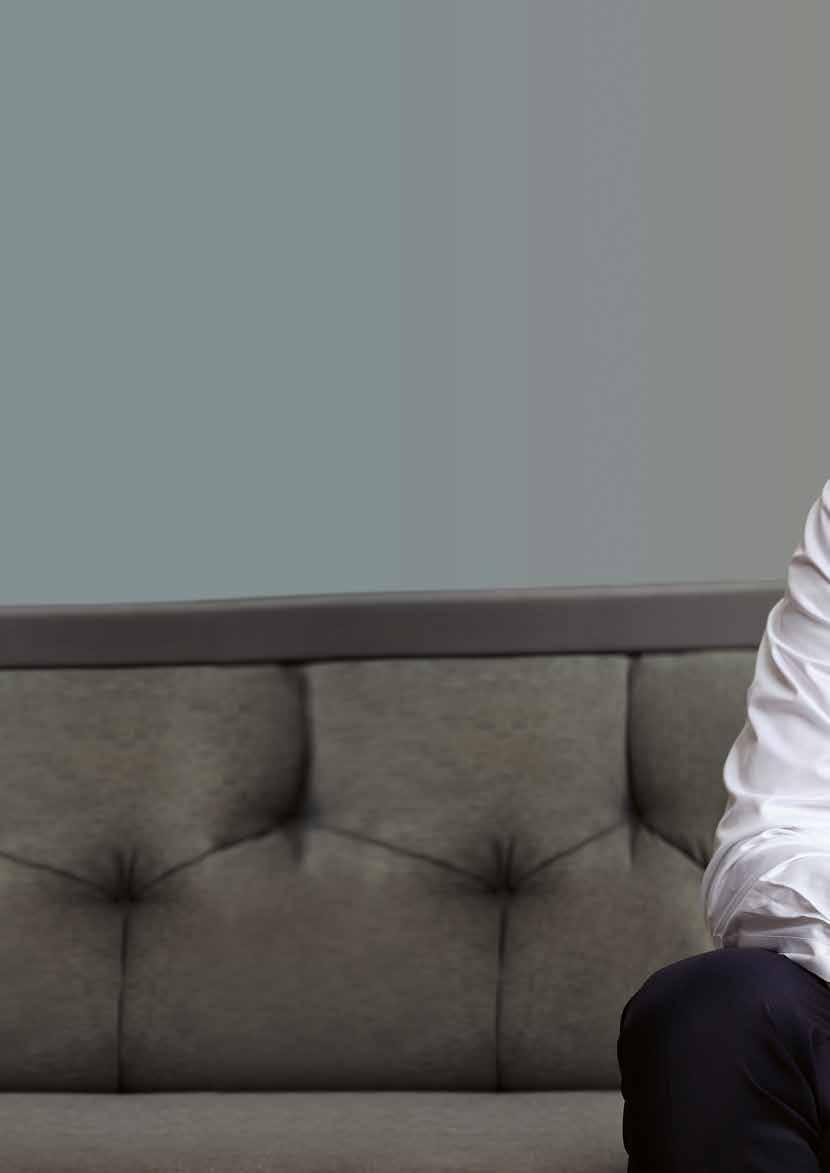
Jakub Stárek, an elected representative of Prague 6 for seventeen years and its Mayor for over a year, acknowledges his father, František Stárek Čuňas, a dissident and key member of the Czech underground, as being his greatest inspiration. Sometimes, the Mayor’s straightforward answers give a feeling of an echo of these old-times warriors, who “have tough skin, but are always open”. As the Mayor puts it, “No sane person does politics because he wants to hear words of praise and applause in the square. I will be satisfied if we manage to get most of our plans to a stage where no one can question them, and especially if I keep the coalition together and achieve close cooperation with the opposition.”
We know you are the Mayor of Prague 6. What else can you tell us about yourself?
I have two wonderful children, a beautiful wife, and the most beautiful part of the city around me. And even though every day is not a fairy tale, I cannot imagine a different life. I am 41 years old and originally from East Bohemia, from the town of Česká Třebová. I spent my earliest youth there, and after the 1989 revolution we moved to Prague 6, where I still am today. Professionally, I spent most of my career in state and local government. For example, I spent eleven years of my civil service career at the Ministry of Education. In addition, I have been an elected representative of Prague 6 for seventeen years.
You are a member of the Civic Democratic Party (ODS). Where did your inspiration come from?
Joining a political party is not a given. I was the first (and so far, the last) in my family to ever do this. My father was clearly my inspiration: František Stárek Čuňas, a dissident and key member of the Czech underground, who lost several years of freedom for publishing the magazine Vokno and organizing unauthorized cultural events. After the revolution, Václav Havel asked him to take an important position in today’s Security Information Service. There, he was closely connected with political events, but, according to the law, was not allowed to enter politics. That’s why I entered politics at the age of 20.
Was becoming a Mayor of Prague 6 your professional goal?
When I was first elected to the council,
seventeen years ago, I could not imagine being a mayor. But I think that everyone who ever runs for office is toying with the idea and ambition for this highest position for a while. After many years, with hard work and sometimes with a good dose of luck, and thanks to great colleagues and partners, I became deputy mayor, and it was a short journey from there.
Where do you see the key role of a mayor? The most important thing is to be there for people. And for the citizens of Prague 6, not only so that I can put things in order, but especially so that I can talk to them, give them strength, and listen to them patiently. Regardless of how difficult it is in today’s world of a thousand and one interests, (it is important) to push for improvement, even just with the little things in their lives.
You have been walking in the mayor’s shoes for over a year. Can you share some of your impressions?
It’s a real ride. The advantage was that we came very well prepared, and at the first meetings of the council we began to fulfil our obligations from the elections. We also managed to clearly establish the coalition agreement on key investments, as well as the vision of the district. This is because of the rule that if you do not make a firm decision in the first year of government, you have no chance of following through – this applies absolutely, and without compromise.
Text: Martina Hošková and M. Zisso; Photo: Archive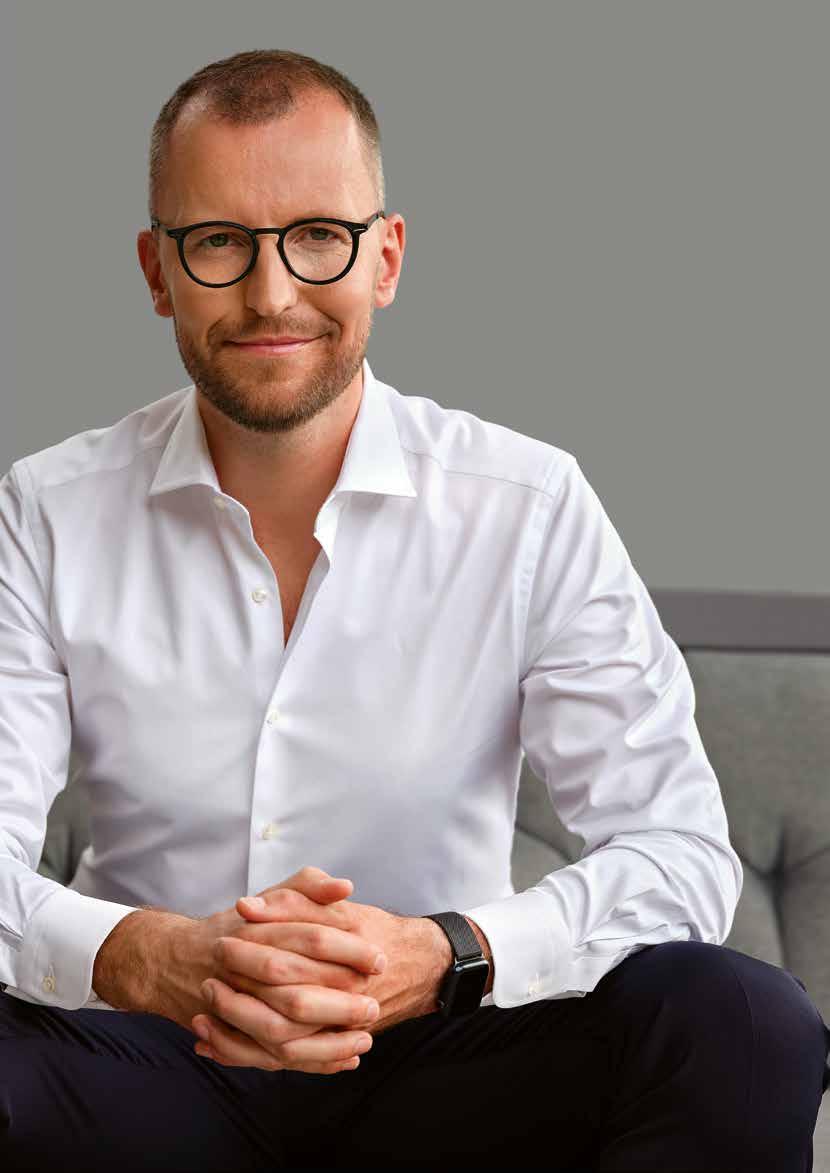 Jakub Stárek, Mayor of Prague 6
Jakub Stárek, Mayor of Prague 6
What are the most burning issues of the people in Prague 6? Are they unique compared to other Prague districts?
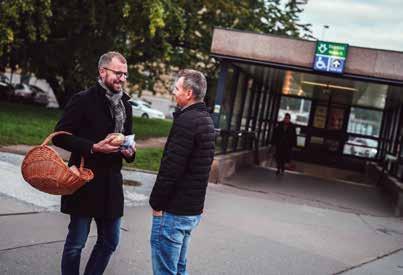
The citizens of Prague 6 are generally very satisfied. Why not, when we can live in the most beautiful part of the city? But there are problems here too. I consider transportation and education to be the two most important. The first is not at all unique, but historically there have been a series of decisions in transport, which, together with the increase in cars, turn the central parts of Prague 6 into highways and parking lots. For our satisfaction, several billions must be spent on completing the ring road around Prague, the internal road for the Vítězné náměstí bypass, and many other measures. For four years now, we have been in a declared “traffic emergency”.
In education, it’s simple. We have very high-quality schools, which on the one hand is great news, but on the other hand, attract cross-country people who are allowed to change their permanent residence by the shallow law, and put, for example, Central Bohemia on an equal footing with children who live next to the school. Our children and those from Central Bohemia have the same chance of getting into a (Prague 6) school. I find that unfair, discriminatory, and immoral.
Prague 6 is a wealthy part of the city, which was caused by several historical factors and good budget management. At present, however, we have progressed with the preparation of key investments, and are approaching the start of construction, e.g. a new hospital for long-term patients, an indoor swimming pool, a new polyclinic building, apartments for young people, sports grounds, etc. Even our savings will not be enough for that. Therefore, I consider finding the means to fulfil our visions, and at the same time maintain the level of services we provide to citizens, to be a key challenge.
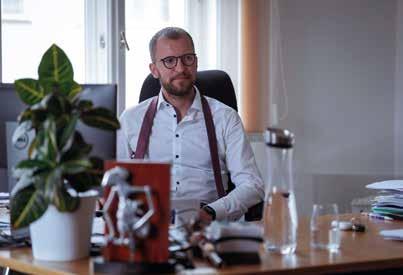
After 17 years in the council, I’m used to it. It is essential not to leave out a single thought or criticism that is voiced, whether it is said by a pupil at a meeting at his primary school or by a senior at an event at a retirement home. You need to have tough skin, but always be open. It is surprising that even the biggest opponents on social networks are ready to listen and cooperate to improve Prague 6 during a conversation at the same table.
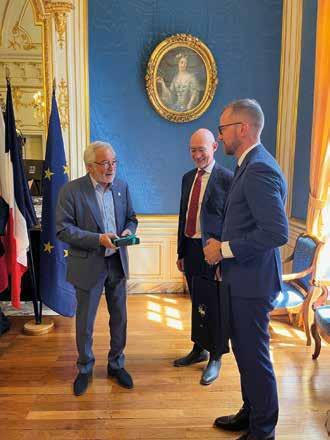
In addition to the completion of our key investment projects, we want to lead resistance against the already mentioned “fallout tourism”, and lead ministries and parliamentarians to change the Education Act. I would like to continue our development of openness, where I started a meeting of the entire management of the town hall and all their
representatives directly in the streets where people live.
After four years in the position, will people say you were effective?
No sane person does politics because he wants to hear words of praise and applause in the square. I will be satisfied if we manage to get most of our plans to a stage where no one can question them, and especially if I keep the coalition together and achieve close cooperation with the opposition.

To conclude, an invitation to some of the many popular events taking place in Prague 6 would be nice. Every day, together with my colleagues at the town hall,
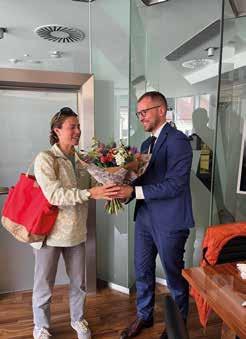
we try to make people in our district live well. And I believe we are succeeding. Soon, we will celebrate Prague 6 Days, which is a traditional celebration of the existence of the city district, relating to several cultural events. Among the oldest are, for example, the Opera in Šárka, where this year we will commemorate 110 years since the foundation of the natural theatre in Šárka. In fact, almost the entirety of September will be marked by celebrations, which will also culminate in the traditional event of the reconstruction of the battle on Bílá hora. Throughout the year, residents and visitors of Prague 6 can also look forward to other traditional events, such as the Embassy Festival, Ladronka Fest, and the traditional Witches on Ladronka.
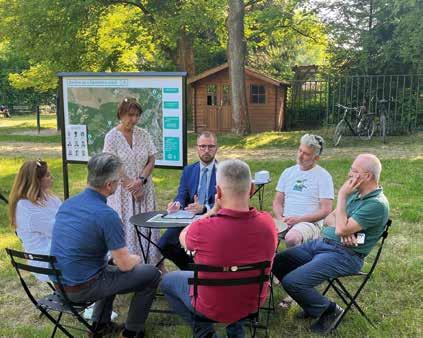
“The Museum’s Board decided that it was time for a change. I will do my best to fulfill their expectations,” promises Pavla Niklová, the new director of the Jewish Museum in Prague, and outlines the path she and her team are going to take: “Arts and culture are a very true reflection of society, its direction, and its values. We hope to develop the Jewish Museum in Prague as an open center of education and discussion.” Does she have a more specific plan yet? And what professional experience will the new director draw on?
Please tell us about yourself.
I come from Prague, I’m an arts manager, I have no artistic talent myself – my kids would tell you that I can’t draw an apple – but I have dedicated my career to presenting artistic work. I can’t imagine my life without theater, music, and exhibitions. I have almost three decades of experience at prominent arts organizations in the United States and in the Czech Republic. My focus is the conception, production, and promotion of innovative programs that encourage multidisciplinary collaboration and exchange. In addition, I have experience in fundraising, public relations, and the preparation of grants agendas. For the entirety of my life, I have been trying to communicate just how much the arts can offer to other people by sharing unique opportunities that allow them to become a part of something different, fresh, and stimulating.
What were the steps that brought you to the position of the Director of the Jewish Museum in Prague?
I used to work at the museum for five years as head of the Development and Public Relations Department. It was a very valuable professional experience, I met a lot of people who are still my friends, and at the same time it opened up a new world of knowledge that has an important place in my life.
For me the most important and the interesting project that I was in charge of at the museum was the „Year with Jewish Culture – 100 years of the Jewish Museum in Prague“. The purpose of the anniversary was to present the museum as a unique holding place of modern Jewish history, which is intertwined with Czech culture and society. We approached art institutions, individual artists, Jewish communities, foreign cultural centers, and other organizations and asked them if they could prepare, or possibly dedicate, one of their programs to the Jewish Museum on its centenary. The response exceeded our expectations, and we ended up working with one hundred and twenty partners, and the Jewish Museum participated in programs in fifty different cities in the Czech Republic and around the world. Now, I wasn’t actively looking for work in Prague, however, when I found out that the museum opened a competition
for a new director, I realized that I started thinking about it, and several friends encouraged me to apply. It is a once in a lifetime opportunity, and I feel deeply honored to have been selected to lead such an important Czech Jewish cultural institution.
You are filling in the “big shoes” of Leo Pavlát, who led the museum for almost 30 years. Do you have any special concerns?
Leo Pavlát joined the museum at a time when it had been de-nationalized / restituted and returned to the Jewish community. He participated in its brand-new beginning, when it was necessary to catch up on a lot of neglected work, take care of the collections, and start fulfilling the museum’s mission as an institution that cares about the heritage of the Jewish community in the Czech lands –which was devastated not only during the war, but also during the following years by the communist regime. We will of course continue this mission, it is a process that is never-ending, and I feel a great responsibility to take on this task. Leo Pavlát was the head of the museum for almost thirty years, and the Museum’s Board decided that it was time for a change. I will do my best to fulfill their expectations.
You are back in Prague after 10 years in the USA. How was your American experience?
I lived in New York for the last 13 years, about which many people say that it’s ‘not America’. In 2010, the Czech Ministry of Foreign Affairs appointed me as Cultural Attaché. I was tasked with overseeing all aspects of the Czech Center New York at the newly-restored, century-old Bohemian National Hall on New York City’s Upper East Side. It is very difficult to attract audiences because in New York there are tons of events happening every night. However, we were lucky to partner with some major U.S. institutions such as the Museum of Modern Art, the 92nd Street Y, Film Society at Lincoln Center, Museum of the Moving Image, Columbia University, Mannes School of Music, Brooklyn Academy of Music, New Museum, PEN World Voices Festival, Austrian Cultural Forum, OMI International Arts Center, Socrates
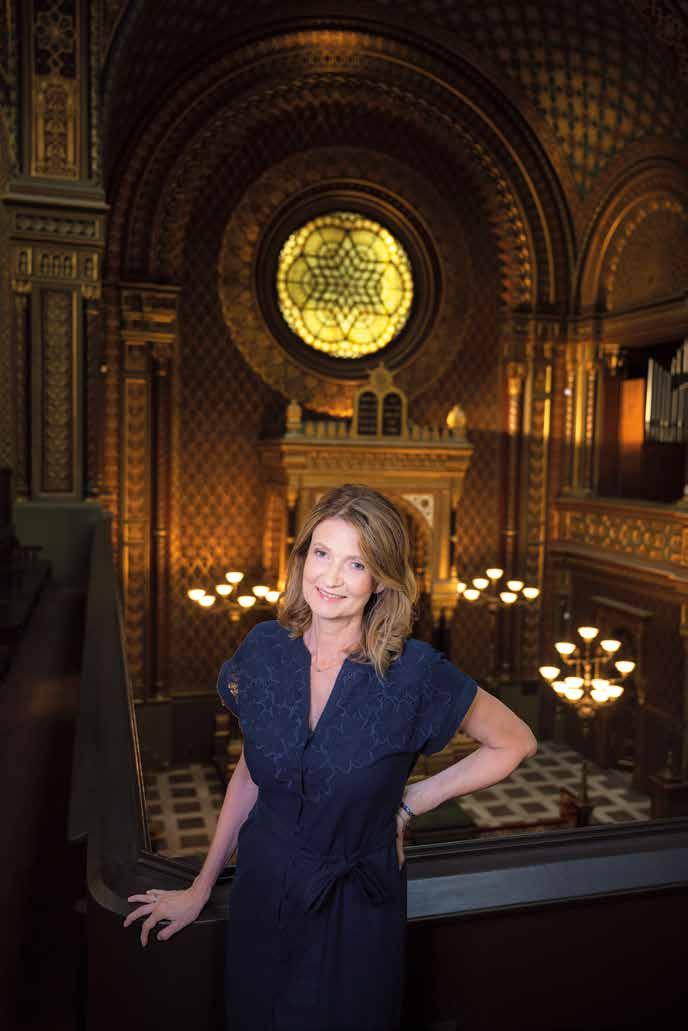
Sculpture Park, and more. Over the course of the last nine years, I worked as the Executive Director of the Václav Havel Library Foundation, a nonprofit organization established in the United States to promote human rights through the arts, and to extend the legacy of playwright, dissident, and former president of Czechoslovakia and the Czech Republic, Václav Havel. We have accomplished the following goals: dedication of the bust of Václav Havel in the U.S. Capitol on the occasion of the 25th anniversary of the Velvet Revolution, we started an exchange program for Czech and American theater students, and, with the support of a grant from the Carnegie Corporation, we filmed interviews with ten prominent U. S. politicians, academics, writers, and artists, including Bill Clinton, Timothy Snyder, Henry Kissinger, Suzanne Vega, and more.
We have started the annual Disturbing the Peace Award, which recognizes dissident writers around the world. In 2017, we launched the inaugural year of the theater festival Rehearsal for Truth, a showcase of Central European performing arts. This program has been supported by the New York City Department of Cultural Affairs and the New York State Council on the Arts.
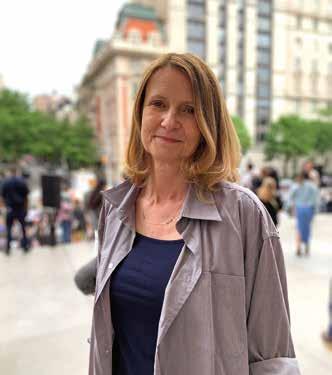
We have organized an annual fundraiser together with the Bohemian Benevolent and Literary Association, presenting the annual Award for Unparalleled Service to the Czech and Slovak Communities. Among its recipients were Secretary Madeleine Albright, Ambassador Craig and Dorothy Stapleton, Ambassador William and Wendy Luers, Sir Tom Stoppard, and Czech-American artist and author Peter Sis.
They say you can only love or hate New York, nothing in between…
I love New York, it is a big and sometimes hard city to live in, but it will always be one of my homes. Apart from other things, it is a so-called sanctuary city, meaning that municipal laws protect unauthorized immigrants from deportation, and I believe that one of the most important things about New York is that it honors the original concept that America is a country of immigrants. I met so many people who helped me and became my friends. My kids went to school there, and had the opportunity to experience the city’s multicultural environment. Some of my son’s best friends are first and second generation immigrants from Tibet, the Philippines, India, and other countries and cultures. For some time, we lived in Queens, which is the most linguistically and ethnically diverse place in the US. In the neighborhood of Jackson Heights, you can taste an incredible number of authentic cuisines made by and for local people. Our apartment is five minutes from the Forest Hills Stadium, where the U.S. Open used to take place, and which now hosts major concerts. Paul Simon and Bob Dylan played there in the same week to celebrate the fact that they both played the stadium fifty years ago. So, New York is not only Manhattan.
Do you enjoy Prague the same way? Or are you absorbed with working on the next 5 years’ vision of the Museum under your leadership?
So far, I don’t have much free time left, but I’ve been catching up with my family and some friends, and enjoying the summer. I’m a city person, and I enjoy being in Prague, which has been transforming into a very friendly place for living.
The millennia-long history of the Czech Jewish community is an essential part of the museum’s exhibitions, which document its significance and scope. As in so many other places in the world, Jews have played a distinctive role in the development of human society, and have created a distinctive culture in which deep traditions intertwined with reactions to their immediate surroundings. The museum’s rich collections can be used and presented in new contexts, in exhibitions that are designed as a search for new relationships and connections and can thus reach audiences on a personal level, as well as provide a space for comparison with their own experience.
With my colleagues, we would like to see the museum involved in various joint Czech and international projects that allow it to present itself outside the Old Town and meet the public on special cultural occasions. We will take particular care to work with new audiences, as well as with the financial resources that should be associated with and could result from new programs.
Arts and culture are a very true reflection of society, its direction, and its values. We hope to develop the Jewish Museum in Prague as an open center of education and discussion, first-rate museum work, and lively communication with the Czech and international public.
The CzechTourism Agency is a state-funded organization, established by the Ministry for Regional Development of the Czech Republic with the primary objective of promoting the country as a tourism destination – both at home and abroad. We talked to the head of the CzechTourism, Jan Herget, about the activities of the agency under his leadership, including emerging markets, digitization, and his future plans.
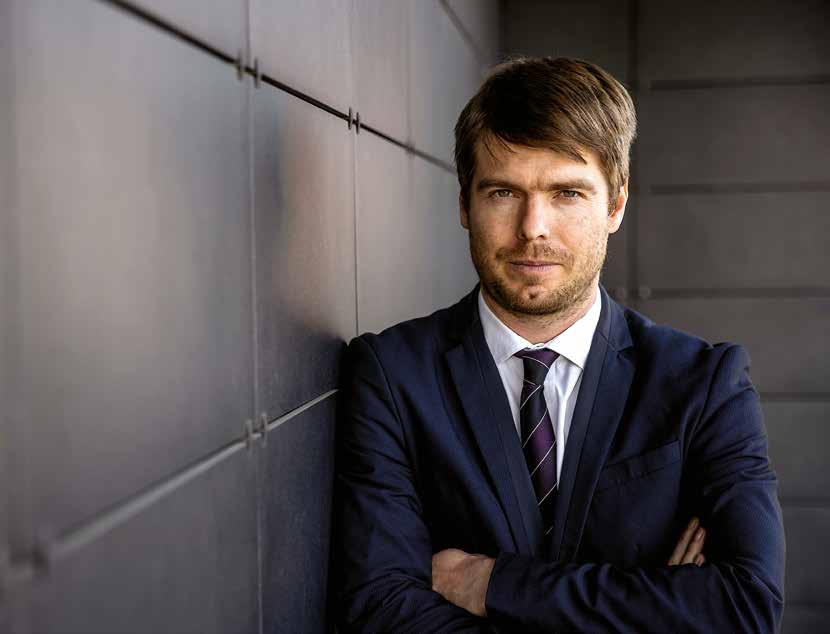 Text: Martina Hošková and M. Zisso ; Photo: Archive
INTERVIEW WITH JAN HERGET, CEO OF CZECHTOURISM
Jan Herget, CEO of CzechTourism
Text: Martina Hošková and M. Zisso ; Photo: Archive
INTERVIEW WITH JAN HERGET, CEO OF CZECHTOURISM
Jan Herget, CEO of CzechTourism
You have been acting as the CEO of the CzechTourism Agency for almost five years. How do you perceive your role?
I’m one of the few privileged people allowed to build the brand of my own country. Creating the image of Czechia as the most amazing destination in the world is not only my work, but also my passion. Naturally, a very important part of my job is to inspire and lead the great team that is my colleagues. But most of the time I spend with the stakeholders. I negotiate with my own ministry, other ministers, members of parliament, and most importantly all regions and business associations.
How many countries is CzechTourism active in?
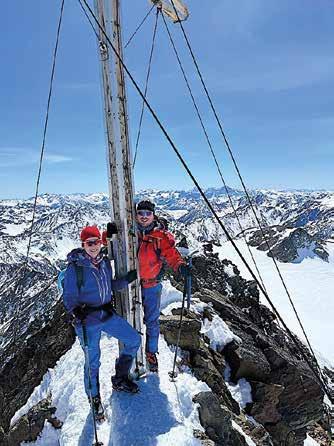
Based on our strategy, we split the markets into four groups. “Neighboring countries” like Germany, Austria, Slovakia, and Poland, where we also add the Netherlands and Denmark. The tourists there very often travel by car and visit different regions. On average, they spend a little bit less than other foreign tourists, but they are very important as we see them all around Czechia, and they visit even lesser known places. The second group is the “city-break countries”: Italy, France, the UK, Spain, and Scandinavia. The tourists there mostly visit Prague, and we try to inspire them to do at least a one-day trip outside the capital. A very important group is the so-called “long-haul markets”: USA, Japan, South Korea, China, and Latin America. They mostly visit only the highlight destinations, but
have the highest spending per person and per day. In all of these countries we have our own directors and run foreign offices. Finally, there is a group we call “emerging markets” – countries with a big potential to grow, and where a high average spending is common. This group includes India, Israel, and the whole region of the Middle East. We cover 360 marketing communications. Due to the low budget, our focus is on digital, but we still do B2B activities with travel partners like airlines and tour operators, provide information to journalists, cooperate with influencers, and run digital campaigns. Lots of our efforts go into our own media – our web page visitczechia.com, and our accounts on social media.
What about the activities here in the domestic market?
The domestic market is the most important market for Czechia. We even just broke our record number of domestic travellers from 2012. Our core activity is also to provide information to media, continuous daily updates of the great portal Kudyznudy.cz, social media, and the app. Through our own media, we reach hundreds of thousands of Czech travelers on a daily basis, and provide them with inspiration for their weekend and holiday travel plans. We also cooperate with Czech TV, and produce travel documents in coordination with all 14 regions.
How have you progressed with the digitization of the tourism industry?
COVID-19 changed the whole world. Nowadays, even small companies have digitized their products. Czech travel startups like Smartguide, Daytrip, and MyStay are competing on a global scale. I hope that the state will also help with the digitization. I see two main areas of focus in this respect – business administration and product distribution. In business administration, we are still not fully digital but are well on our way towards it with projects like citizen portal, bankID, and tax return online. I hope that the project e-Turista will be ready soon, currently only 20% of all municipalities are collecting the tourist tax. Digital product distribution faces a few challenges. We are not able to find a way of combining private and public money in destination management organizations, we are still afraid of public aid, which creates a huge barrier to a more efficient destination management.
What do you consider the most difficult task in promoting the Czech Republic?
I am not sure if it is the most difficult, but what’s challenging is to find the right balance between the hotspots and the unknown places. We have one power brand – Prague – it is possibly even stronger than the brand of the entire country. We have places like Karlovy Vary, Český Krumlov, Olomouc, Mikulov, and Lednice which are beautiful, but it is not possible to fit all tourists into these few places. For this reason, we do not concentrate only on the average spend
of our foreign tourists, but also on the regional disparities. Slovaks or Poles spend less than Saudis or Americans, but they visit only Zoo Lešná in Zlín, DOV in Ostrava, or Tiské Skály near Děčín, it is very important for the local economy to spread tourism throughout whole country evenly.
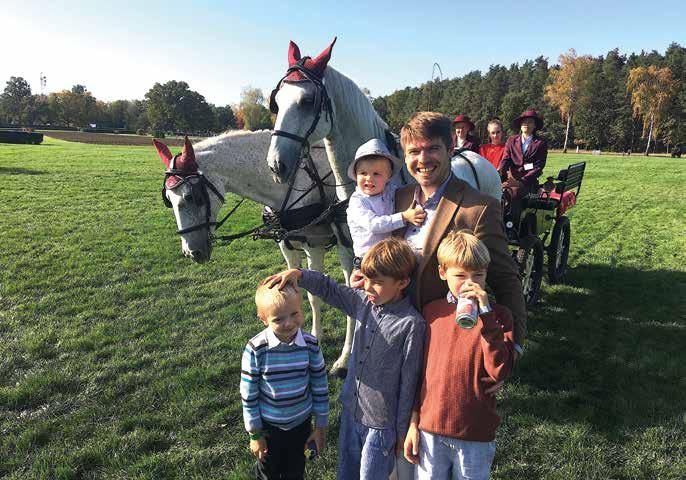
You are showing people that it is a good idea to spend their holidays in Czechia. What do you do in your free time?
I love travelling and sports. And the best free time is to do both activities together. I have three kids, and I love going surfing, skiing, and climbing with them, and recently even ski-touring. Another amazing combination is travelling and culture. With my wife, we love visiting Český Krumlov and its International Music Festival.
A few years ago, you said in an interview that you were “coming in with a clear vision in the marketing of the Czech Republic and the agency’s strategic activities”. Did you fulfil your vision?
I did my best. I worked hard, but, to be honest, it was not an easy time for the tourism industry. Two years of COVID-19, the Russian invasion of Ukraine, and the following energy crises and huge inflation destroyed the stability of the tourism sector. Everything changed. On the other hand, it allowed me to concentrate on digitization. I am proud of kudyznudy.cz, the spa vouchers project, and many other activities that we carried out. When we look at the numbers from the
2nd quarter of 2023, we got back to the 2019 record numbers. That doesn’t mean that the job is done. We need to attract more long-haul direct flights, find a substitute for the Russian tourists in the Czech spa resorts, introduce a sustainable tourism strategy, and work on product quality, as well as a way of explaining how tourism is crucial for the local economy and export.
After almost five years, you are now leaving CzechTourism. What is your next destination?
I’m searching for a new challenge. I am open to any interesting opportunity, even outside the tourism industry. I will continue to teach destination management at the University of Economics, but this is only two hours a week. The good news is that I do not need to hurry, as in the past I have invested in two interesting sports projects in Prague. Beachklub Ladví is the biggest beach volleyball venue in Central Europe. With 18 beach volleyball and 8 tennis courts, a sauna, a yoga room, a restaurant, and a conference hall it is a great venue for company events and off-site meetings. Kayak Beach Bar is a venue floating on river Vltava, near Railway Bridge (Železniční most). A beach volleyball court, kayaks, paddleboards, and a winter sauna and whirlpool with a unique view of Prague Castle and Vyšehrad Castle. To me, Kayak Beach Bar represents one of the coolest places in Prague.
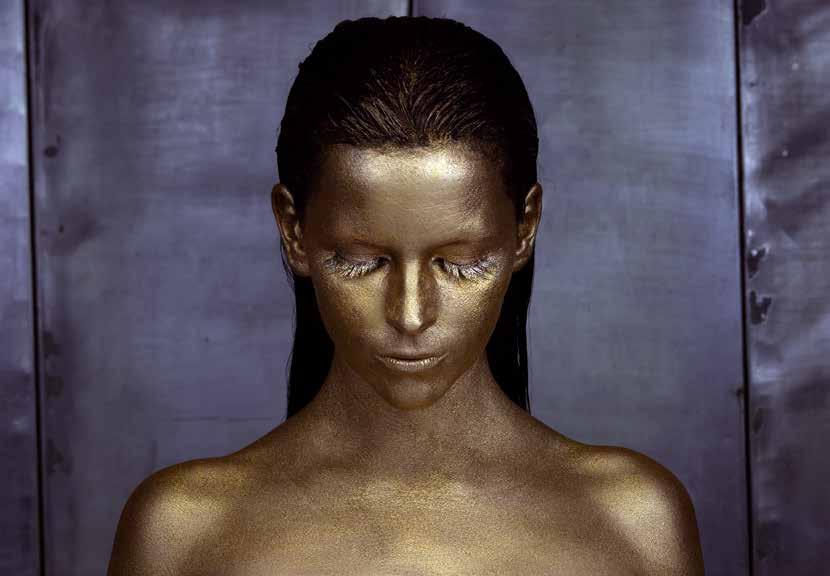
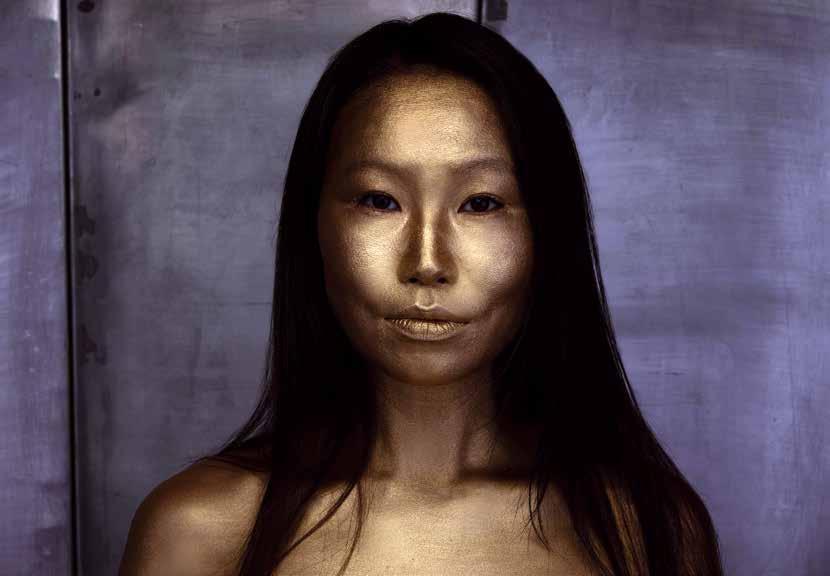
Do you want to see your beauty? Shalev Man is the one you can turn to. A photographer who is able to see you as a golden person when others can’t, and even acknowledges the other side as but a part of the complete picture. Originally from Israel, his first logical step was to establish himself as a photographer in his home country. We talked to Man in Prague, his second home. Why did he fall for Czechia? And how does his creative mind work?
The process of the real beauty coming out
Capturing pretty images in real time requires minimal expertise, but capturing an image with a perceivable meaning is not so easy. Shalev Man is a photographer with many passions and pursuits, in which the leading influence of his work is finding one’s inner beauty, and using his expertise to exhibit that through thoughtprovoking and change-proliferating photographs.
“I emphasize the inner beauty because that’s the most beautiful thing that comes out in the picture,” Shalev Man revealed.
Man exhibited his most recent and prominent “WE ARE ALL GOLD” collection in London on 8th July 2023. The collection’s inspiration came from his time documenting Kabaret Total, a performance group in Israel. While documenting a performer whose role was to play a golden statue in the middle of a shopping mall, Man witnessed a great show of disrespect from the audience and passersby towards the gold-painted man, and it struck a chord with him.
“I felt like he’s a gold person who is not recognized as a gold person. It didn’t feel right,” Man observed. Gold is a pure metal, untarnishable, and valuable – the traits Man found synonymous with human life. This inspired him, and his project then became a series of attempts at portraying the value and goodness in humanity by painting a diverse group of models in gold. The golden makeup used both unified them in their equality and amplified their uniqueness.
“The idea was to connect. When we put the golden
makeup on, something happened to them… It was like metamorphosis. It’s really hard to explain but it was amazing… There are differences between us and it’s cool, like the rainbow. We are all together, like a rainbow with all the colours. Just one colour is nice, but all of us together are amazing,” Man commented, describing the transcendent effects of the project.
While the portrayal of human goodness was achieved, Man realised it was not a realistic representation because all people have flaws; all people have a dark side. To complete his project, he created the inverse – “destroying” the original images – by creating negatives, and then negatives over the negatives. The collection’s lengthy development added a whole new dimension of meaning to the message.
“One side is what we aspire to be: the gold. The other side, it’s not the bad, but it is the other side in all of us, or in humanity. Showing both of them together, one side and the other side, is complete. It’s the Yin and the Yang,” Man said, describing the final result.
Originally from Israel, Man perceives his home country’s success and flourishment amid the various crises as astonishing. However, growing up in a war-torn country also instilled in him a desire to seek out and fight for the freedom of others. Finding a balance between respecting one’s cultural and religious values and defending their human rights within these parameters is a continuous mission for Man. These aspirations are a driving factor
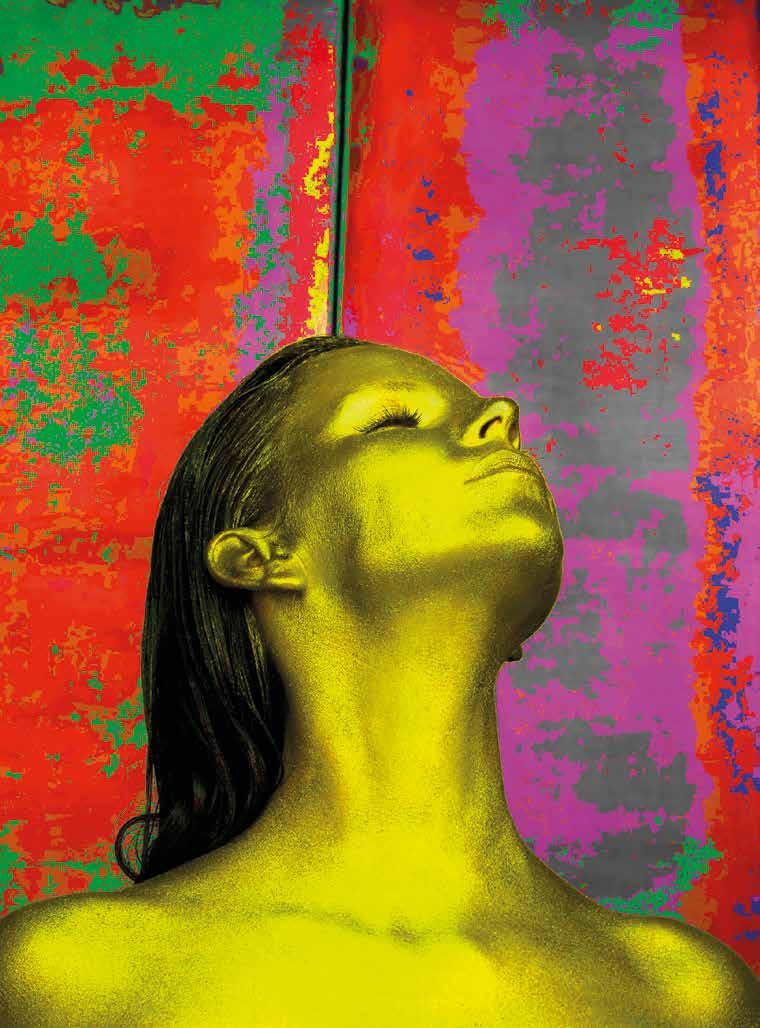
in all his pursuits, both commercial and artistic. There is good and beauty to be found in everyone, and his life experience has motivated him to bring this to light. Man found his passion for photography at age sixteen, and developed his skills through trial and error. Although photography was always a passion, it began as a hobby rather than a career. Man began as an account and project manager in telecommunications. His career progressed quickly in this field, and left him feeling a sense of anxiety at its pace and trajectory.
Man’s passion for photography coincided with a love for cars and motorcycles. With this in mind, he and his wife decided to take a break from the corporate world and spend a year road- quest through India via motorcycle. Their time spent traveling and documenting revealed a whole new world to Man, and unveiled a new career path in photography.
Prague was the next stop on his journey, but not yet a permanent destination. His initial arrival in Prague was discouraging, having faced many cultural challenges and language barriers. Deciding to return to Israel, Man created a business and marketing strategy to build his new career and portfolio as a photographer, still keeping Prague in mind. “It took about five years after establishing myself in Israel as a photographer, where I got to photograph many well-known people, significant events, and do lots of stuff…
I thought it was a good time to try and make the leap again,” Man revealed about his time spent preparing for his return to Prague, which finally took place in 2014. When asked, why Prague? Man simply answered: “the freedom and the openness really attracted me... I think it’s one of the most free countries in the world. It’s live and let live. There is freedom.”
Man will be exhibiting one of his images from the WE ARE ALL GOLD collection on 20th September 2023 for eight days at Zari in London for a content contest. Additionally, Man has a new project in the works inspired by modern technological advancement. Utilizing new technology and AI rather than vilifying it is important to his artistic innovation and intention.
“I am creating a technological tool that helps people to refine their photography in real time, to get a good result that doesn’t miss the moment, and in addition saves time and storage,” Man revealed, alluding to his new project.
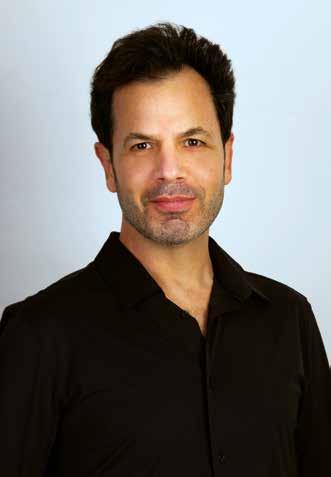
He is a photographer, a businessman, and a human being who feels called upon to use his expertise to bring out one’s inner beauty and fight for the freedom that all humanity is owed.
“I have a tool and I have the ability to show people, ‘yeah, you‘re beautiful, you’re amazing.’”
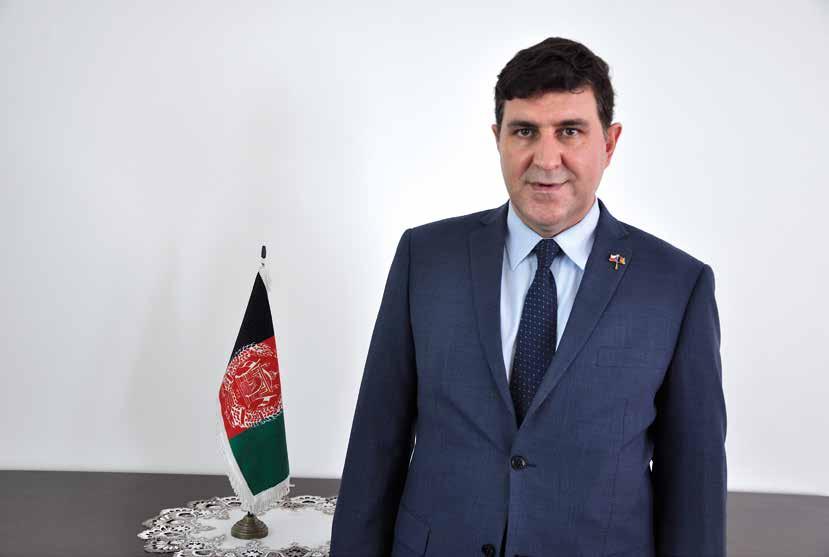
The article explores the significance and impact of language in diplomatic missions. The discussion on language is placed within the broader context of public and cultural diplomacy, emphasizing these aspects‘ crucial role in shaping international relations. I examined the position of Afghanistan in the current global landscape, and the paper aims to underscore the importance of language as a key axis in promoting cultural and diplomatic exchange.
Afghanistan‘s diplomatic strategy has been primarily focused on official diplomacy for over the past 40 years, lacking a comprehensive approach toward public diplomacy. However, contemporary international relations emphasize the importance of general relations, including cultural, educational, and informational aspects, in addition to formal state relations. Although Afghanistan has had some successful experiences with cultural relations in the past and benefited from the international community‘s presence in the last two decades, the country‘s
communication foundations in language, culture, and social conditions remain weak. This highlights the need for a new approach to people-to-people communication, emphasizing language, culture, and social factors to build stronger diplomatic relations between nations. Afghanistan is an ideal country for pursuing public diplomacy due to several reasons. The country‘s language is a crucial feature that facilitates exchanging its history, culture, and social experiences with neighboring nations. Additionally, Afghanistan‘s natural influence on the countries in the region is significant. For example, Amir
Text: Shahzad Aryobee, Ambassador of Afghanistan – Prague, Czech Republic; Photo: Archive H.E. Mr. Shahzad Aryobee, Ambassador of AfghanistanAmanullah Khan, the king of Afghanistan until 1924, welcomed the emir of Bukhara, Gomara, and his family to Kabul, where they lived and were buried. This shared cultural, linguistic, and historical foundation between Afghanistan and present-day Uzbekistan presents an excellent opportunity for public diplomacy between the two nations.
There are several tools available for public diplomacy, such as political discourse, trade, and investment, civil society relations, educational and university programs, language institutions in both countries, media cooperation, partnership, seminars and conferences on cultural commonality, tourism, cultural events, and more. France‘s experience and model in public diplomacy, which is often referred to as cultural diplomacy in scientific terms, is noteworthy. France has successfully enhanced its influence and contribution to other nations through language learning, cultural materials, and educational programs. One of the significant outcomes of this effort was strengthening understanding and harmony between the two nations and expanding relations. The cultural geography of Afghanistan is based on a common language, cultural experiences, and social conditions that could be shared with Muslims in India, in historical Rohilkand, below the Durand Line and neighboring countries. This presents an opportunity to improve general relations among the government processes and establish a mindset for negotiations and official transactions between the related countries. Afghanistan has not been successful in promoting its country‘s goals among its citizens through public diplomacy, which is easier and more necessary than any other diplomatic work. The language similarity and cultural commonality between Afghanistan and Pakistan, and Iran should have been leveraged in such a way that the people of these two countries could have pressured their leaders and officials not to interfere in Afghanistan for the sake of stability, offering guaranteed help and permanent friendship.
When it comes to diplomacy, proficiency in foreign languages among Afghan diplomats can help the country‘s ability to effectively communicate its wishes, experiences, foreign policy, and visions to other nations, diplomatic and host countries. The lack of proficiency in foreign languages among Afghan diplomats has led to defeat and failure in the diplomatic field, as official representatives cannot convey the country situation and suffering of the Afghan people. Understanding other countries‘ social norms, messages, and cultural indicators is critical for Afghan diplomats to comprehend their needs and convey the demands and messages of their people.
The importance of language in diplomacy must be
addressed, as it is the primary means of communication between diplomats. However, there has yet to be a consensus on which language is the best for understanding diplomacy. Different countries and individuals have presented various arguments based on convenience, scientific wealth, the number of speakers, and political, economic, and commercial influence. While English is currently considered the language for communication between diplomats, many countries still prefer to use their national languages in communication with rival diplomats. In addition to spoken language, diplomats must also be skilled in body language, which can convey different messages and have varying interpretations. Successful diplomats must possess the necessary language skills to convey and understand messages, respond appropriately, and analyze and interpret the messages received from other diplomats.
Language can also be used as a form of action in diplomacy, such as issuing warnings, making suggestions, or agreeing to terms. It is not just about what is said but also what is done, and this form of communication can have significant implications for diplomatic relations between countries. A diplomat employs the art of diplomacy to persuade the opposing party to make decisions that align with their country‘s interests while also considering their people and values. The ultimate goal is to reach agreements and understandings that enable the diplomat to return home with successful negotiations.
Conclusion
The article highlights the importance of language and culture in promoting effective diplomacy, especially for countries like Afghanistan. Afghan diplomats‘ lack of proficiency in foreign languages has led to challenges in effectively communicating the country‘s wishes, experiences, and visions to other nations. The article suggests that a new approach towards people-to-people communication emphasizing language, culture, and social factors can foster stronger diplomatic relations between nations. Diplomats must possess the necessary language skills to convey and understand messages, respond appropriately, and analyze and interpret messages received from other diplomats. The article underscores the significance of language as a crucial axis in promoting cultural and diplomatic exchange. Effective diplomacy requires a prosperous diplomat who communicates clearly, eloquently, persuasively, and effectively.
Reference: 1. Patinka, E. (2014). Cultural diplomacy in contemporary international relations: Theory and practice. Faculty of Political Science and International Relations, UMB Banská Bystrica. 2. Cummings, M. C. (2003). Cultural Diplomacy and United States Government: A Survey. Washington: Center for Arts and Culture. 3. Klubbond, N. Cultural diplomacy as „soft power“ and the significance of cultural awareness in the German mission in Afghanistan.
Keywords: Public diplomacy, digital diplomacy, international diplomacy, and Afghanistan.
On
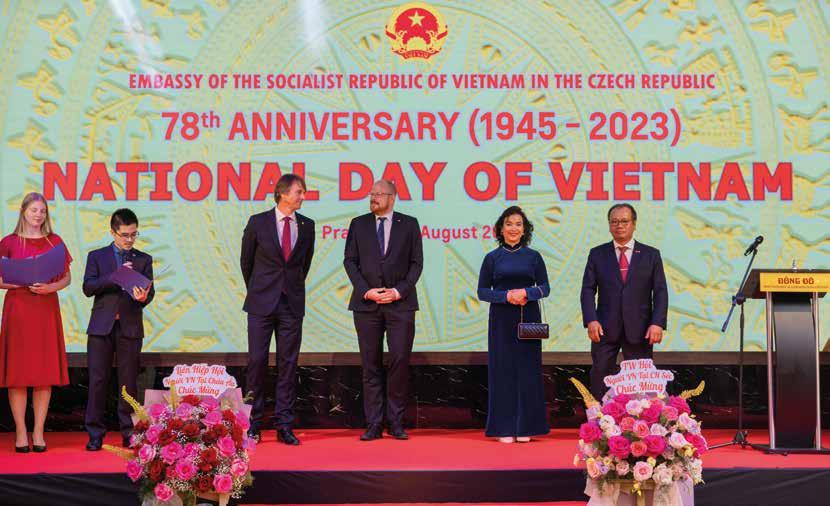
Excellencies, Distinguished guests, Ladies and Gentlemen.
It is my great pleasure and honor to warmly welcome you all here today to celebrate the 78th Anniversary of Vietnam’s Independence Day.
Particularly, I would like to acknowledge the presence of H.E. Mr. Eduard Hulicius, Deputy Minister for Foreign Affairs and of H.E. Mr. Edvard Kožušník, Deputy Minister of Industry and Trade of the Czech Republic, and more than 300 other Excellencies Ambassadors, distinguished guests coming from the Czech
Government and Parliament, from the diplomatic corps and Vietnamese community in the Czech Republic.
Ladies and Gentlemen,
Your presence means a lot to us, and I would like to express my sincere thanks and wish you all good health, happiness and success!
September 2nd, 1945 is an important milestone marking a major turning point in Vietnam‘s history when President Ho Chi Minh, the Great Leader of the Vietnamese people read the Declaration of Independence at Ba Dinh Square, officially proclaiming to the whole world that Vietnam became an
Text: M. Zisso; Photo: Lukáš Bíba the occasion of the 78th Anniversary of the National Day of Vietnam, H.E. Mr. Thai Xuan Dund and Mrs. Nguyen Thi Thien Nga hosted a special reception at Dong Do Restaurant in Sapa (Prague‘s Little Hanoi). Here are the selected extracts of Ambassador´s speeach at the festive event together with some photos illustrating the atmosphere. H.E. Mr. Thai Xuan Dund, Ambassador of Vietnam and his spouse on the stage with the guests of honor: Deputy Minister of Foreign Affairs H.E. Mr. Eduard Hulicius and Deputy Minister of Industry and Trade H.E. Mr. Edvard Kožušník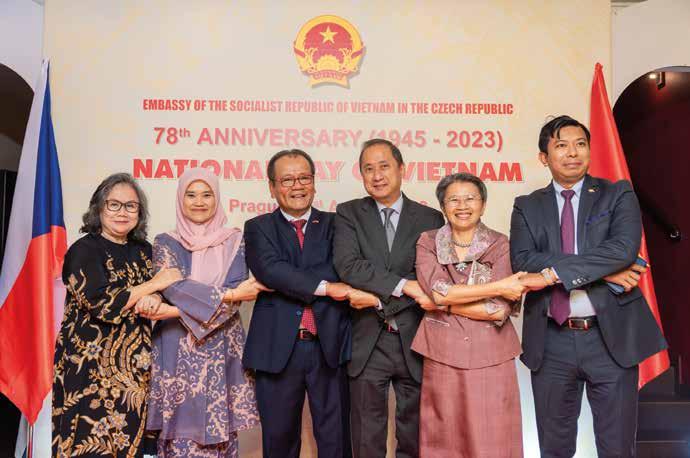
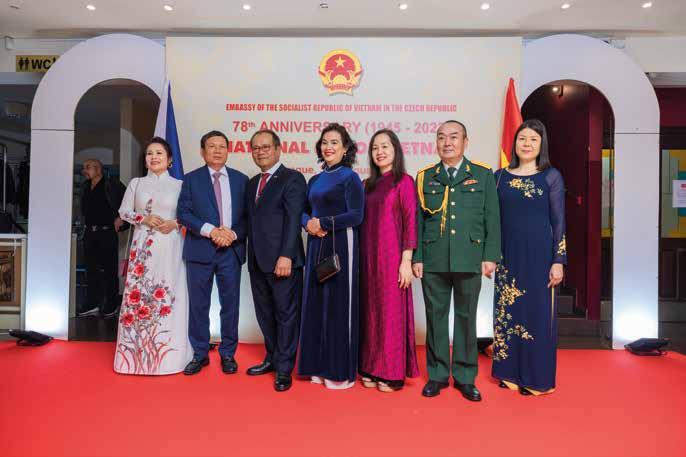
independent and sovereign country, giving birth to the Democratic - Republic of Vietnam, and now the Socialist - Republic of Vietnam.
78 years have passed since that historic moment, from a poor, backward colony, severely damaged by war, with aspiration for independence, peace and development, Vietnam has risen and now becomes one of the fastest growing countries in Asia. Despite of many difficulties caused by the Covid-19 pandemic and external challenging environment, Vietnam has set a goal of greener and more inclusive growth, and will continue to implement the foreign policy of independence, self-reliance, diversification and multilateralization of international relations, being a friend, a reliable partner, and an active and responsible member of the international community.
Since the establishment of diplomatic relations of Vietnam and the Czech Republic in 1950 and throughout our journey for national independence, reunification, development and defense, the Czech Government and people have always rendered to us invaluable support and assistance which we are very grateful and treasure for. On this occasion, I would like to extend my sincerest gratitude and special thanks to the Czech Government and people for their most active cooperation and support over the years.
It is no exaggeration to say that the traditional friendship and multifaceted cooperation between Vietnam and the Czech Republic is better than ever before in all fields, including politics, diplomacy, economy, defense & security, culture, education & training, science & technology, and locality-tolocality cooperation.
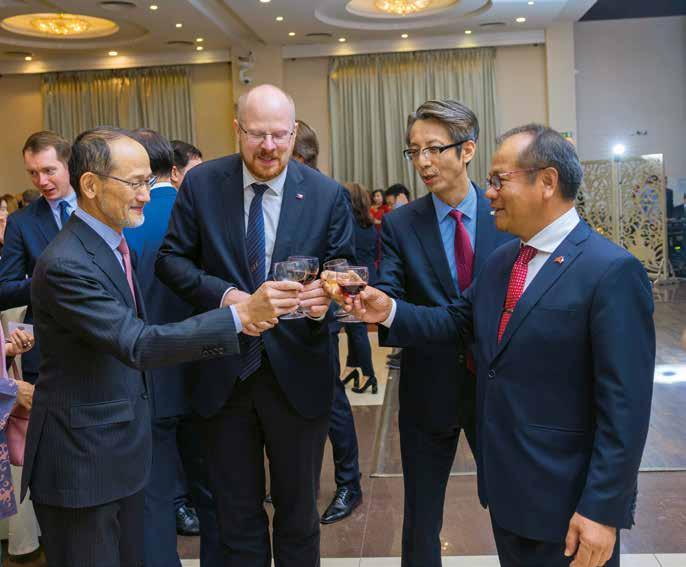
After two years of the COVID-19 pandemic, the foreign political relations have been boosted. The official visit to Vietnam by Czech Prime Minister Petr Fiala in April this year – the first high-level visit between the two countries since 2019 - takes place in the context of the Czech Republic promoting its Indo-Pacific strategy, in which Vietnam is considered as a none-EU important partner. In addition, there are visits to Vietnam by the Czech Defense Minister Jana Černochová in December 2022, the Czech Industry and Trade Minister Jozef Síkela in February 2023 and the official visit to the Czech Republic by Vietnam Foreign Minister Bui Thanh Son in June 2023.
In the field of trade, since the EVFTA came into effect in August 2020, the bilateral trade turnover between the two countries has grown significantly, increasing at a double-digit rate in the last three years (2020 –2022), reaching $2.34 billion in 2022. Both sides are actively working together to further improve the effectiveness of the mechanism of the JointGovernmental Committee for economic cooperation,
and encouraging Czech businesses to invest in Vietnam, especially in areas where the Czech Republic has expertise, such as automotive manufacturing, digital transformation, renewable energy, environment, and infrastructure. In particular, we are looking forward to the production of SKODA automobiles in Vietnam as the Czech automaker SKODA has established its manufacturing plant in North-Eastern province of Quang Ninh, in partnership with Vietnamese automaker THANH CONG since February this year.
Talking about the relationship between Vietnam and the Czech Republic, it would be remiss not to mention the presence of the Vietnamese community of nearly 100,000 Vietnamese who are living and working in this beautiful country and making active contributions to the economic, cultural and social life of the Czech Republic, as well as the good traditional friendship between the two countries. The Czech Republic is the first country to recognize the Vietnamese as the 14th ethnic minority of the Czech Republic. And this year marks ten years of the said recognition. This is a vivid testament to the very special relationship between our two countries. Appreciating the traditional, long-standing and close friendship between Vietnam and the Czech Republic,
being well aware of the advantages and potentials of each country that can complement each other, the Government, people and businesses of the two countries are making efforts to strengthen and improve cooperation efficiency. I strongly believe that with such a positive momentum, the traditional friendship and multifaceted cooperation between our two countries will develop to a new height in the years to come.
May I once again wish you all good health, happiness and success!
Thank you for your attention!
In a joyful atmosphere of celebrating the 78th anniversary of Viet Nam National Day, may I propose a toast:
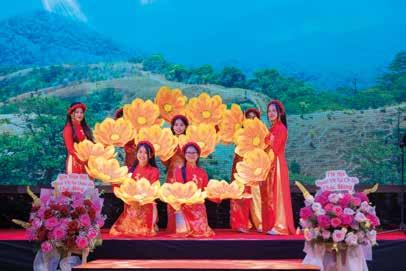
To forever flourishing traditional friendship and cooperation between Viet Nam and the Czech Republic!
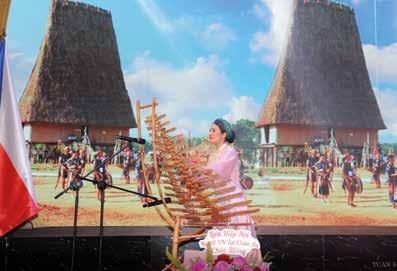
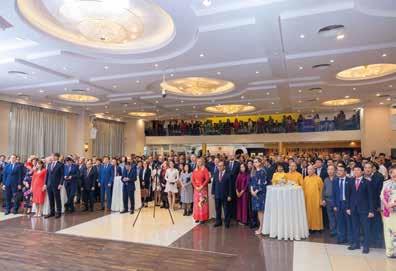
To the people of the Czech Republic and Vietnam! Cheers!
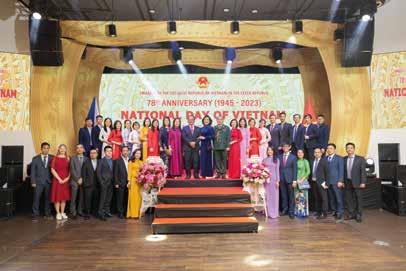
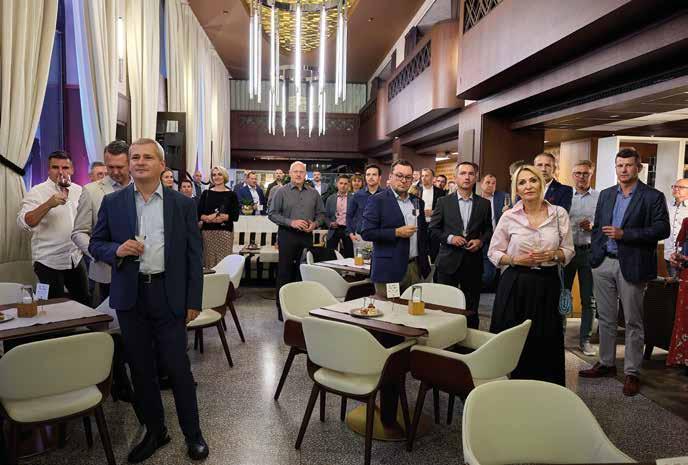
The international professional conference “Leading Minds Forum 2023” was held in Ostrava, on what further development of the European and Czech energy industry can be expected. The annual event was organised by the consulting company DDeM. The key question discussed was “Energy market reform - necessity or populism?” focusing on the future of the European and Czech energy industry, namely on the regulation of the energy market and related upcoming legislation, sustainability and strategic management of
power resources, as well as conditions for the operation of energy infrastructure and measures related to greater customer protection or support of the investment environment.
It was also emphasised that in addition to the ongoing energy prices policy, the current government must also deal with a medium-term prospect for the domestic energy industry and related adjustments to the investment environment.
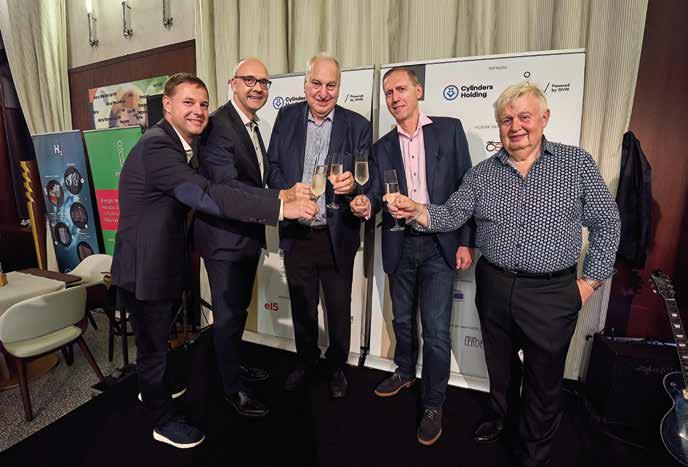
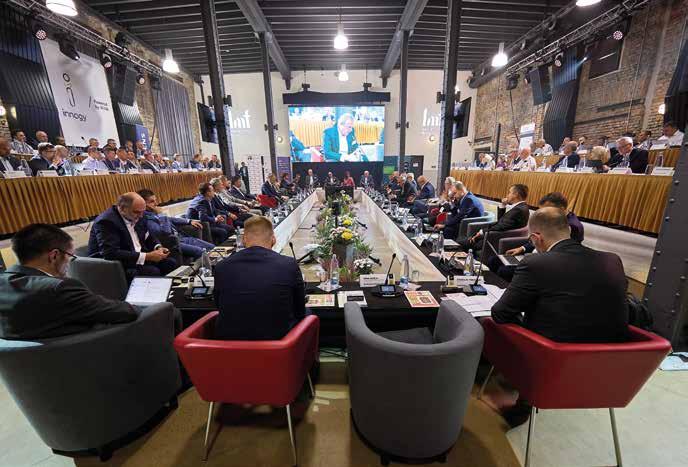
Tomáš Pojar, National Security Advisor of the Office of the Government of the Czech Republic, spoke about new challenges in the field of strategic energy infrastructure in connection with the ongoing war conflict in Ukraine. Pavel Cyrani, Member of the Board of Directors of CEZ, focused on the development of electricity and natural gas prices in the near future. He also mentioned the negotiation of long-term LNG contracts, as well as negotiations on access to LNG terminals in Germany and Poland. Tomáš Varcop, Chairman of the Board of Directors and CEO of Innogy Czech Republic, evaluated Innogy‘s activities after the stoppage of Russian gas supplies to the Czech Republic and new products that the company has offered to their customers.
Petr Třešňák, Deputy Minister at the Ministry of Industry and Trade, presented his views on the reform of the energy market functioning with regard to changes in the National Energy and Climate Plan and in the updated State Energy Policy. René Neděla, Deputy Chief Director of the Energy and Nuclear Resources Section, Ministry of Industry and Trade, presented often intricate negotiations with the European Commission authorities as well as the expected development of the gradual amendment of the Energy Act. Jiří Feist, a Member of the Board of Directors of EP POWER, commented on the company‘s experience with operating nuclear power plants in Slovakia and also summarized the investment potential offered in the Czech energy sector.
Stanislav Trávníček, Chairman of the Energy Regulatory Office Council, mentioned the expected price development in the area of distribution fees, reserved power input, or system services in the horizon of the next few years. Jan Dienstl, a Member of the Supervisory Boards of Sev.en Česká energie, dedicated his contribution to the continued operation of coal-fired power plants and challenges in the field of pumped-storage power plants or small modular reactors. Michal Macenauer, Strategy Director of EGÚ Brno, outlined the share of electricity production from natural gas in years to come and the possibility of replacing natural gas with hydrogen or other green gas in domestic gas consumption.
In addition to members of the state and public administration, representatives of more than 40 industrial and energy companies participated in the debate on current and future necessary capacities, upcoming measures, and new business opportunities. Cylinders Holding and Innogy Česká republika became patrons of the event that was held under the auspices of the Ministry of Industry and Trade, the Energy Regulatory Office, Evžen Tošenovský, member of the European Parliament, and the Moravian-Silesian Region. The main partners are ČEPS, ČEZ, EP Holding groups, and European Conservatives and Reformists. Among partners, there are ANACOT CAPITAL, RWE Gas Storage CZ, ŠKO-ENERGO, Siemens, and UCED group.
For further information about the Leading Minds Forum platform go to www.lmf.cz.
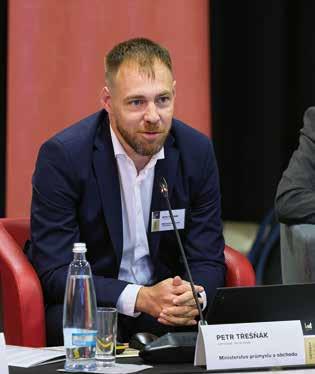
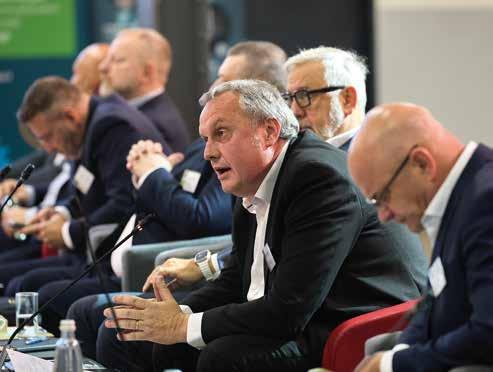
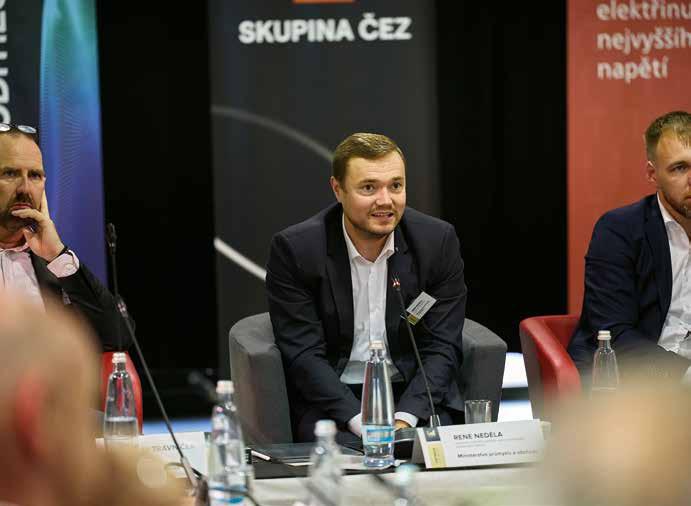
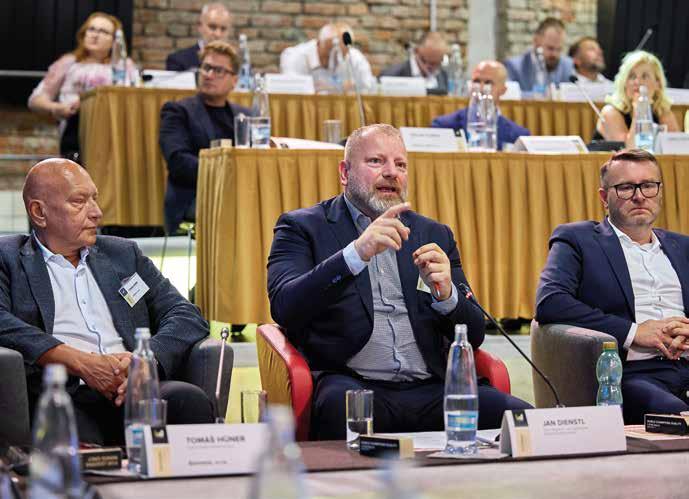
Krkonoše - the most visited mountains in the Czech Republic. Neeco Group – a global company operating in over 160 countries worldwide, with a Czech owner who loves sports and boutique hotels. Soon, the result of this combination will be the area’s largest resort. We talked about the project directly with David Pátek, the founder and CEO of the Group, and he explained: “We have just finished the first stage of reconstruction of Aurum Resort in Krkonoše, and with another stage already in full progress, we are creating a one-of-a-kind resort spreading from Černý Důl all the way to the mountaintops represented by Pražská Bouda.” Do you want to know more? We did, and it’s our pleasure to share the news with you.
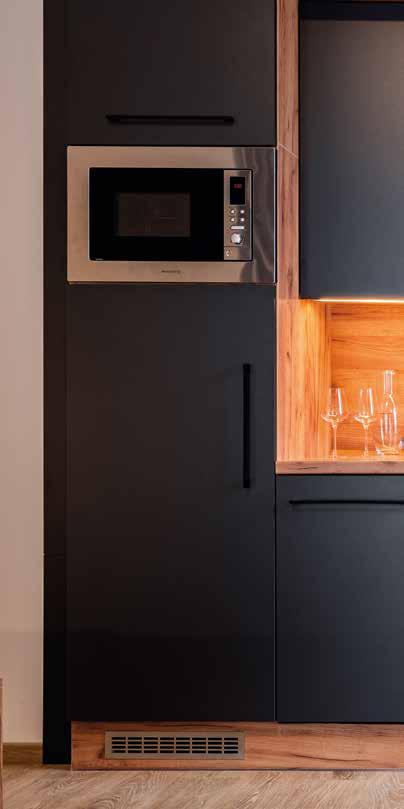
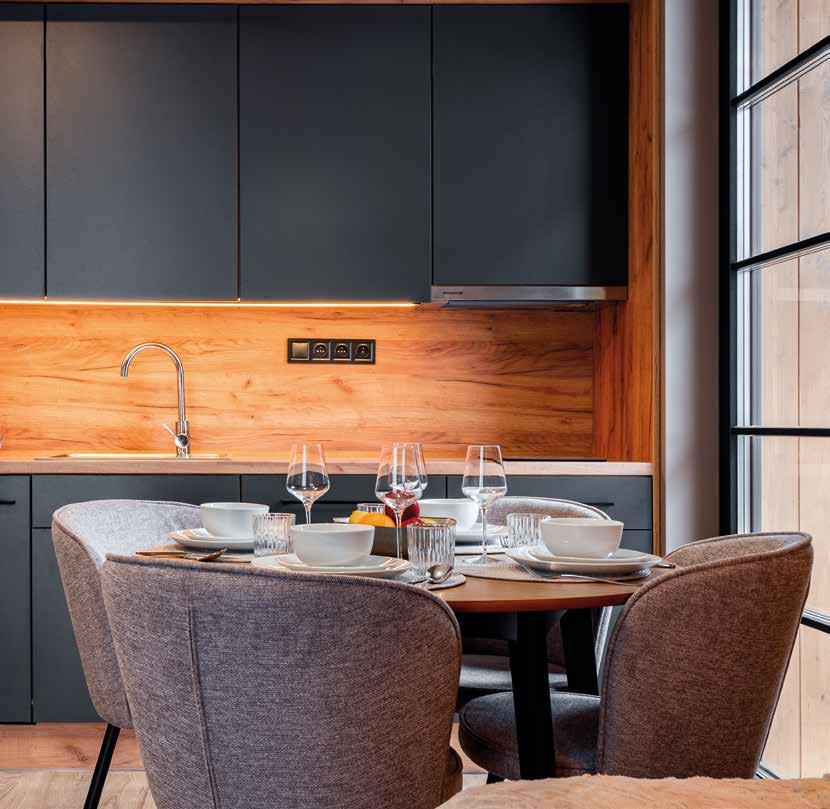 INTERVIEW WITH DAVID PÁTEK, FOUNDER AND CEO OF NEECO GROUP
INTERVIEW WITH DAVID PÁTEK, FOUNDER AND CEO OF NEECO GROUP
David, you founded Neeco 15 years ago in Prague as an IT company. Where did hospitality come from?
Over the last decade, Neeco has entered into multiple industries, and today the two key focus areas of Neeco Group remain IT and the rapidly growing hospitality market. We find a lot of similarities between both lines of our activities. First of all, both the technology and hospitality markets are very dynamic. The hospitality business in particular requires a lot of attention and innovation efforts if we want to stay on top – not just today, but also tomorrow. Both businesses require solid foundations built on strong procedural alignment, well-established processes, and clearly defined work and communication flows. This is the critical element that is possibly not directly visible, however, it affects the final outcomes of our work. Another similarity may be that both are significantly dependent on the digital environment, with systems that help enforce efficiency, precision, and the automation of some of the important business functions.
What exactly is hospitality investment, development, and management about?
Basically, we are developers of our own vacation properties, either by acquisition and reconstruction or by building fresh new projects on a green field. Vacation properties are indeed being located at prime vacation destinations, such as mountains or beach locations. After the buildout, our team manages the operations of such resorts. That indicates that we are not just a developer who builds and walks away with profits in hands after the sale or rent, but we instead build the properties in a way so that we can successfully and happily operate the resort in the future. This is a very important part of our hospitality investment and management business.
We were actually considering the investment into the Krkonoše region for a couple of years, and when the offer to acquire the original Hotel Aurum came, we found it to be a perfect match to our expectations. The hotel is located in the beautiful small mountain town of Černý Důl, which lies in the picturesque part of the Eastern Krkonoše. We saw a great amount of development opportunities, which is common to all activities of Neeco Group – having a huge amount of headroom for expansion.
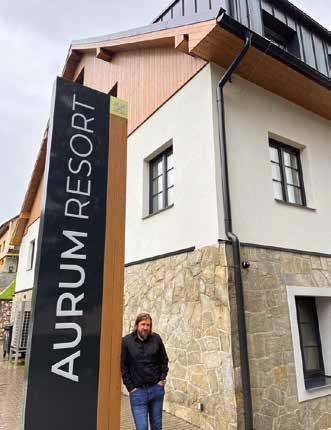
The first acquisition of Hotel Aurum was done back in 2019. In a relatively short time, we projected an expanded future resort on paper, and added other properties and land to create a solid foundation for a future systematic and consistent resort development. That includes nearly one million square meters of land in Čistá, where originally the golf course was planned. Now, with the necessary space acquired, we are building a resort, focused on a holistic visitor experience under the baton of the Aurum Resort brand.
We have just finished the first stage of the reconstruction of Aurum Resort. With another stage already in full progress, we are creating a one-of-a-kind resort, spreading from Černý Důl all the way to the mountaintops represented by Pražská Bouda. The actual stage includes the buildout of the main building, featuring a restaurant, kid and teenage play zones, a spa world, large fitness and wellness facilities, outdoor spaces, and a large indoor multifunctional hall. Aurum Resort is oriented towards being a well-being holiday experience, targeting not only individuals but also sports groups to conduct their training sessions there. This project will be completed in the summer of 2024. Neeco Group came with vast experience in collaboration with large, enterprise, multinational customers. With that, the way we work internally and with external partners, how we communicate, and how the organization is set up internally, we are incredibly different from anything else you can see in Krkonoše.
Other businesses in Krkonoše are either smaller organizations with different aims and targets (where we typically find great collaboration opportunities), or bigger firms for which the work in Krkonoše is solely and entirely financially motivated. I am absolutely confident that our team, coming with such experience, motivation, and attitude here into Krkonoše, can make a huge difference. Aurum Resort is a long-term commitment for us, and we take the environment, nature, and society here around us seriously. In those aspects, we are very unique. There are probably no other strong business groups who are so focused on a long-term development plan in Krkonoše.
You
Yes, this is the direction we have decided to take from the very beginning, as we feel there is a lack of similar offerings in the Czech mountains. Today, our guests want to receive a real, holistic, well-being-oriented experience. The main
building itself offers a lot of fun, and together with the mountains around, and planned outdoor fitness features, I can say our offer is really unique. This is also our competitive advantage for the future, and the way to keep the resort full during both peak and off-season periods. Furthermore, we are already partnering with a lot of sports organizations to create a place for retreats, training camps, and sports events and contests.
It seems like an ambitious plan, indeed. What about your already completed developments –how successful has Neeco been?
We believe that the best way to measure success is via customer satisfaction rating. All of our developments have above 9.5 ratings at Booking.com and 4.9 on Google, which I think speaks for itself. On top of that, our resorts hold some interesting awards, such as the best 5-star resort in Bali awarded to Neano Escape just one year after its opening. Speaking about Neano Escape, the average occupancy rates during the last 12 months have been 89%, which is quite an achievement.
Is there a way for individual investors to participate in the success of your hospitality business venture?
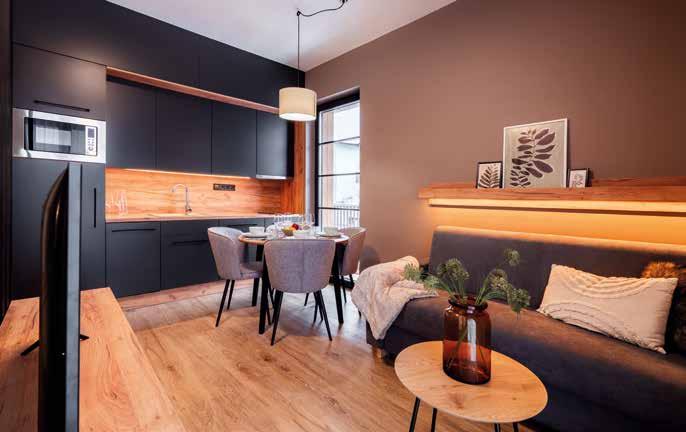
In every location, we build apartments or villas designed for investors interested in participating in future resort operations. By being a partner, you get a stable return on your investment, but also an opportunity to spend time in your vacation property, as well as to enjoy other resorts we manage. So yes, individual investors are welcome to participate in our Krkonoše Aurum Resort too. We still have a couple of apartments available.
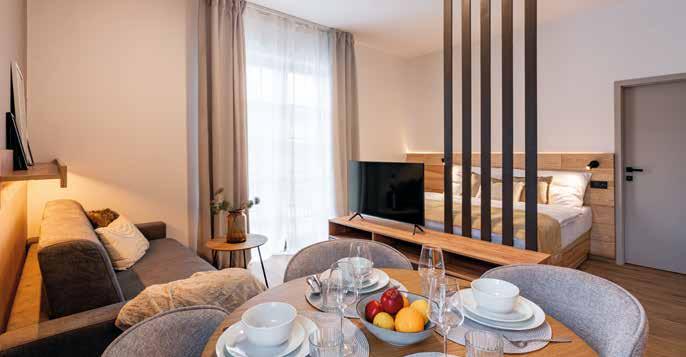
The great benefit for our investment partners is that we not only build but also manage the resorts – so, for investors, this is an absolutely hassle-free investment, where we take care of all issues related to marketing, operations, accounting, and reporting.
By the way, around half of our current guests are foreigners, so the whole resort is built with our international clientele in mind.
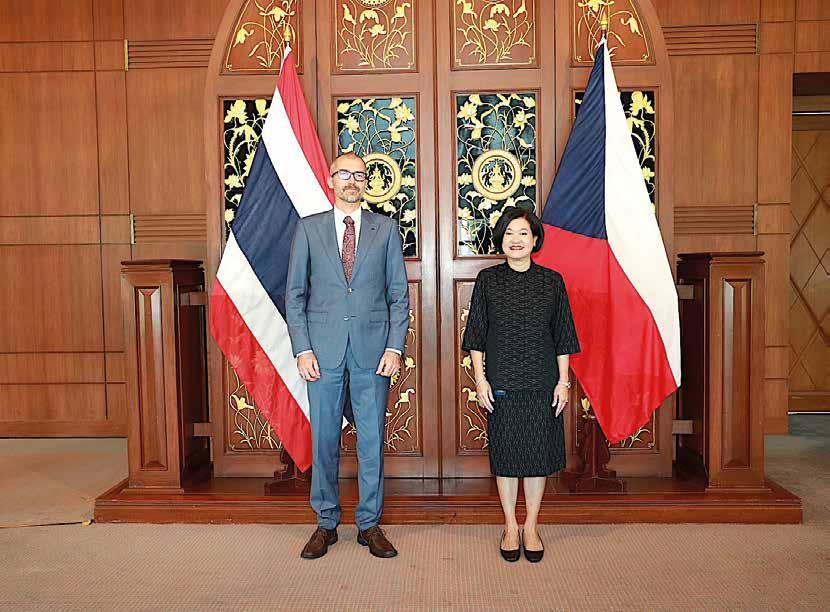
Text: Mr. Kraichok Arunpairojkul, Minister Counselor, Thailand International Cooperation Agency;
Edit: Martina Hošková; Photo: Archive
Established under the Ministry of Foreign Affairs in 2004, the Thailand International Cooperation Agency (TICA) actively promotes the country’s development diplomacy. In the post-COVID-19 context, TICA focuses on building resilience to boost human security in food, health, job, and energy & environment. TICA’s track record speaks for itself. Many of its development projects were recognized as the Sustainable Development Goals’ best practices. Currently, TICA and the Czech Development Agency are exploring new possible avenues for development cooperation.
Mrs. Ureerat Chareontoh, Director-General of Thailand International Cooperation Agency (TICA) and H.E. Mr. Pavel Pitel, Ambassador of the Czech Republic to ThailandThe achievement of the Sustainable Development Goals (SDGs) has been put at serious risk by multiple and overlapping crises. Amid daunting, multidimensional development challenges that call for collective leadership and urgent actions, we have seen emerging donors playing more prominent roles in international development cooperation. Among emerging Asian providers of development cooperation is Thailand, which offers its unique approach to achieving sustainable development – Sufficiency Economy Philosophy for Sustainable Development Goals, or SEP for SDGs.
Established under the Ministry of Foreign Affairs in 2004, the Thailand International Cooperation Agency (TICA) actively promotes the country’s development diplomacy, which is firmly grounded in the “5S” Foreign Affairs Masterplan. “Sustainability and Status are two key aspects of the 5S Strategy. It seeks to enhance Thailand’s role as an international partner for sustainable development, while promoting the country’s status in the international community through its soft power, including development cooperation,” said Mrs. Ureerat Chareontoh, Director-General of TICA, who was Ambassador of Thailand to the Czech Republic from 2018 to 2021. To contribute to global progress towards the SDGs, TICA’s work is guided by SEP, a homegrown
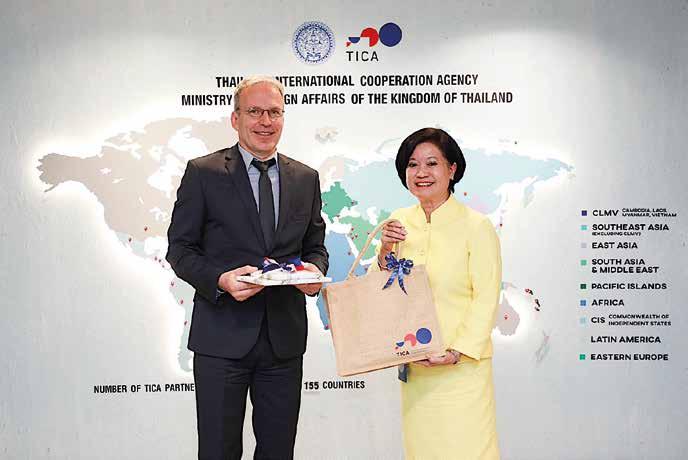
development approach that was conceived by His Majesty King Bhumibol Adulyadej The Great, and integrated into the 20-Year National Strategy. Mrs. Ureerat said, “SEP is our pathway to achieve more balanced and inclusive growth. So, SEP for SDGs is our unique approach, which we share with fellow developing countries to advance sustainable development. It is complemented by the Bio-CircularGreen (BCG) Economy Model to support the global transition towards a cleaner and greener world.”
In the post-COVID-19 context, TICA focuses on building resilience to boost human security in food, health, job, and energy & environment. It emphasizes human resource development, institutional capacity building, and local ownership in order to ensure sustainability. Its technical assistance is provided mainly through scholarship and training programs, development projects, and the dispatch of experts and volunteers. The prioritized areas include agriculture, public health, climate change & environmental protection, renewable energy, community-based tourism, and skills development.
TICA’s track record speaks for itself. Many of its development projects were recognized as SDG best practices by the United Nations Office for South-South Cooperation (UNOSSC), and by the United
Nations Department of Economic and Social Affairs (UN DESA). These include, among others, the ThailandGermany-Mongolia Trilateral Project on Sustainable Tourism Development, based on SEP in Mongolia; the Friends from Thailand (FFT) Volunteer Program; and Sustainable Community Development, based on the SEP Application for the One Gewog One Product (OGOP) Model Project in Bhutan.
In September 2022, Thailand, UNOSSC, and the United Nations Economic and Social Commission for Asia and the Pacific (ESCAP) co-hosted the 11th Global SouthSouth Development Expo (GSSD Expo) in Bangkok. This Expo showcased best practices in development cooperation, and provided a timely forum to discuss strategies and solutions to development challenges in the post-COVID-19 world. Mrs. Ureerat noted, “Our event had a good turnout of around 1,200 participants. But, more importantly, it was the spirit of solidarity and positive impacts on global development that the Global South has shown to the world through SouthSouth and Triangular cooperation.”
SDG 17 underscores the importance of effective partnerships in order to make progress towards the shared development vision. In addition to increased multi-stakeholder engagement, notably with the Thai
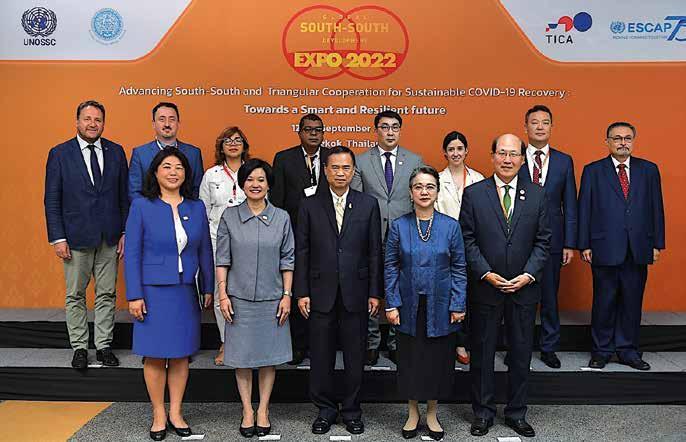
private sector and academia, Thailand continues to forge new partnerships beyond its borders. Currently, TICA and the Czech Development Agency (CzDA) are exploring possible avenues for development cooperation in third partner countries, such as short training in smart farming, agricultural cooperative management, post-harvest management, agri-food processing, and public health for the Mekong subregion or ASEAN member countries. In August of this year, Mahidol University and Charles University – two prominent universities in the two respective countries – jointly conducted a Universal Treatment Curriculum for Addiction Professionals in Thailand’s Chiang Mai province for Cambodia, Lao PDR, Myanmar, and Bhutan. This collaboration was jointly initiated and supported by TICA and relevant agencies of the Czech Republic.
As Mrs. Ureerat has stressed, “The SDGs can only be achieved by strong global partnerships and cooperation. As a responsible member of the international community, Thailand will leverage our expertise, experiences, and network of partners to help advance the global development agenda. Next year will mark the 50th milestone in our diplomatic relations. I very much look forward to seeing TICA and the Czech Development Agency work together to help advance the SDGs. This will open a new chapter in Thai-Czech relations and cooperation in the years to come.”
